what got you here won’t get you there Matt Stratton DevOpsDays Medellín 2020
Slide 1

Slide 2

who am i? @mattstratton
Slide 3

why are we here? @mattstratton
Slide 4

Why are we here Kubernetes Containers CI/CD AI/ML Cloud Native Microservices Cloud Big Data Serverless @mattstratton
Slide 5

Why are we here @mattstratton
Slide 6

Why are we here @mattstratton
Slide 7

Why are we here @mattstratton
Slide 8

Why are we here United States Postal Service Strategic Goals Goal 1. Deliver world-class services and customer experiences. Goal 2. Equip, connect, engage, and empower employees to serve our customers. Goal 3. Innovate faster to deliver value. Goal 4. Invest in future platforms. Goal 5. Pursue legislative and regulatory changes necessary to achieve financial sustainability @mattstratton
Slide 9

Why are we here Mission Statement: To be the best financial services company in the world. Vision Statement: Aspire to be the best; execute superbly; build a great team and a winning culture @mattstratton
Slide 10

Why are we here We promise our customers stellar service, our suppliers a valuable partner, our investors the prospects of sustained profitable growth, and our employees the allure of huge impact @mattstratton
Slide 11
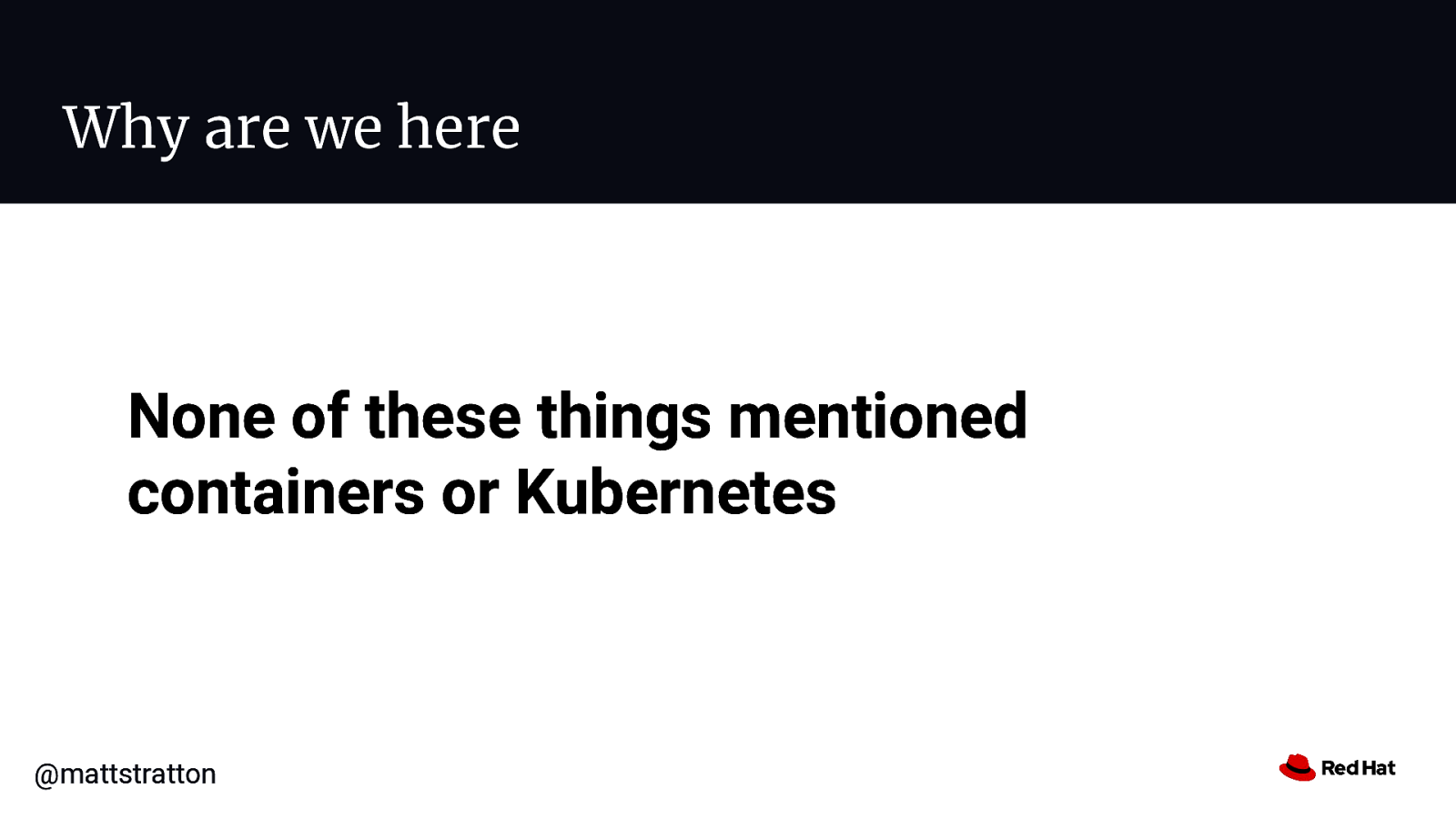
Why are we here None of these things mentioned containers or Kubernetes @mattstratton
Slide 12
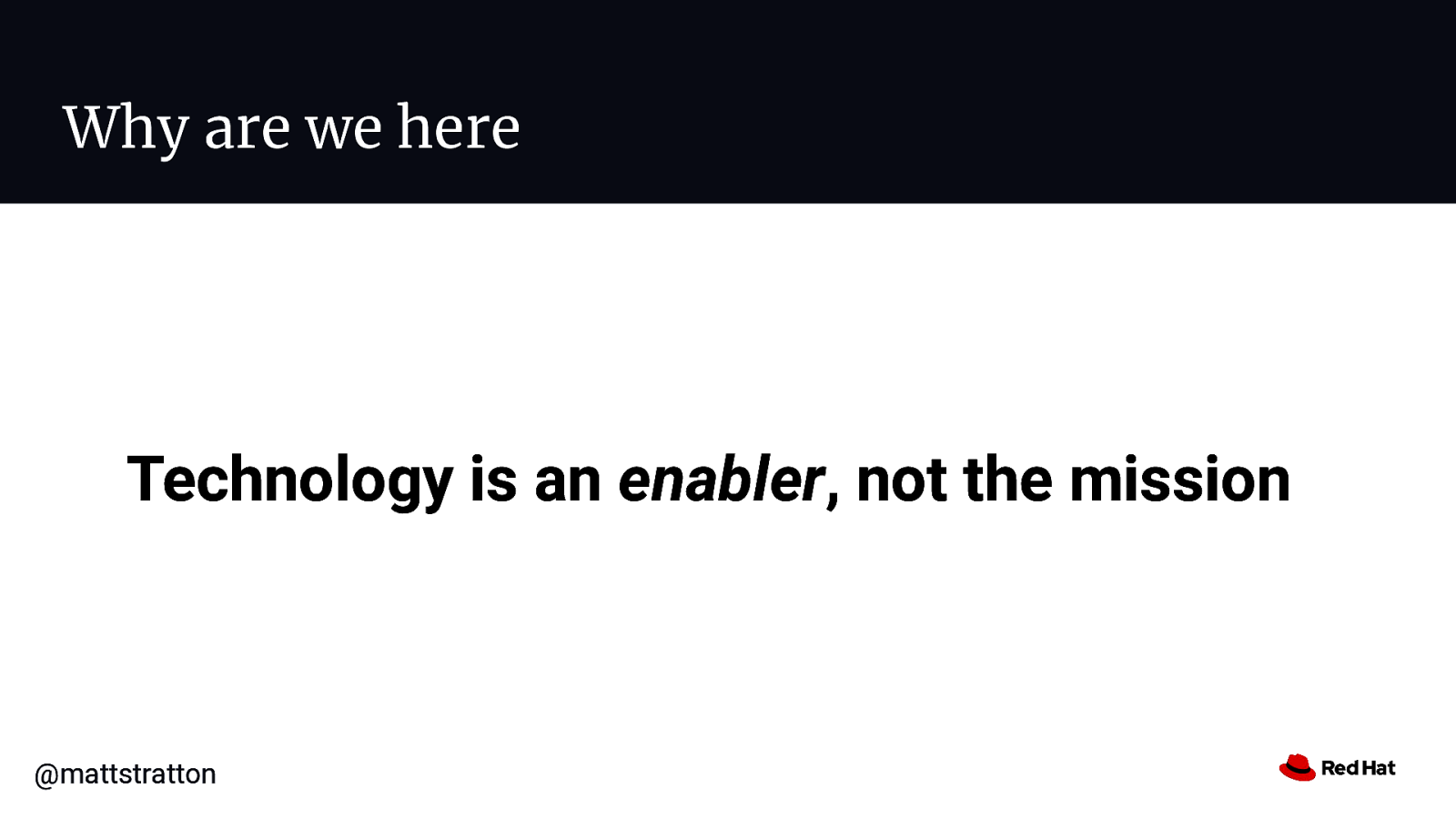
Why are we here Technology is an enabler, not the mission @mattstratton
Slide 13
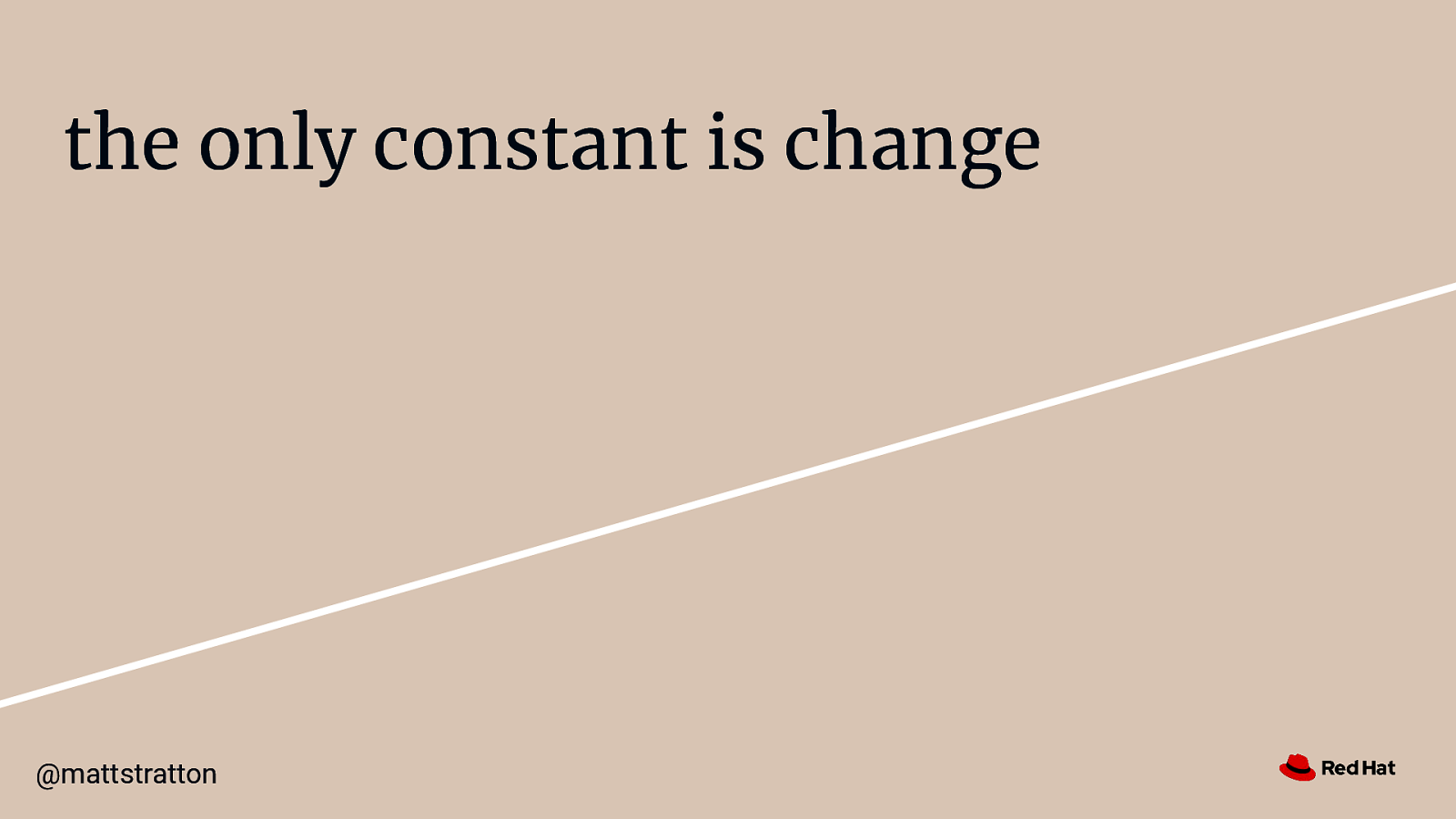
the only constant is change @mattstratton
Slide 14
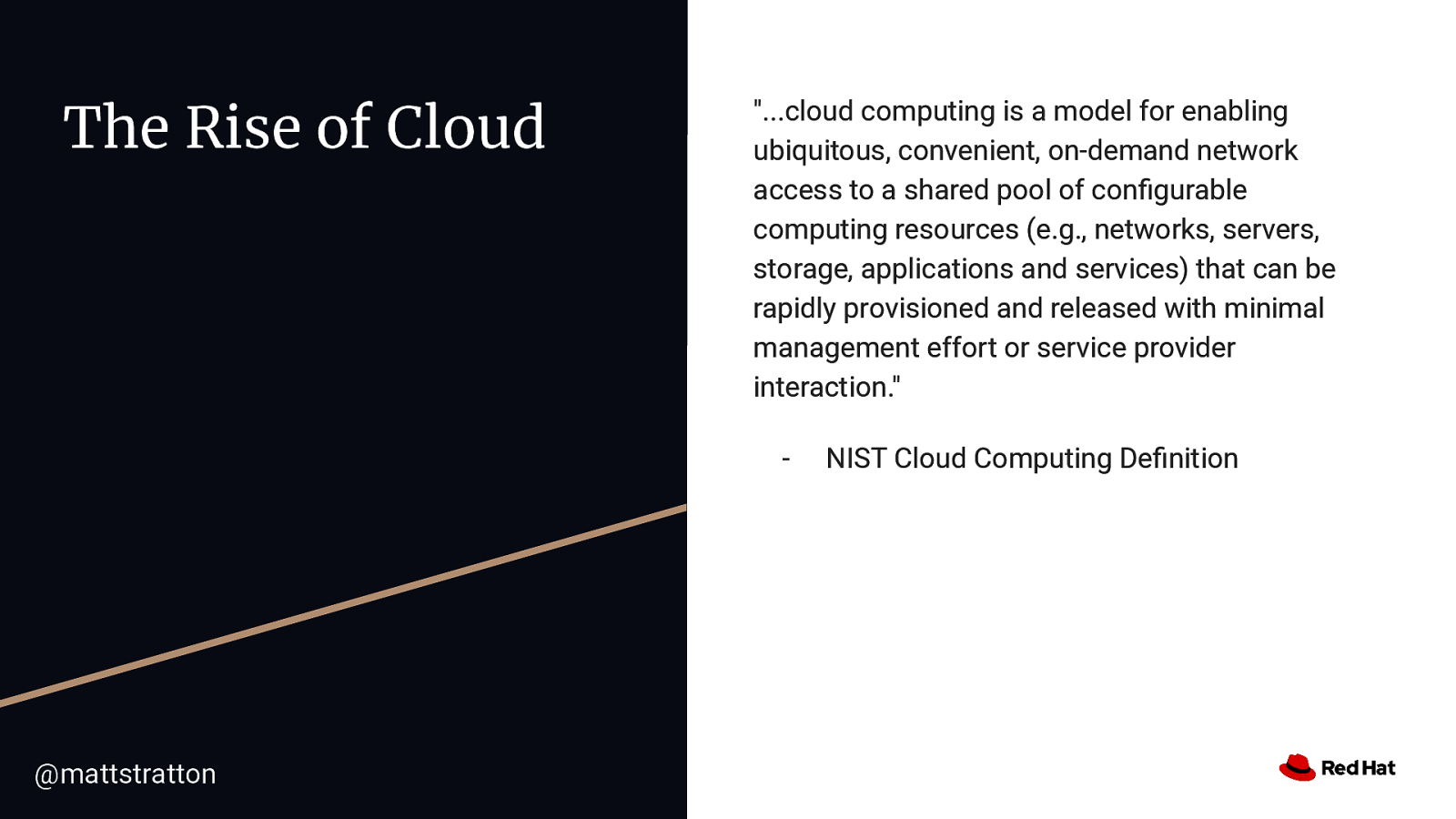
The Rise of Cloud “…cloud computing is a model for enabling ubiquitous, convenient, on-demand network access to a shared pool of configurable computing resources (e.g., networks, servers, storage, applications and services) that can be rapidly provisioned and released with minimal management effort or service provider interaction.” - @mattstratton NIST Cloud Computing Definition
Slide 15

The Rise of Cloud “…cloud computing is a model for enabling ubiquitous, convenient, on-demand network access to a shared pool of configurable computing resources (e.g., networks, servers, storage, applications and services) that can be rapidly provisioned and released with minimal management effort or service provider interaction.” - @mattstratton NIST Cloud Computing Definition
Slide 16
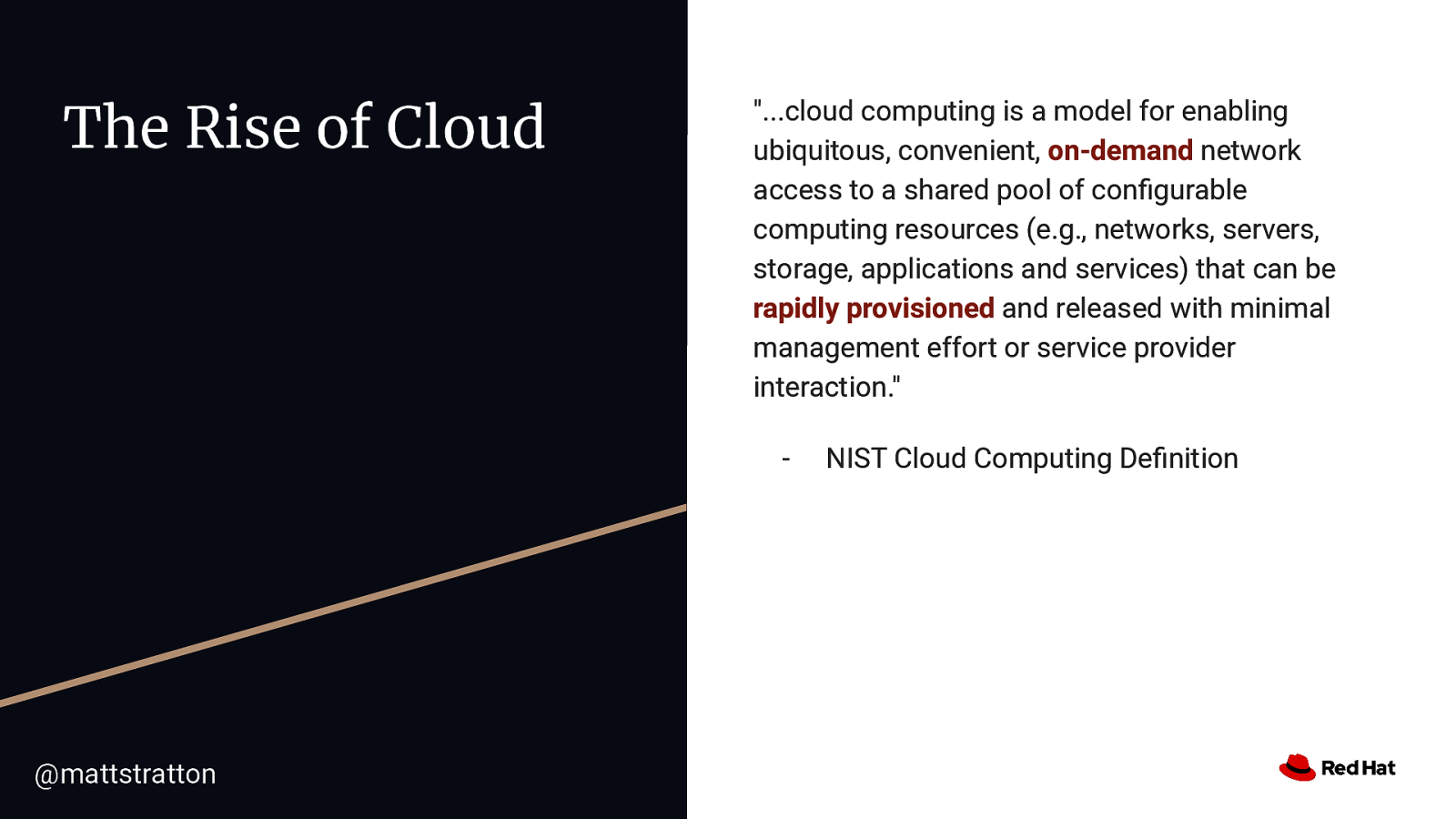
The Rise of Cloud “…cloud computing is a model for enabling ubiquitous, convenient, on-demand network access to a shared pool of configurable computing resources (e.g., networks, servers, storage, applications and services) that can be rapidly provisioned and released with minimal management effort or service provider interaction.” - @mattstratton NIST Cloud Computing Definition
Slide 17

Jevon’s Paradox As a resource becomes more efficient (easier) to consume, consumption of the resource rises. @mattstratton
Slide 18

The Rise of Cloud Consumption of compute is at an unprecedented level. @mattstratton
Slide 19
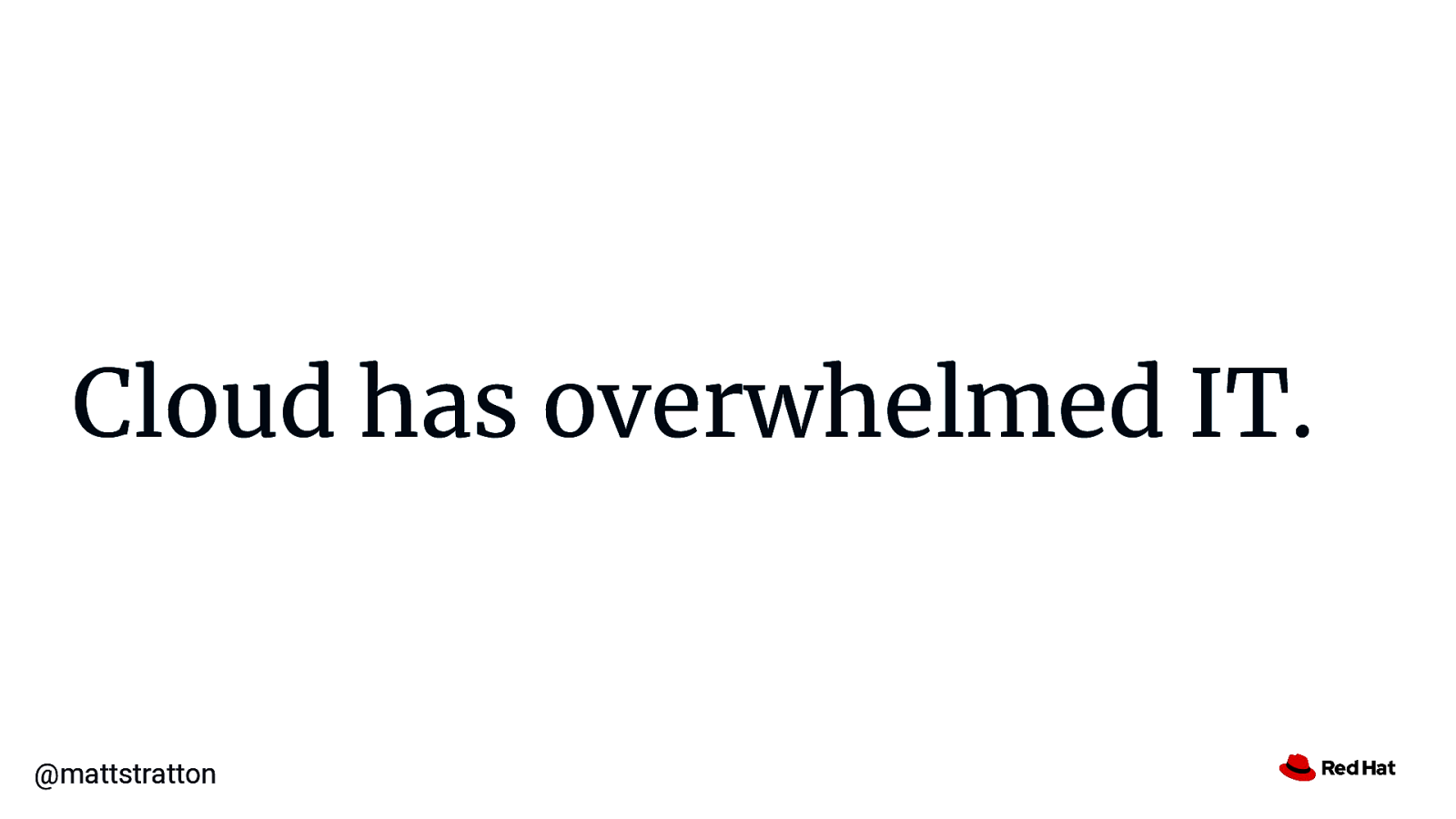
Cloud has overwhelmed IT. @mattstratton
Slide 20
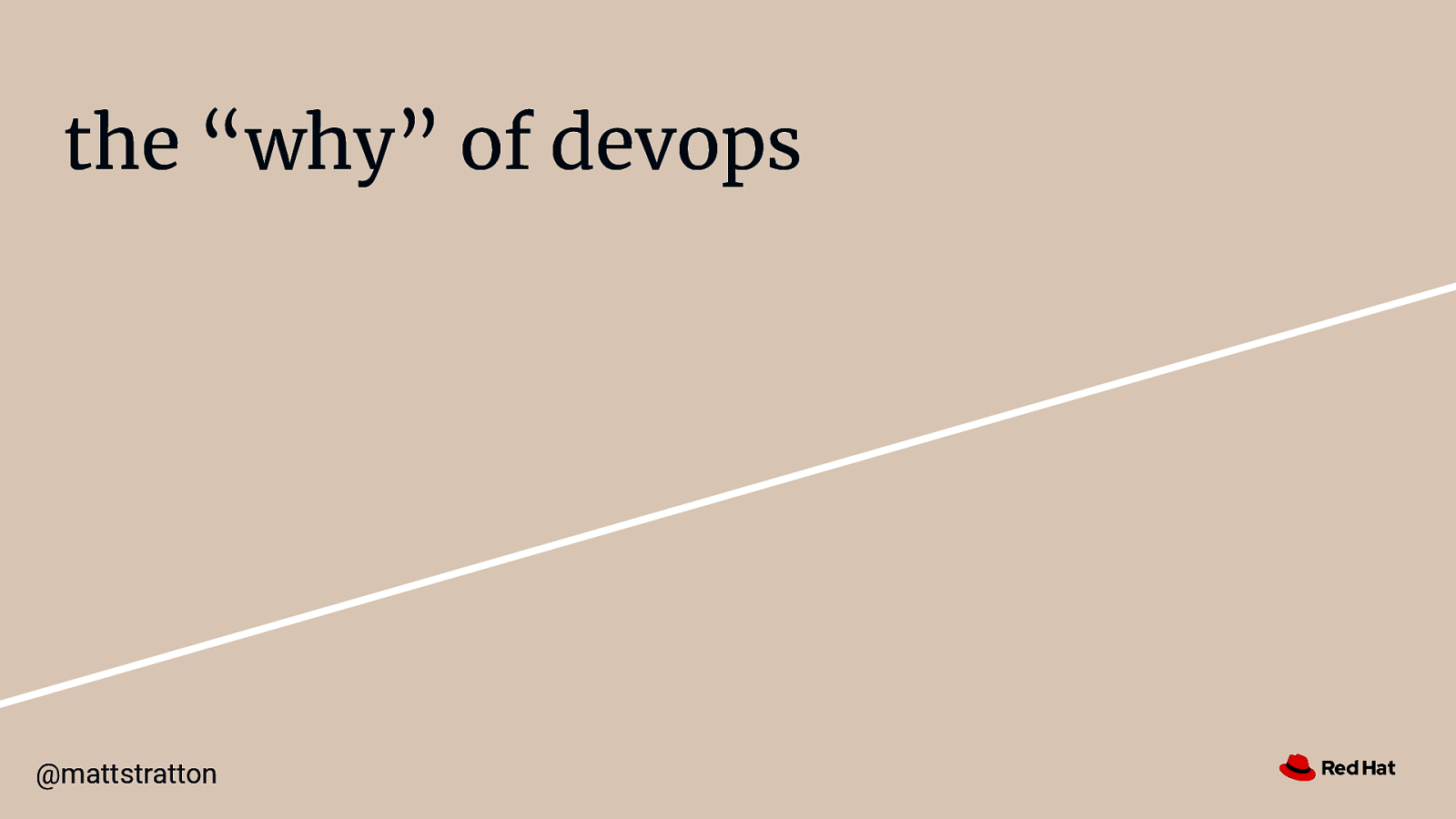
the “why” of devops @mattstratton
Slide 21
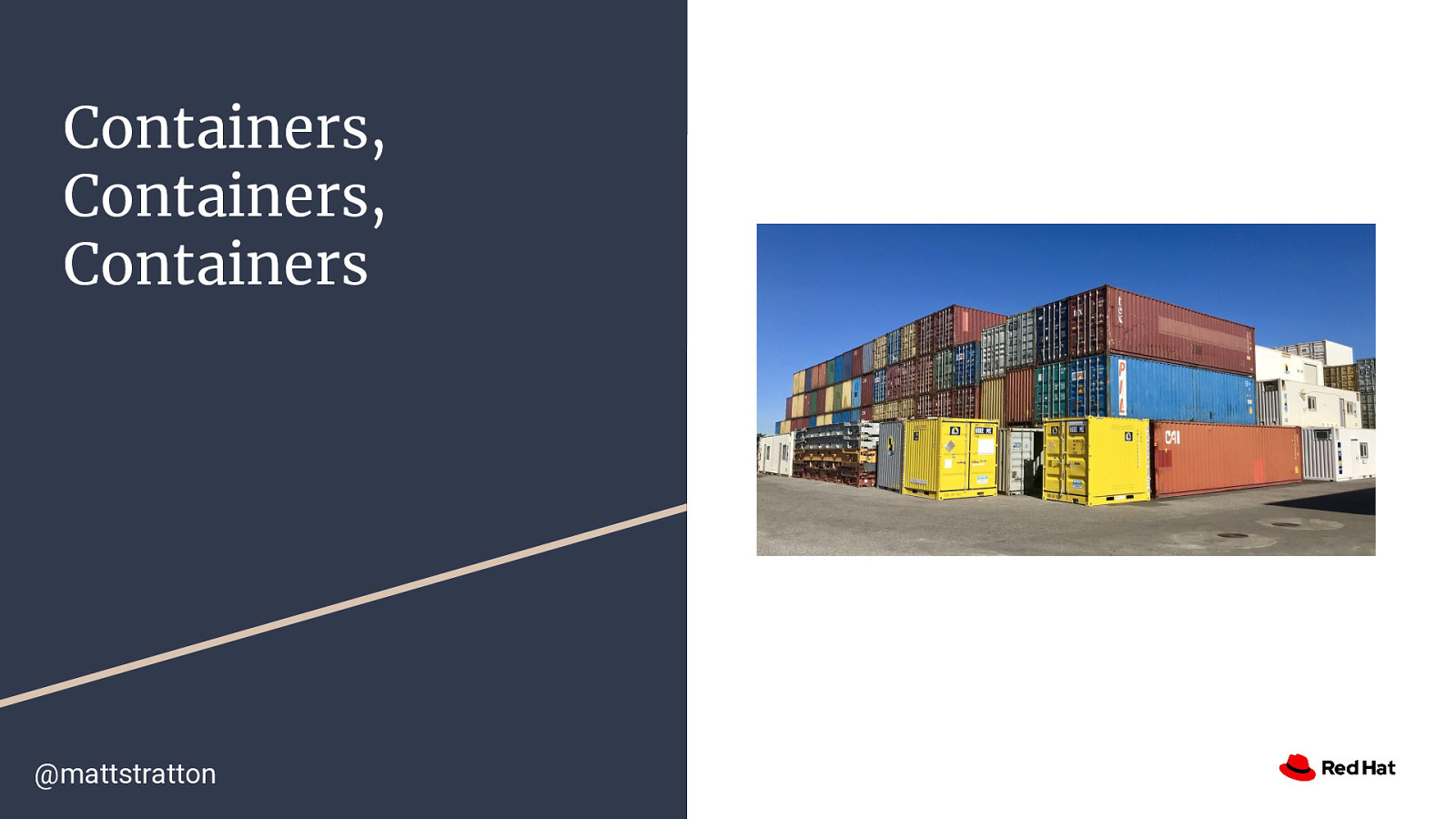
Containers, Containers, Containers @mattstratton
Slide 22

The Rise of Global Trade @mattstratton
Slide 23
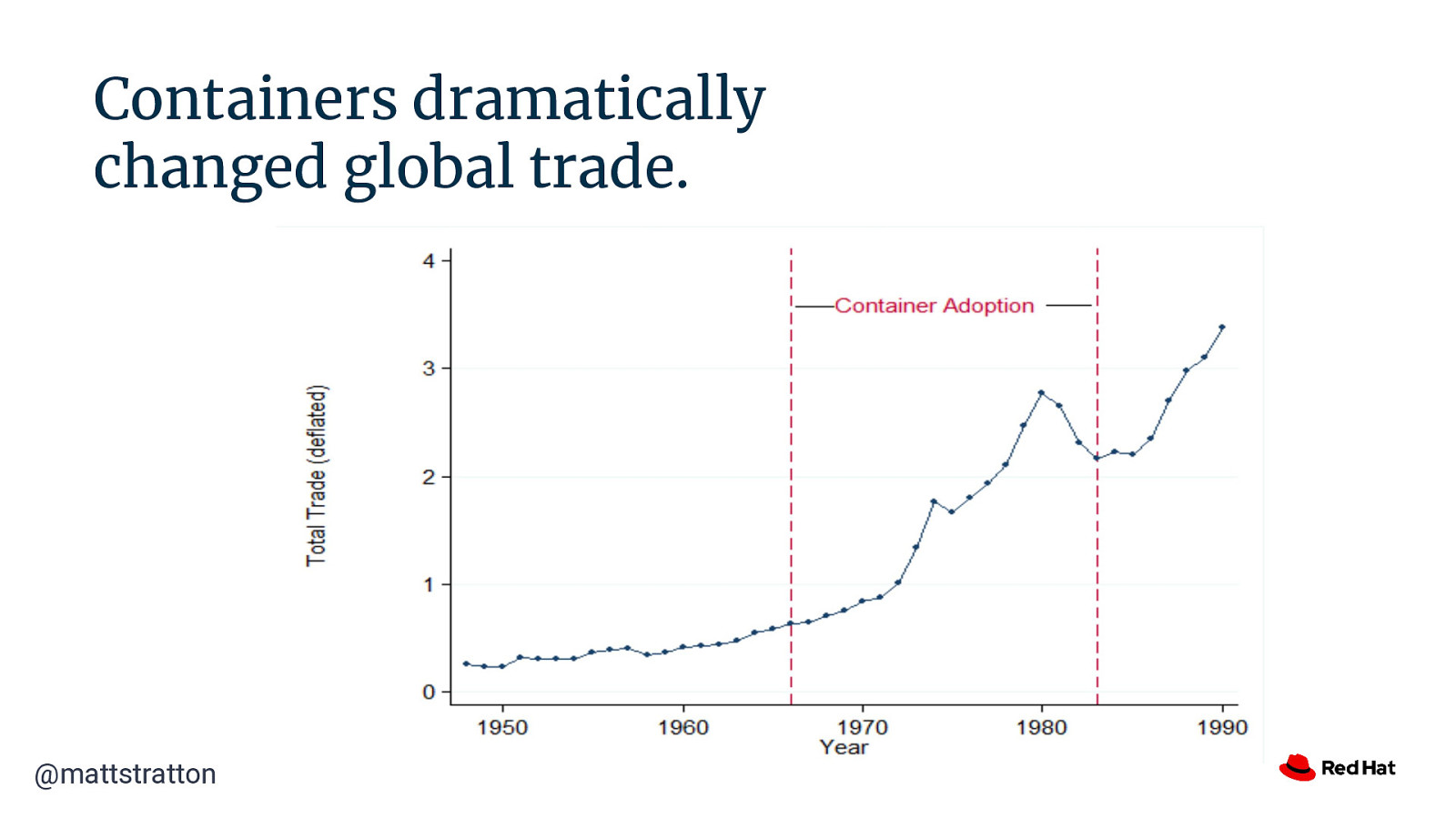
Containers dramatically changed global trade. @mattstratton
Slide 24
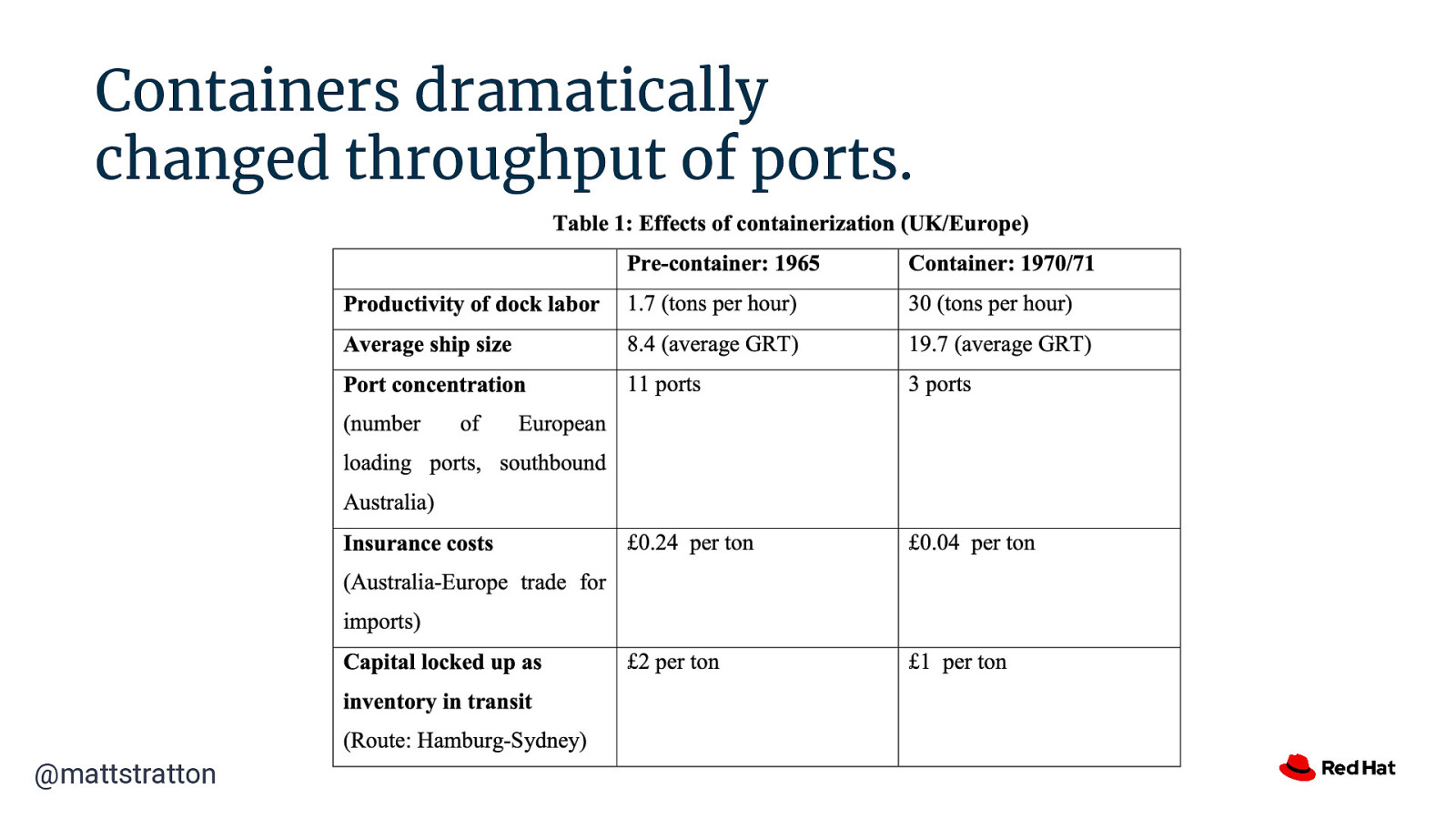
Containers dramatically changed throughput of ports. @mattstratton
Slide 25
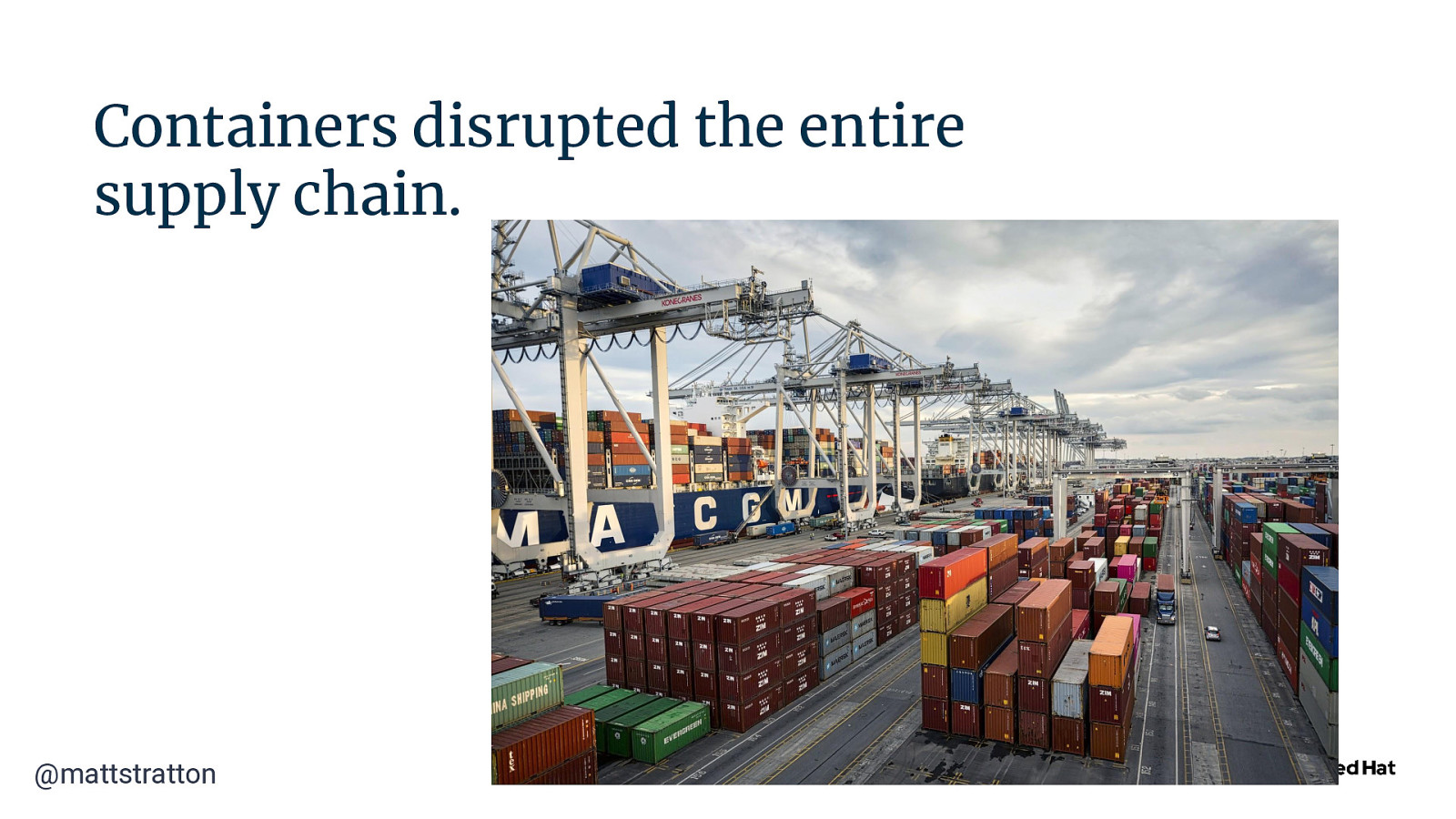
Containers disrupted the entire supply chain. @mattstratton
Slide 26
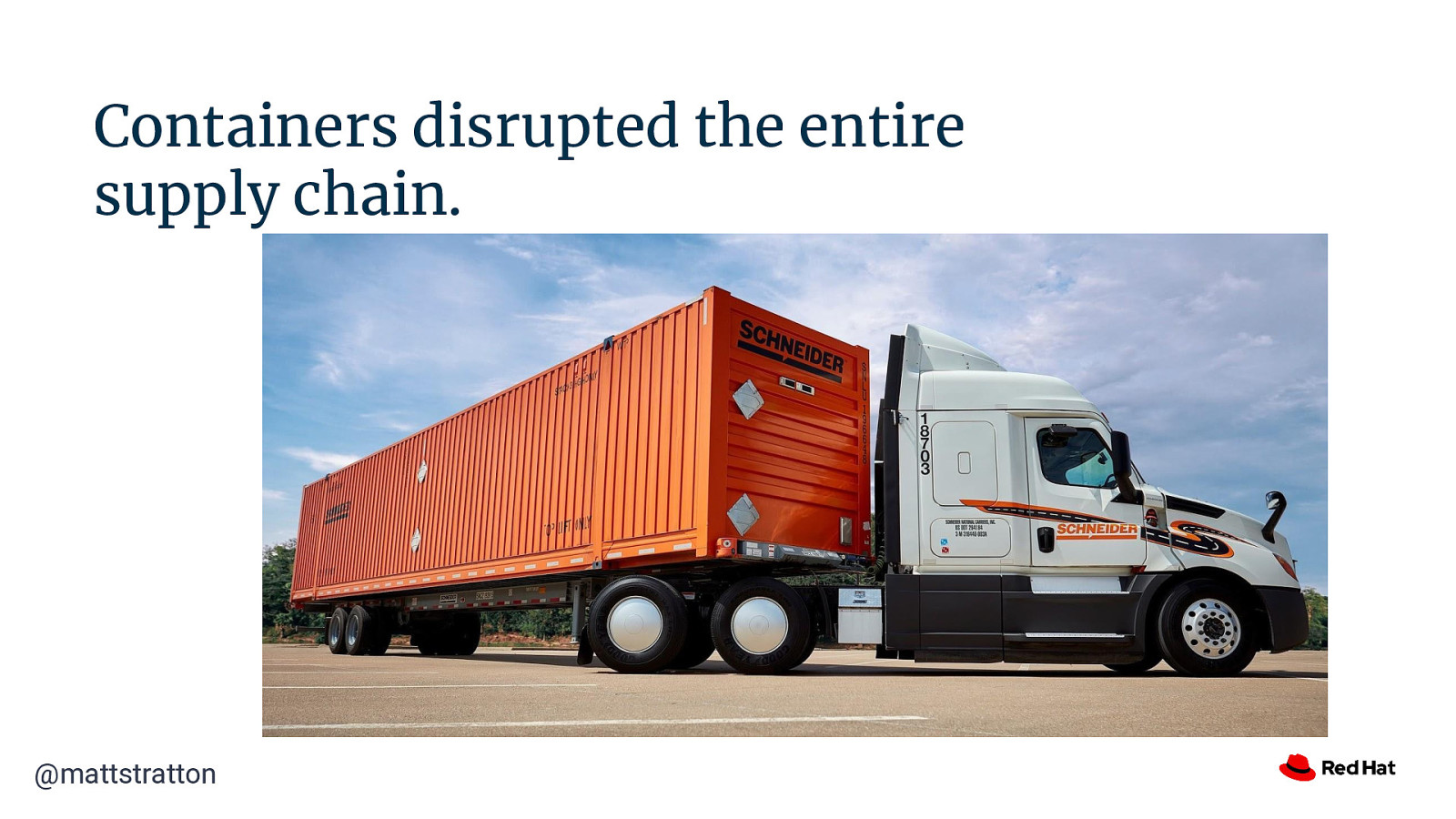
Containers disrupted the entire supply chain. @mattstratton
Slide 27
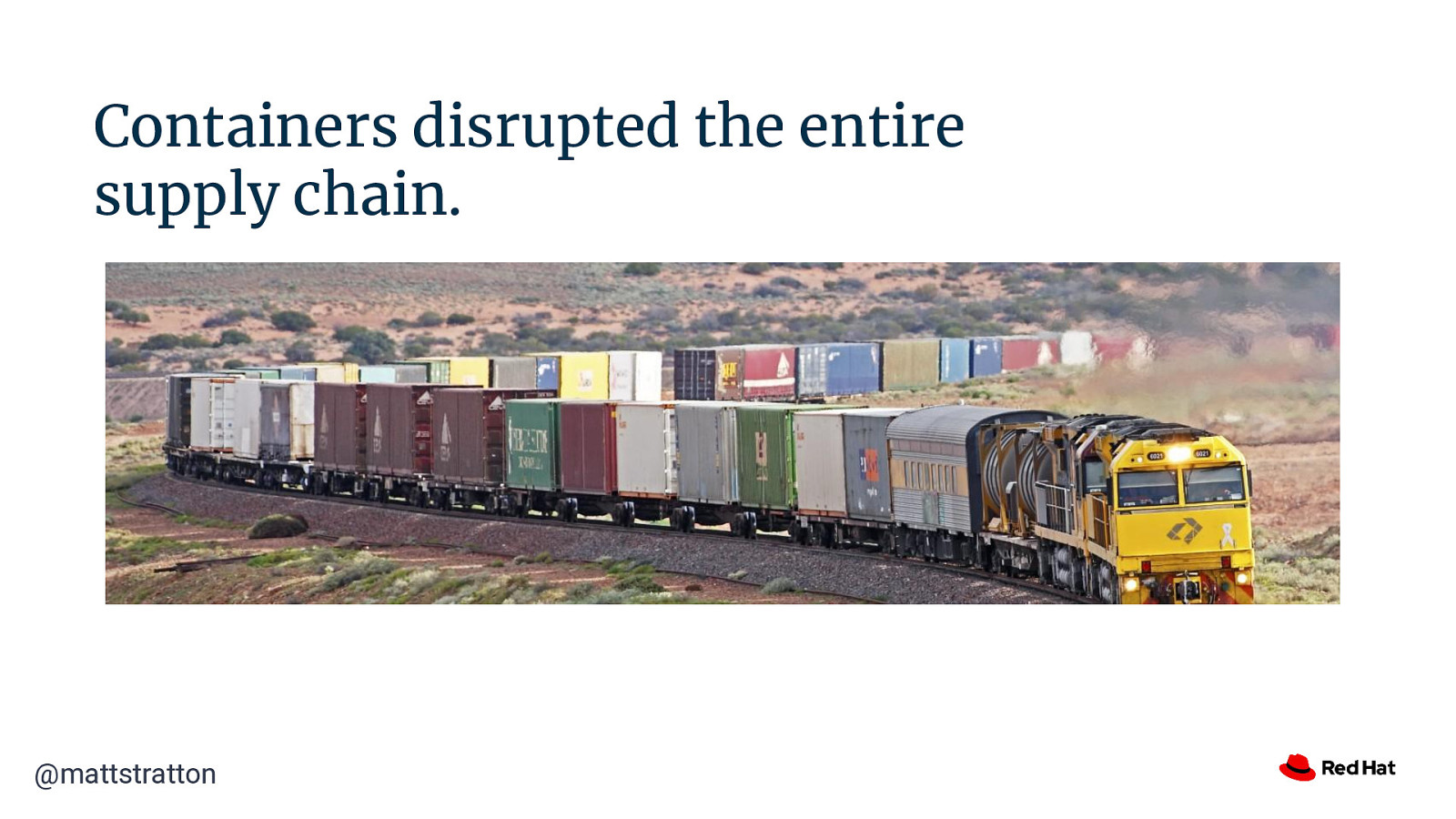
Containers disrupted the entire supply chain. @mattstratton
Slide 28
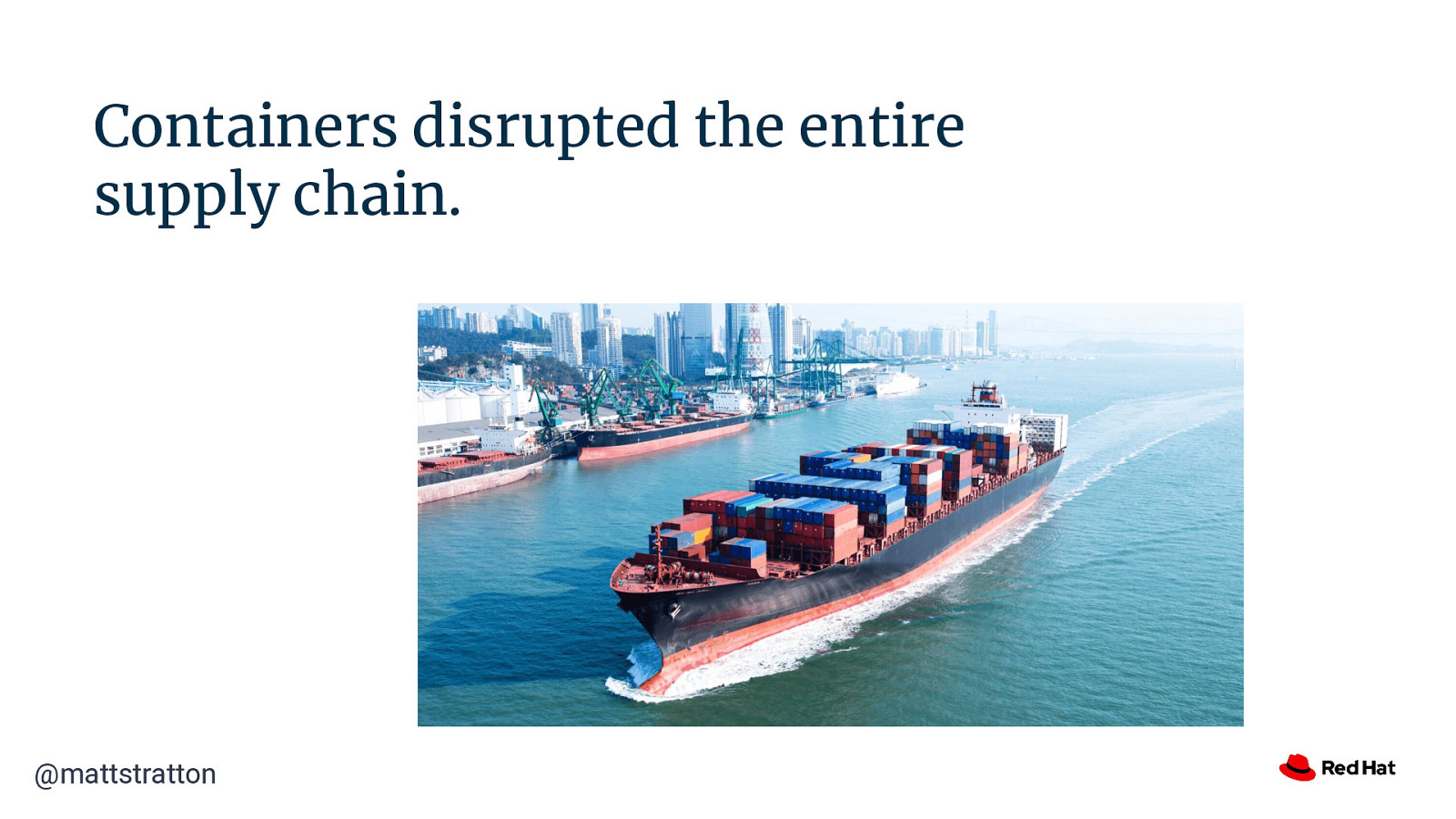
Containers disrupted the entire supply chain. @mattstratton
Slide 29
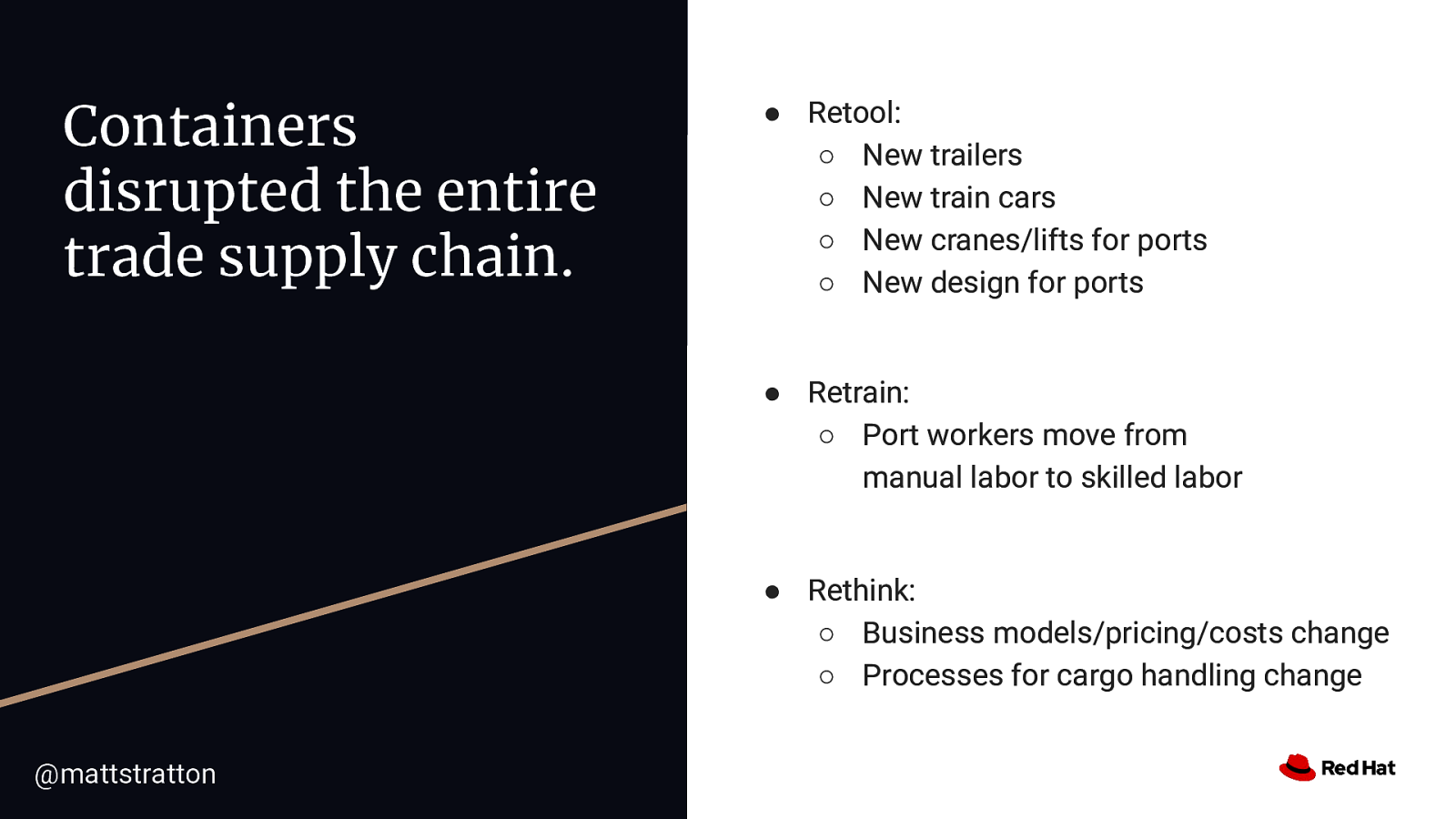
Containers disrupted the entire trade supply chain. ● Retool: ○ New trailers ○ New train cars ○ New cranes/lifts for ports ○ New design for ports ● Retrain: ○ Port workers move from manual labor to skilled labor ● Rethink: ○ Business models/pricing/costs change ○ Processes for cargo handling change @mattstratton
Slide 30
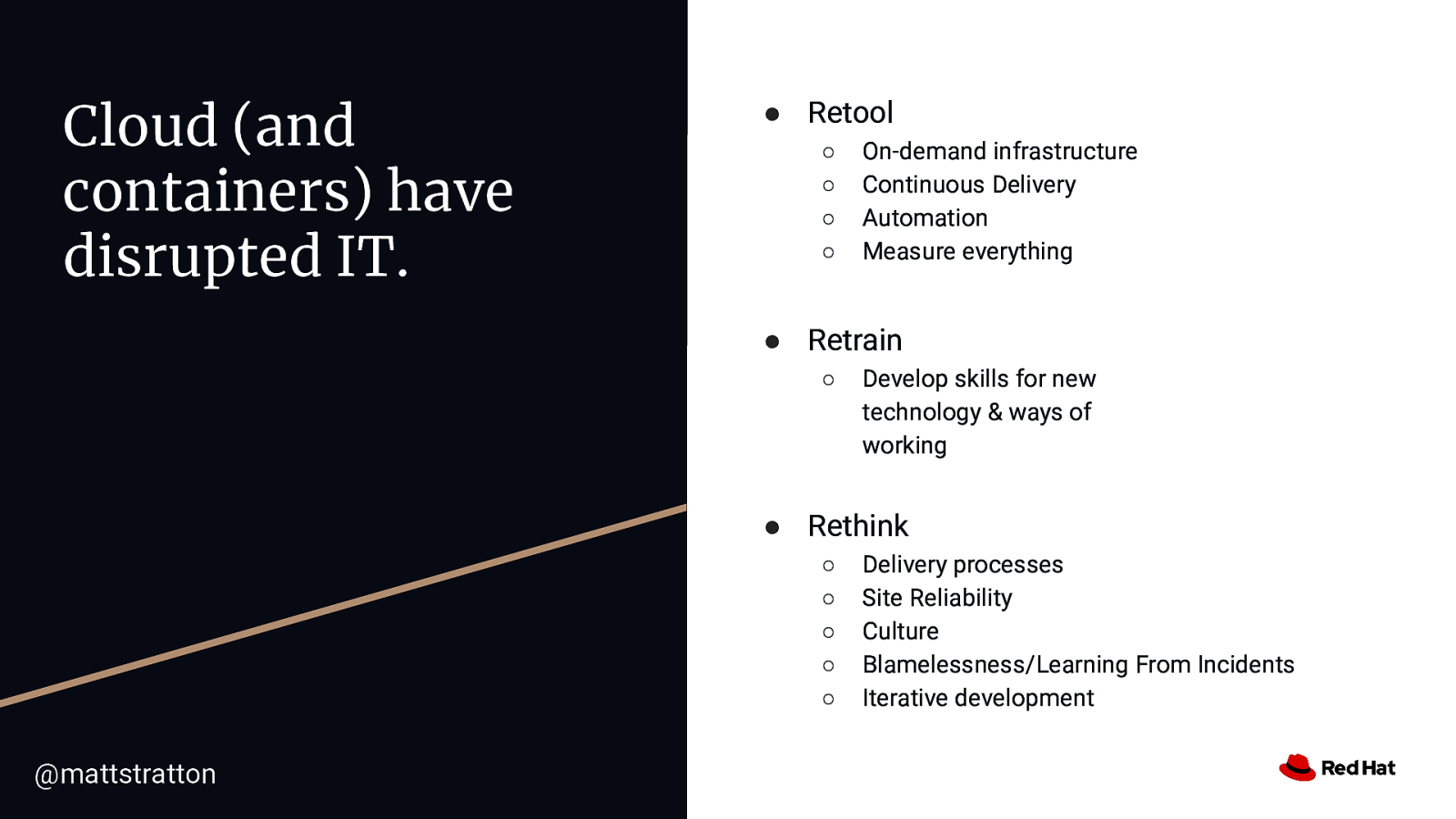
Cloud (and containers) have disrupted IT. ● Retool ○ ○ ○ ○ On-demand infrastructure Continuous Delivery Automation Measure everything ● Retrain ○ Develop skills for new technology & ways of working ● Rethink ○ ○ ○ ○ ○ @mattstratton Delivery processes Site Reliability Culture Blamelessness/Learning From Incidents Iterative development
Slide 31
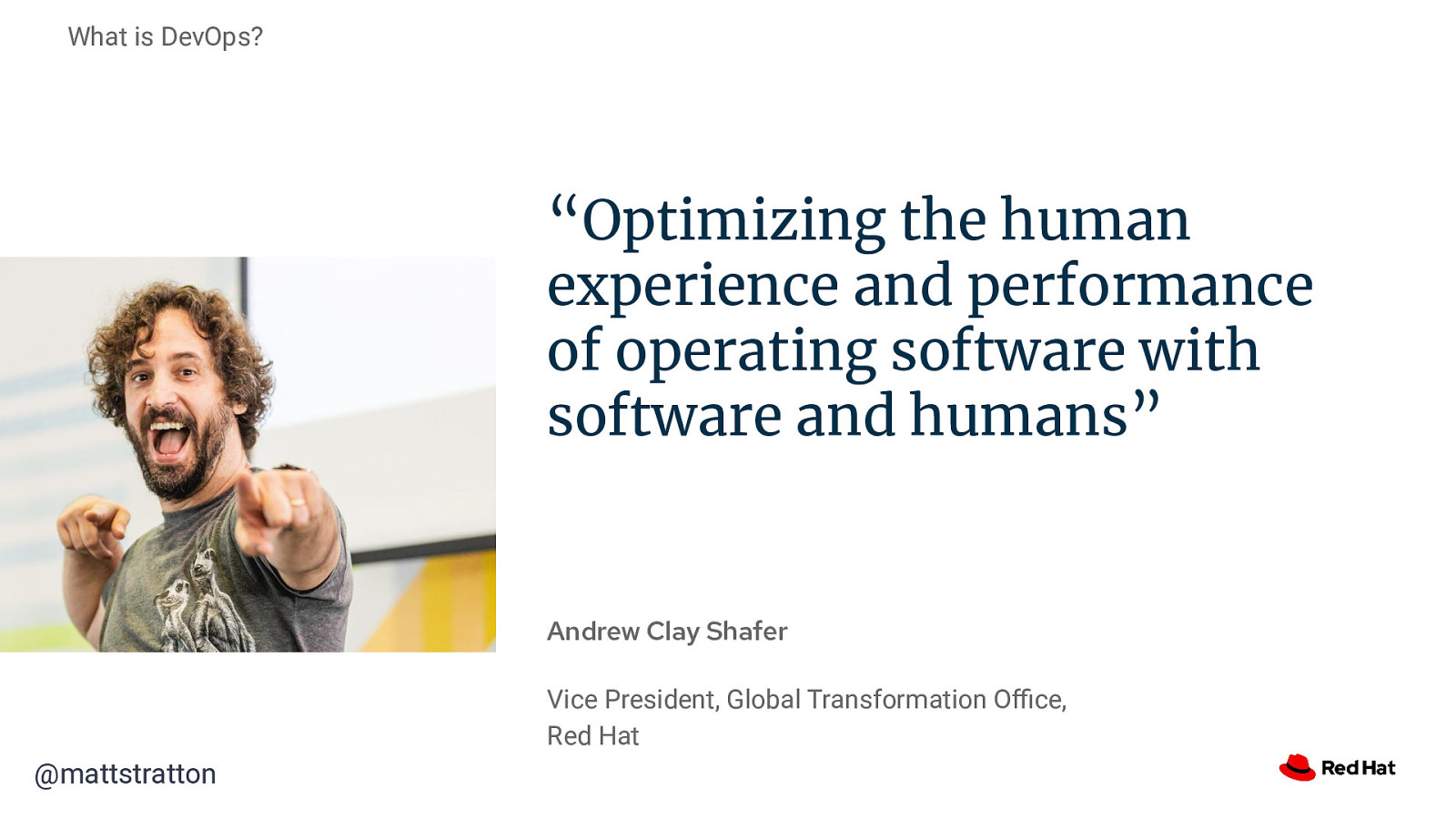
What is DevOps? “Optimizing the human experience and performance of operating software with software and humans” Andrew Clay Shafer Vice President, Global Transformation Office, Red Hat @mattstratton
Slide 32
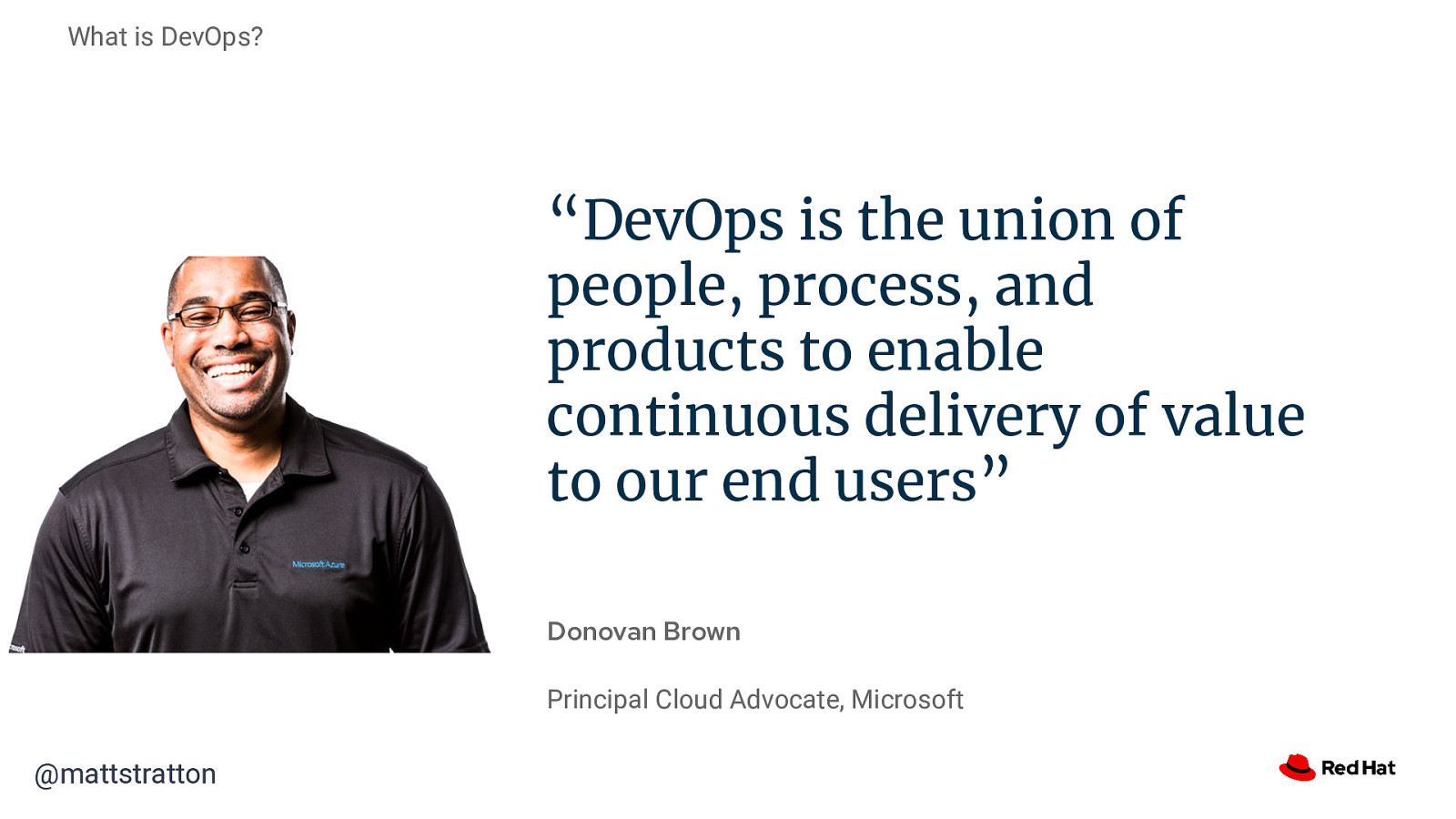
What is DevOps? “DevOps is the union of people, process, and products to enable continuous delivery of value to our end users” Donovan Brown Principal Cloud Advocate, Microsoft @mattstratton
Slide 33
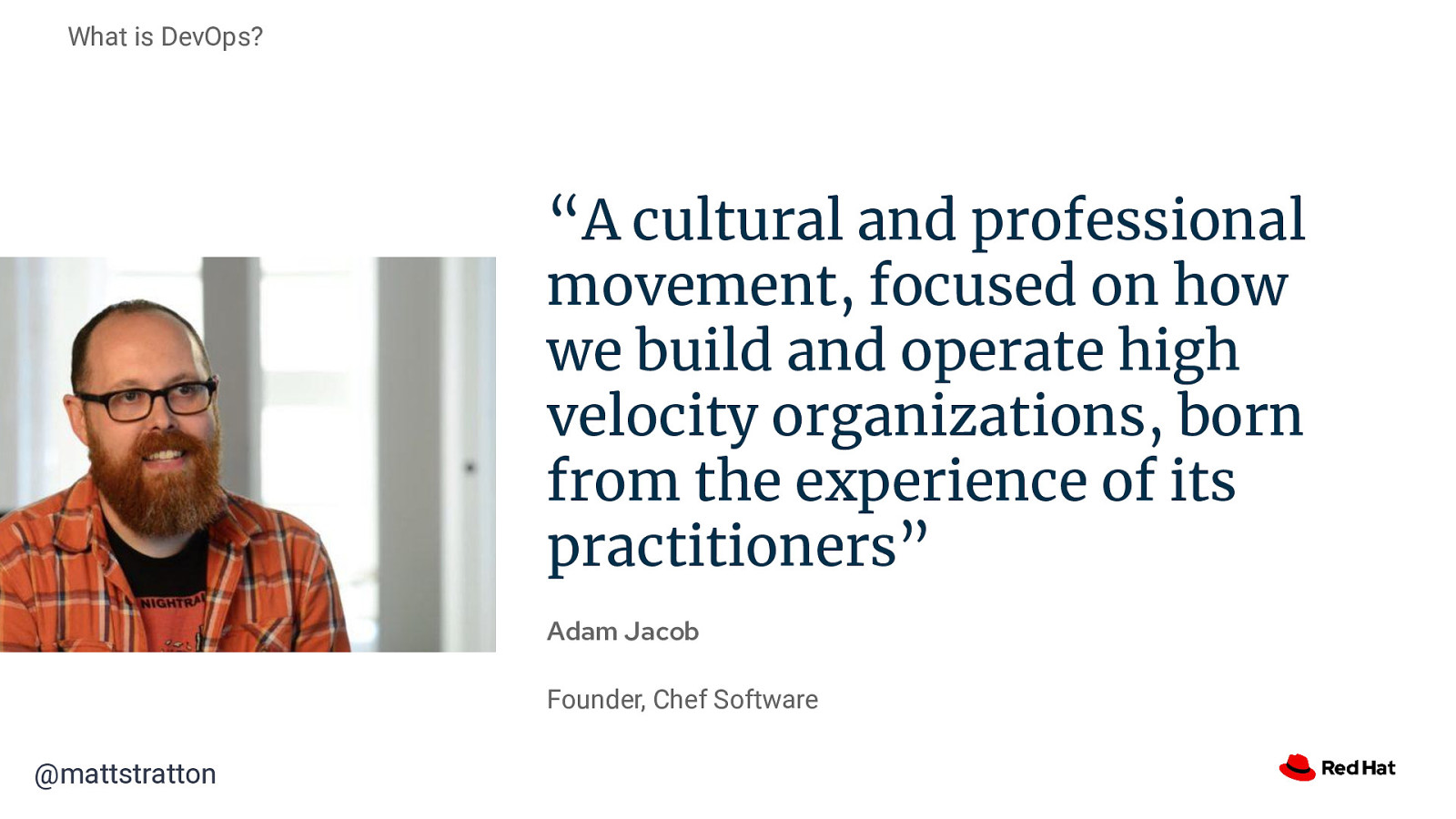
What is DevOps? “A cultural and professional movement, focused on how we build and operate high velocity organizations, born from the experience of its practitioners” Adam Jacob Founder, Chef Software @mattstratton
Slide 34
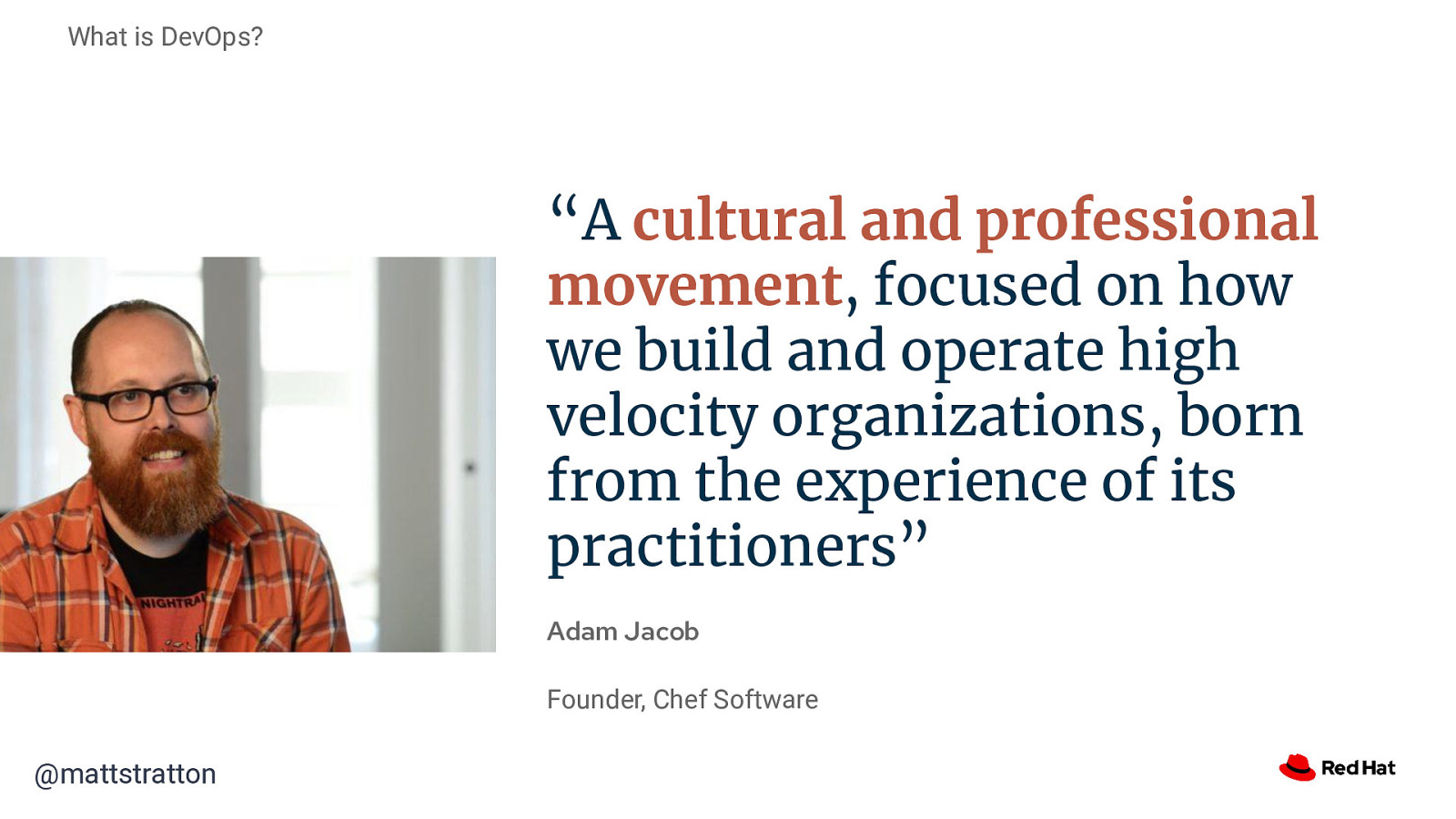
What is DevOps? “A cultural and professional movement, focused on how we build and operate high velocity organizations, born from the experience of its practitioners” Adam Jacob Founder, Chef Software @mattstratton
Slide 35
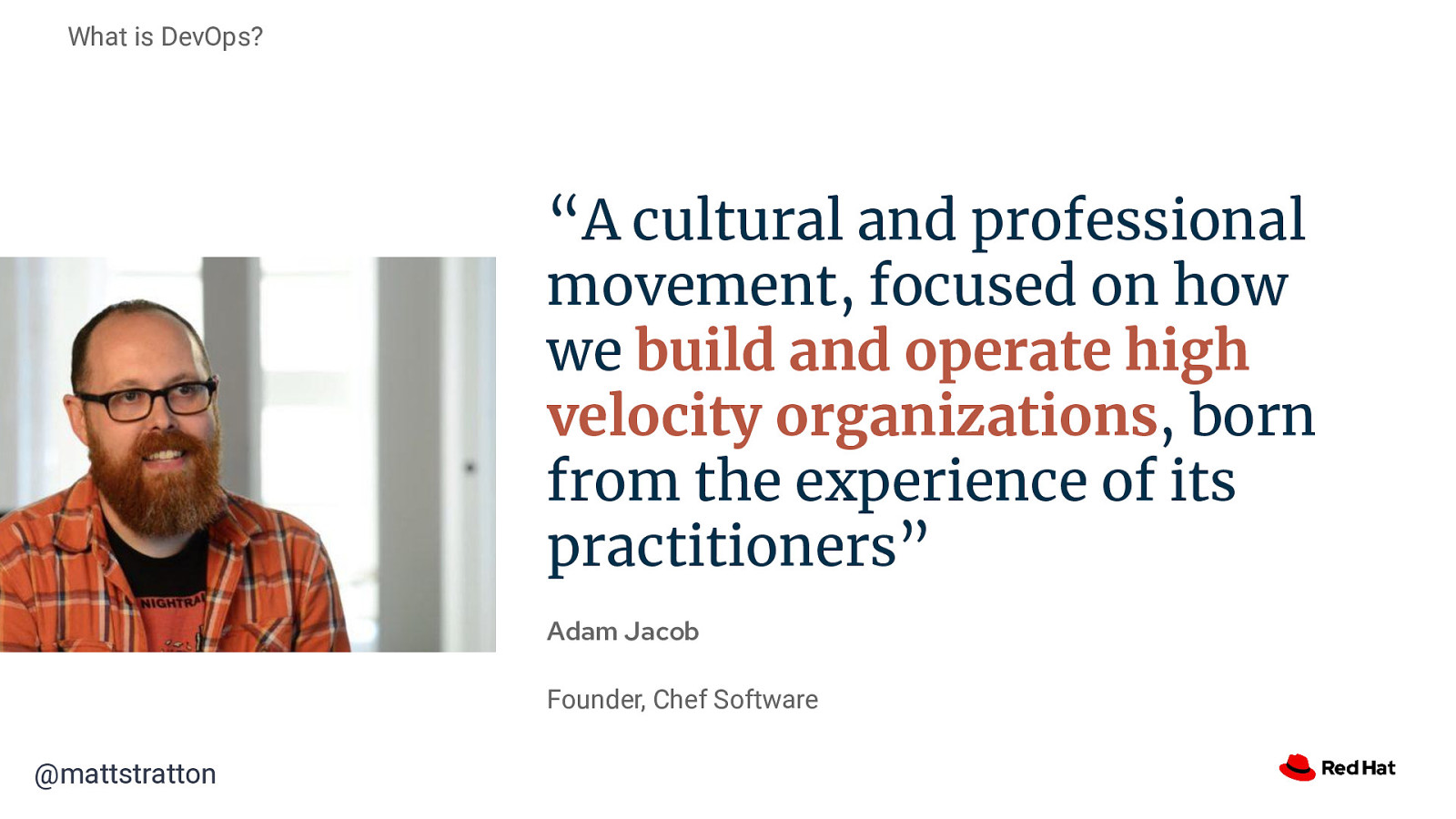
What is DevOps? “A cultural and professional movement, focused on how we build and operate high velocity organizations, born from the experience of its practitioners” Adam Jacob Founder, Chef Software @mattstratton
Slide 36
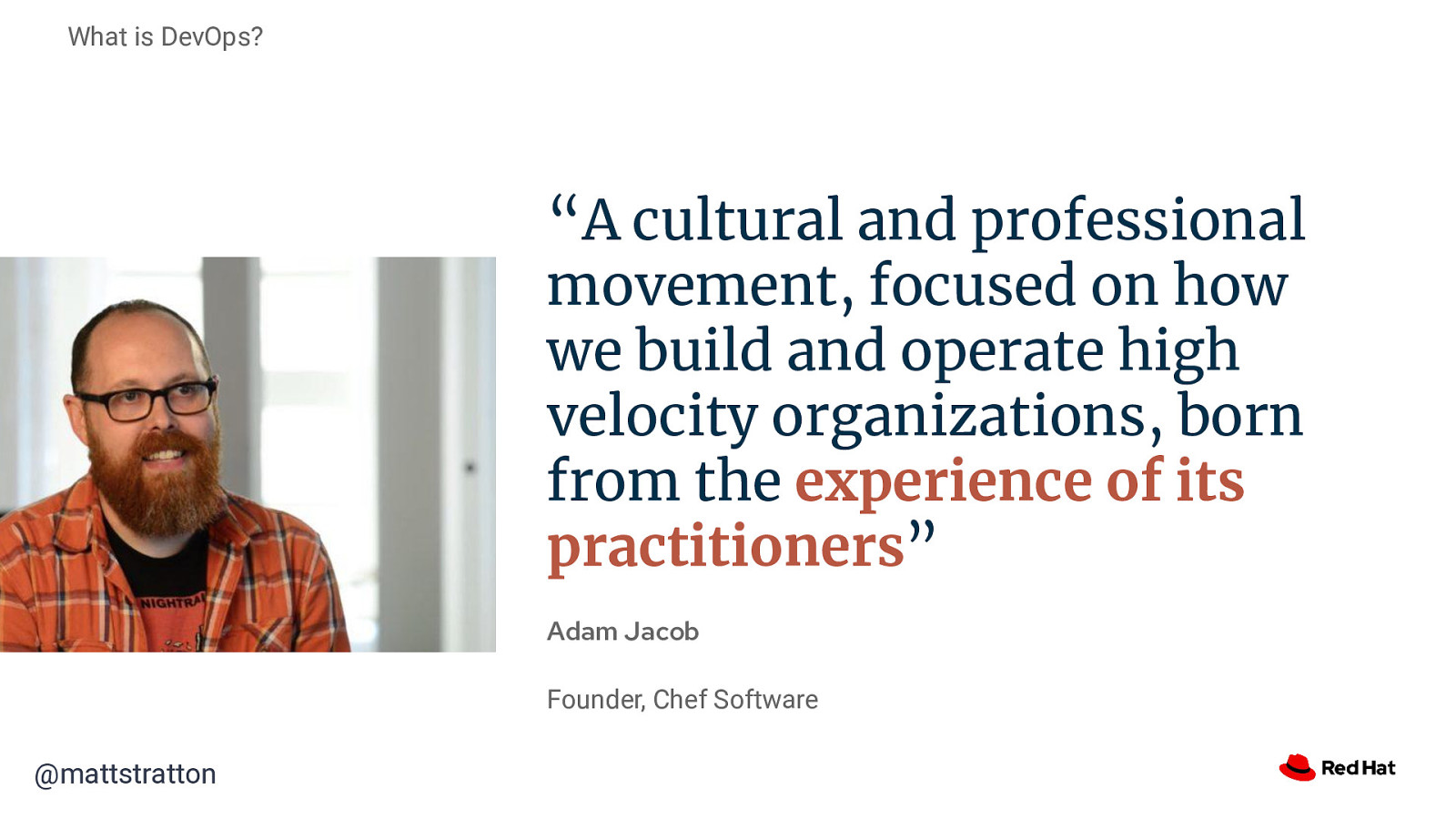
What is DevOps? “A cultural and professional movement, focused on how we build and operate high velocity organizations, born from the experience of its practitioners” Adam Jacob Founder, Chef Software @mattstratton
Slide 37
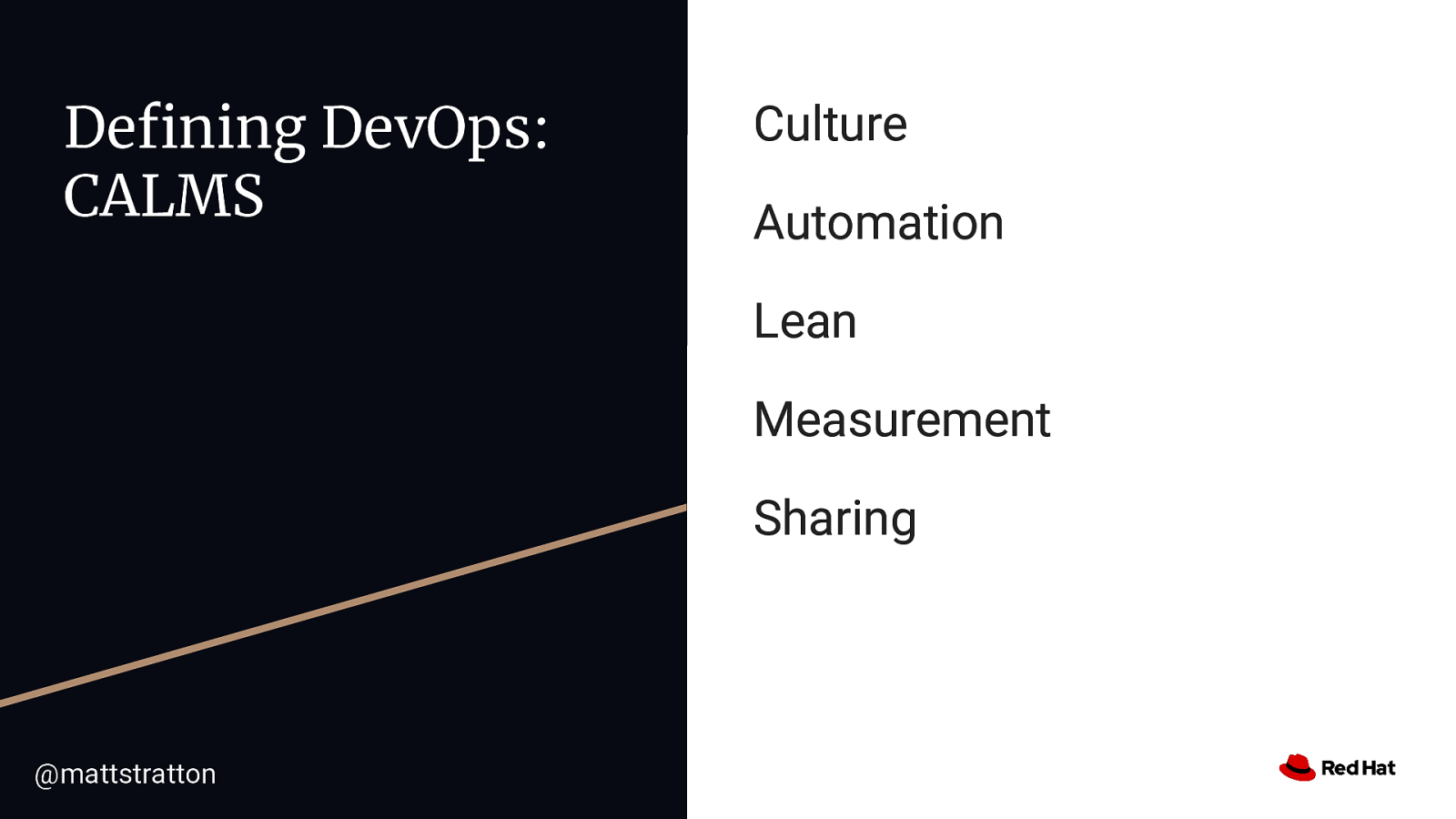
Defining DevOps: CALMS Culture Automation Lean Measurement Sharing @mattstratton
Slide 38
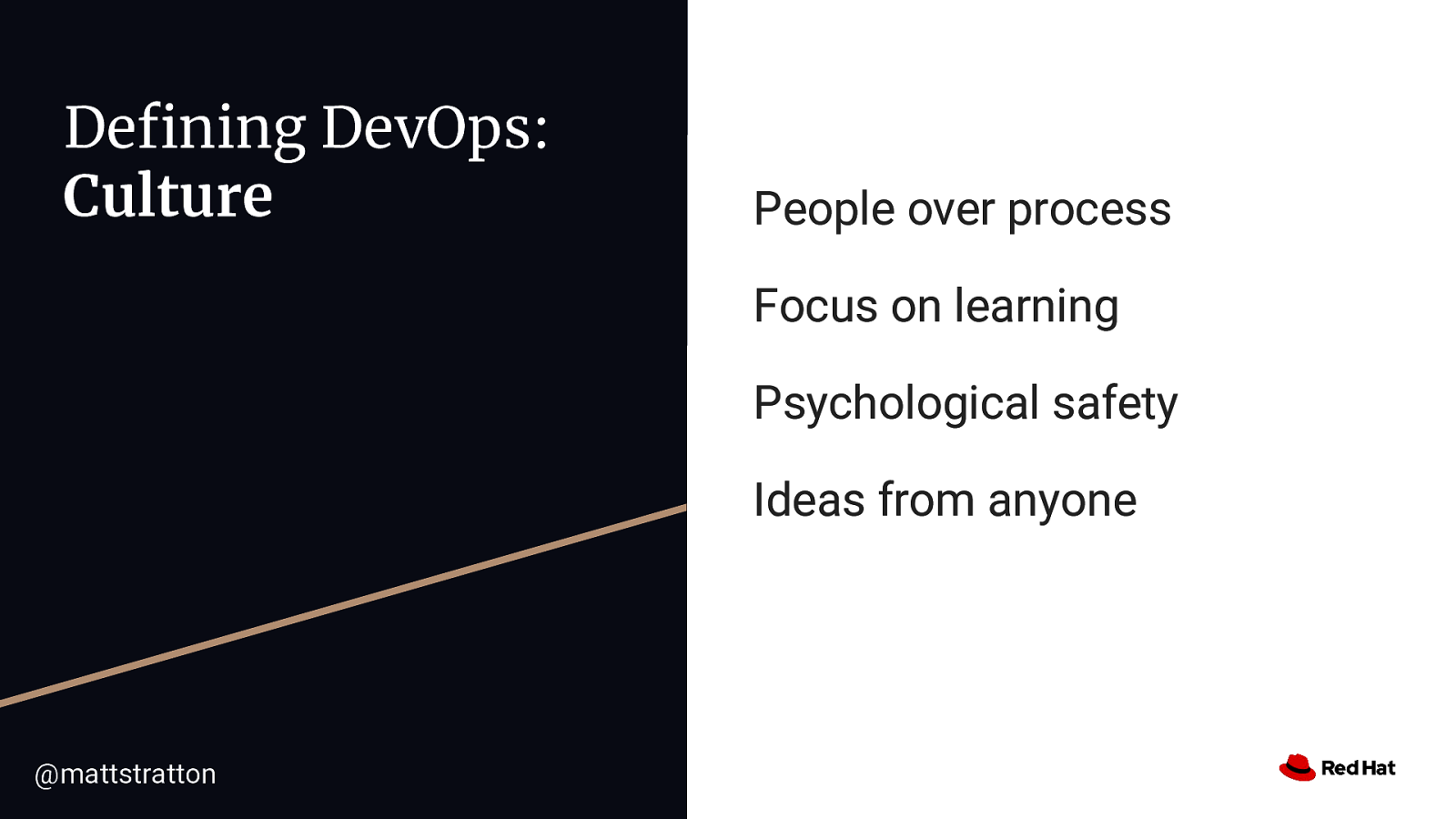
Defining DevOps: Culture People over process Focus on learning Psychological safety Ideas from anyone @mattstratton
Slide 39
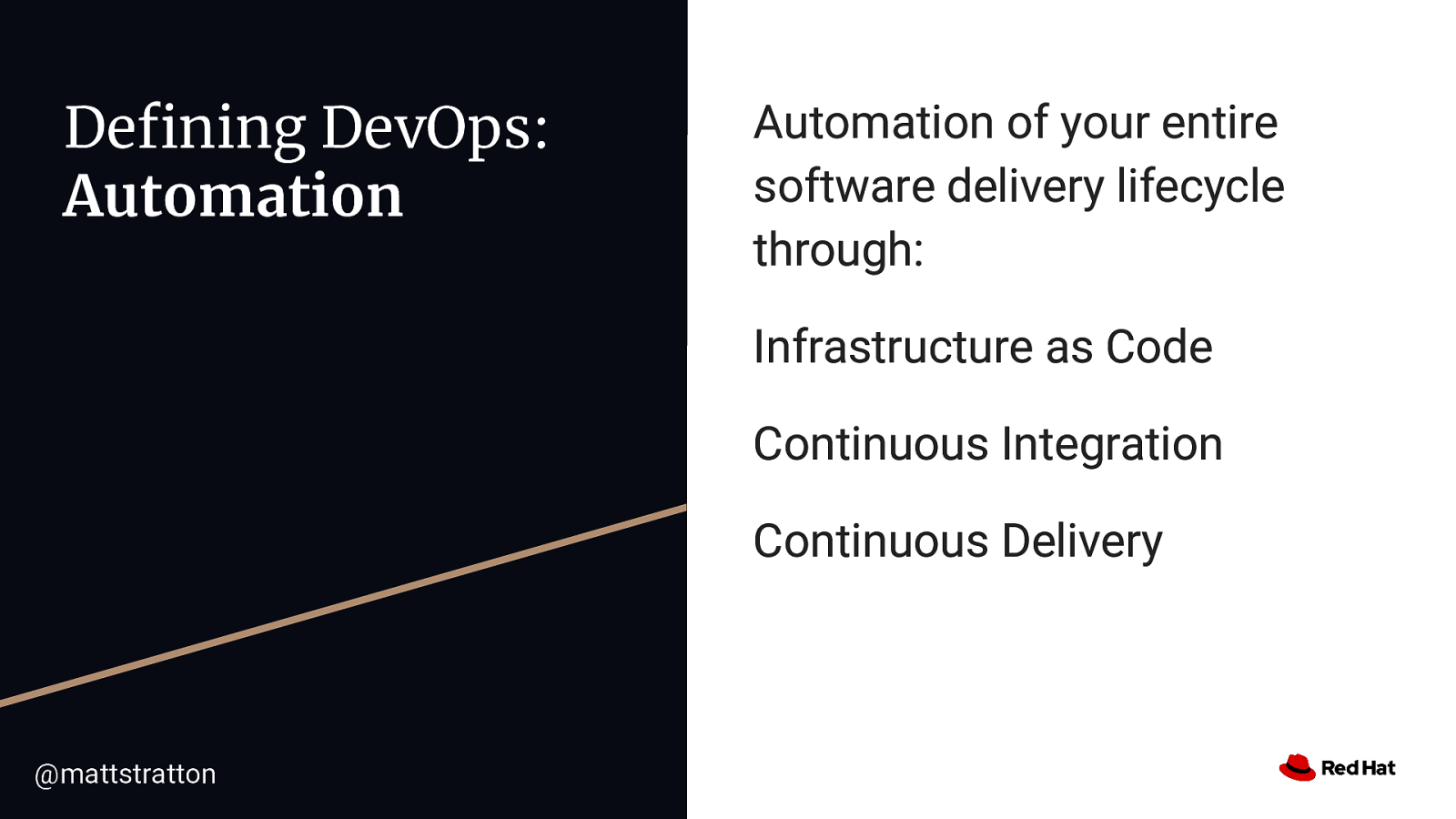
Defining DevOps: Automation Automation of your entire software delivery lifecycle through: Infrastructure as Code Continuous Integration Continuous Delivery @mattstratton
Slide 40
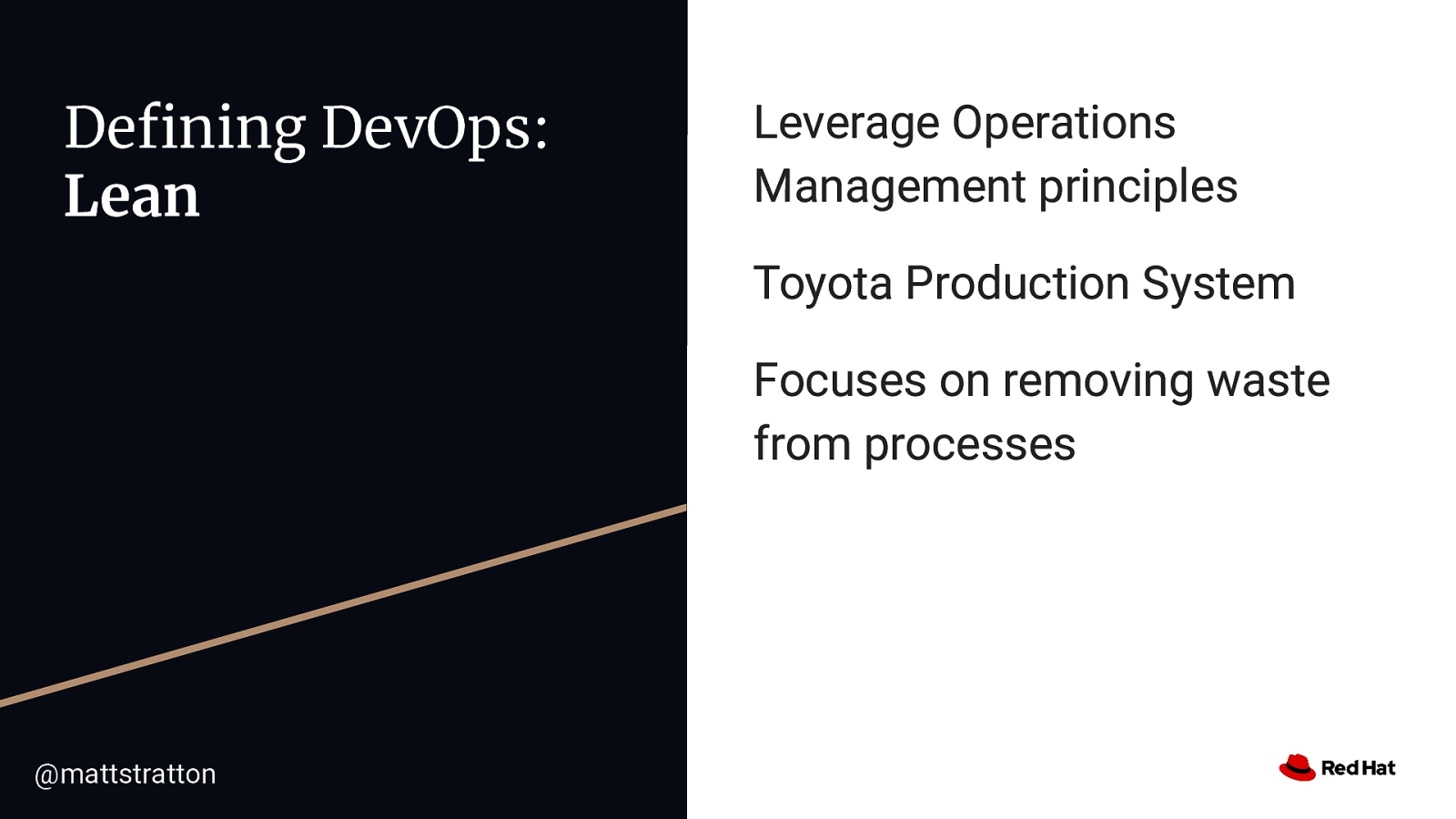
Defining DevOps: Lean Leverage Operations Management principles Toyota Production System Focuses on removing waste from processes @mattstratton
Slide 41
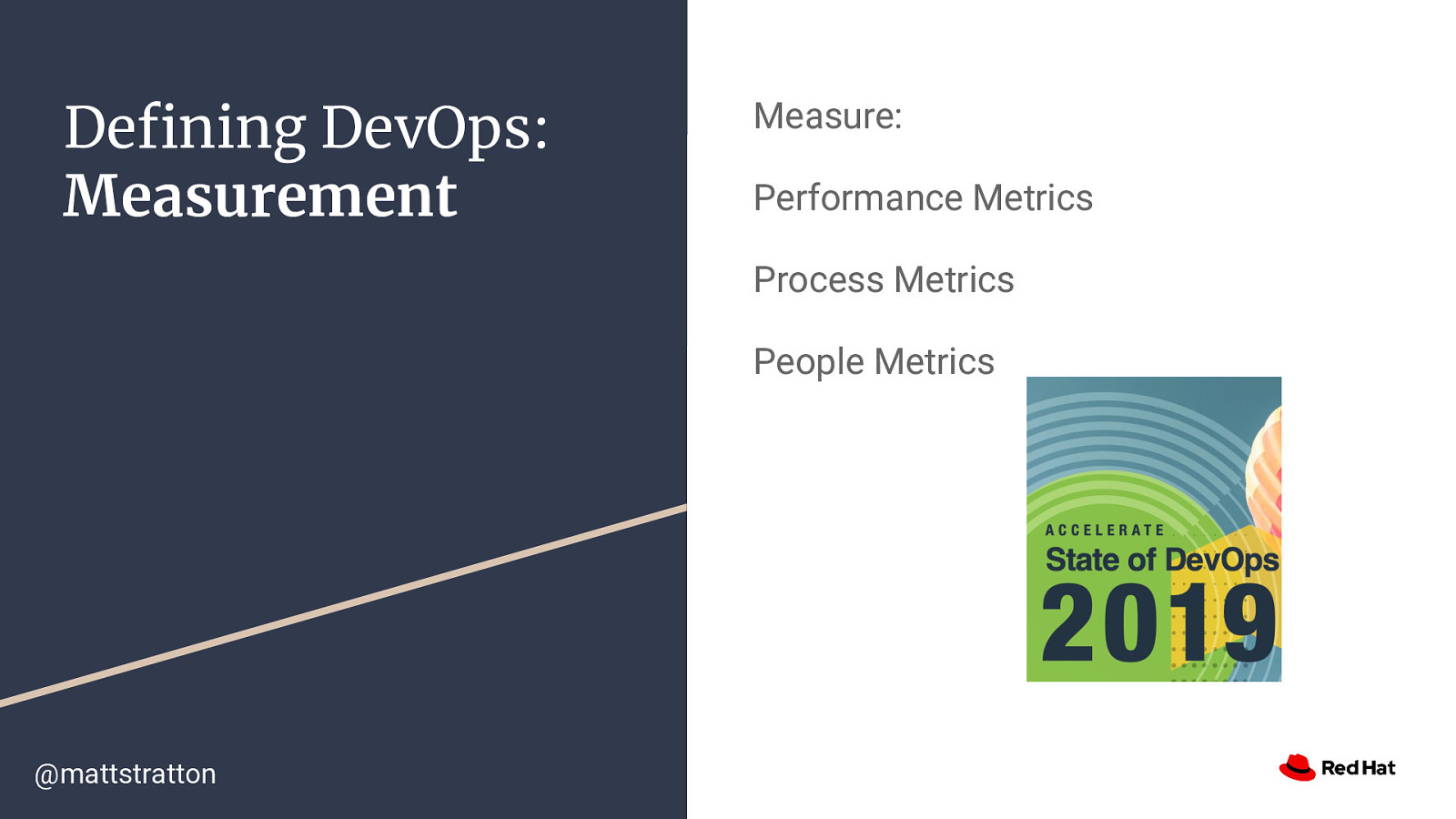
Defining DevOps: Measurement Measure: Performance Metrics Process Metrics People Metrics @mattstratton
Slide 42
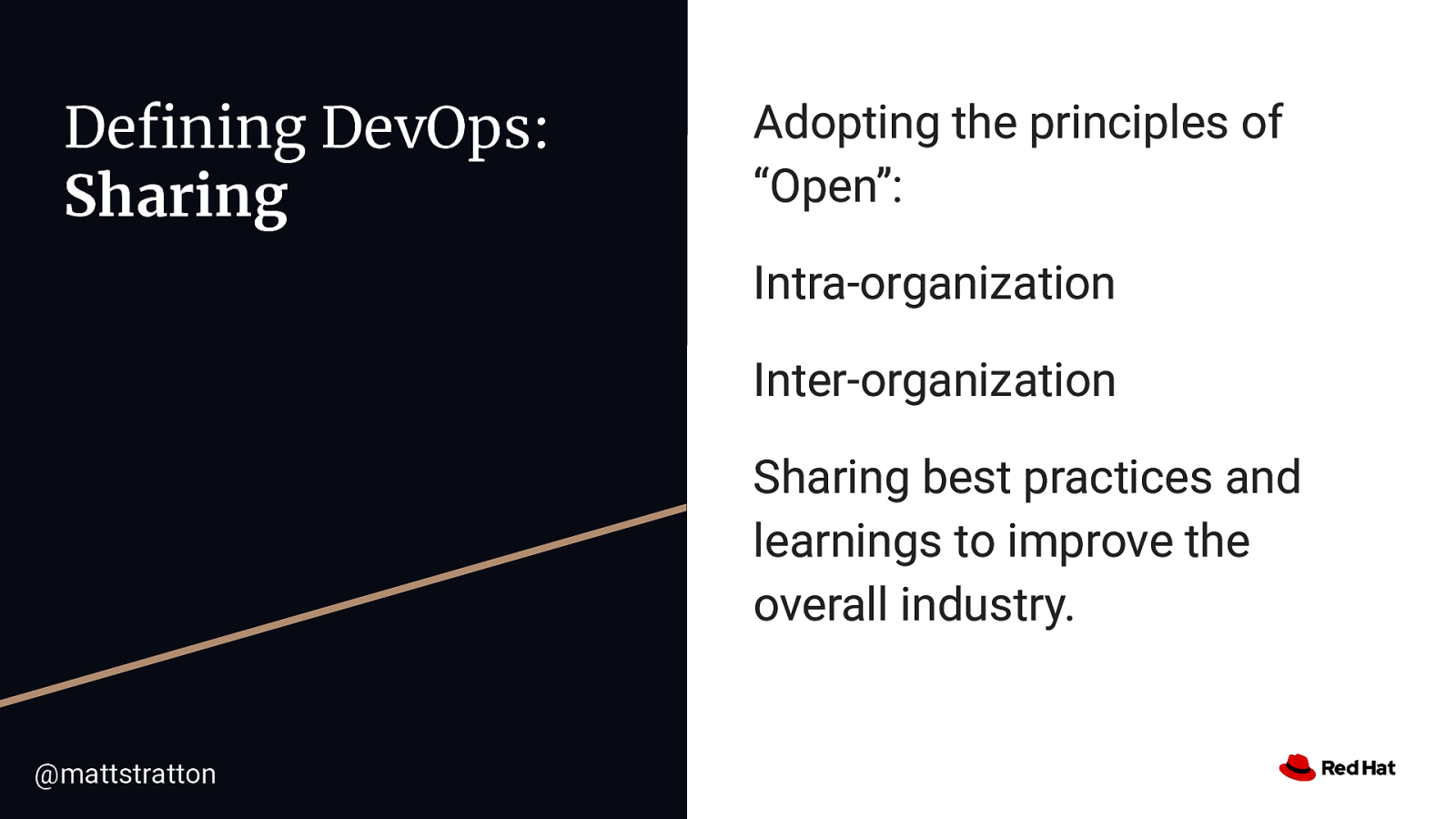
Defining DevOps: Sharing Adopting the principles of “Open”: Intra-organization Inter-organization Sharing best practices and learnings to improve the overall industry. @mattstratton
Slide 43
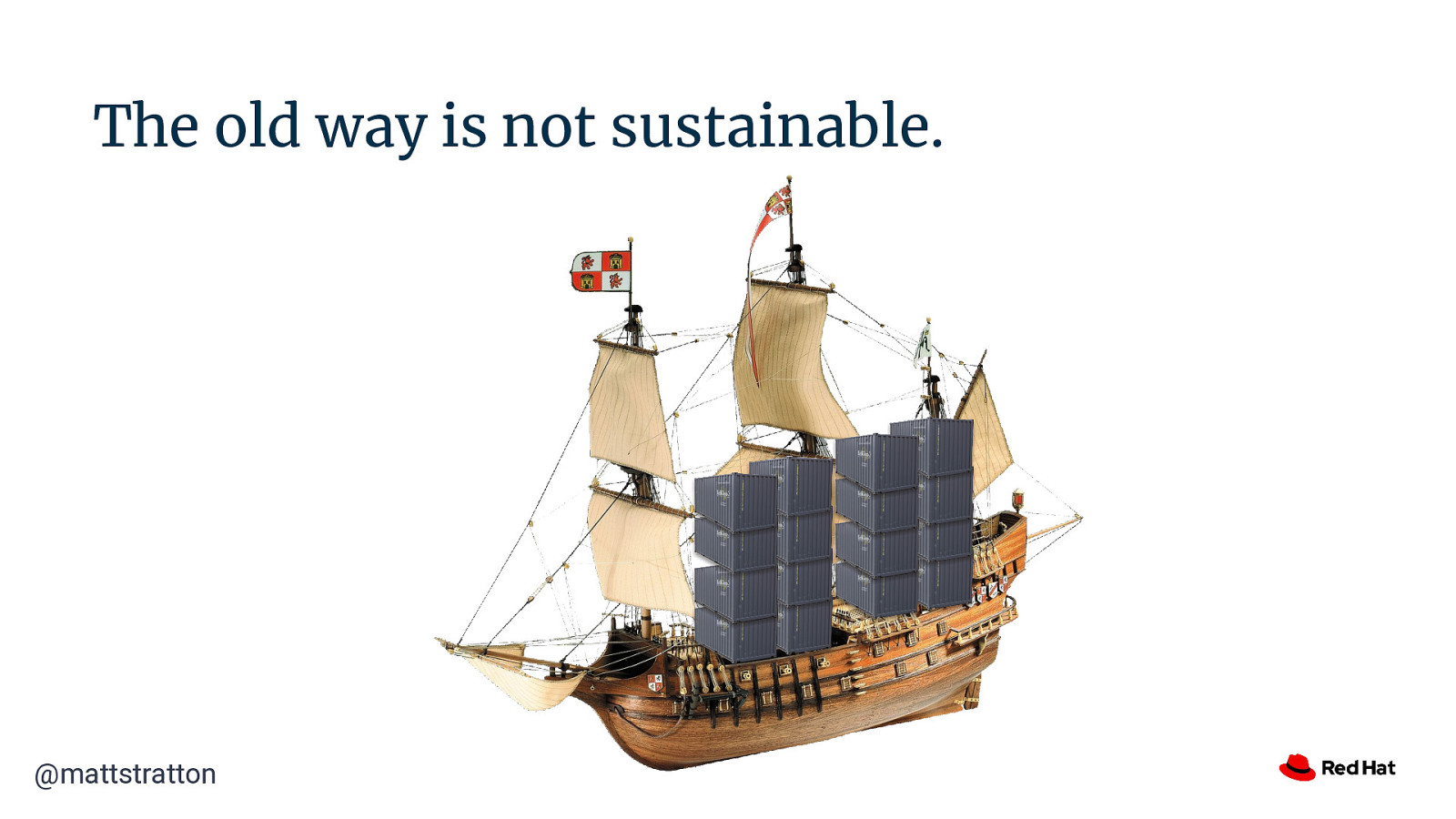
The old way is not sustainable. @mattstratton
Slide 44
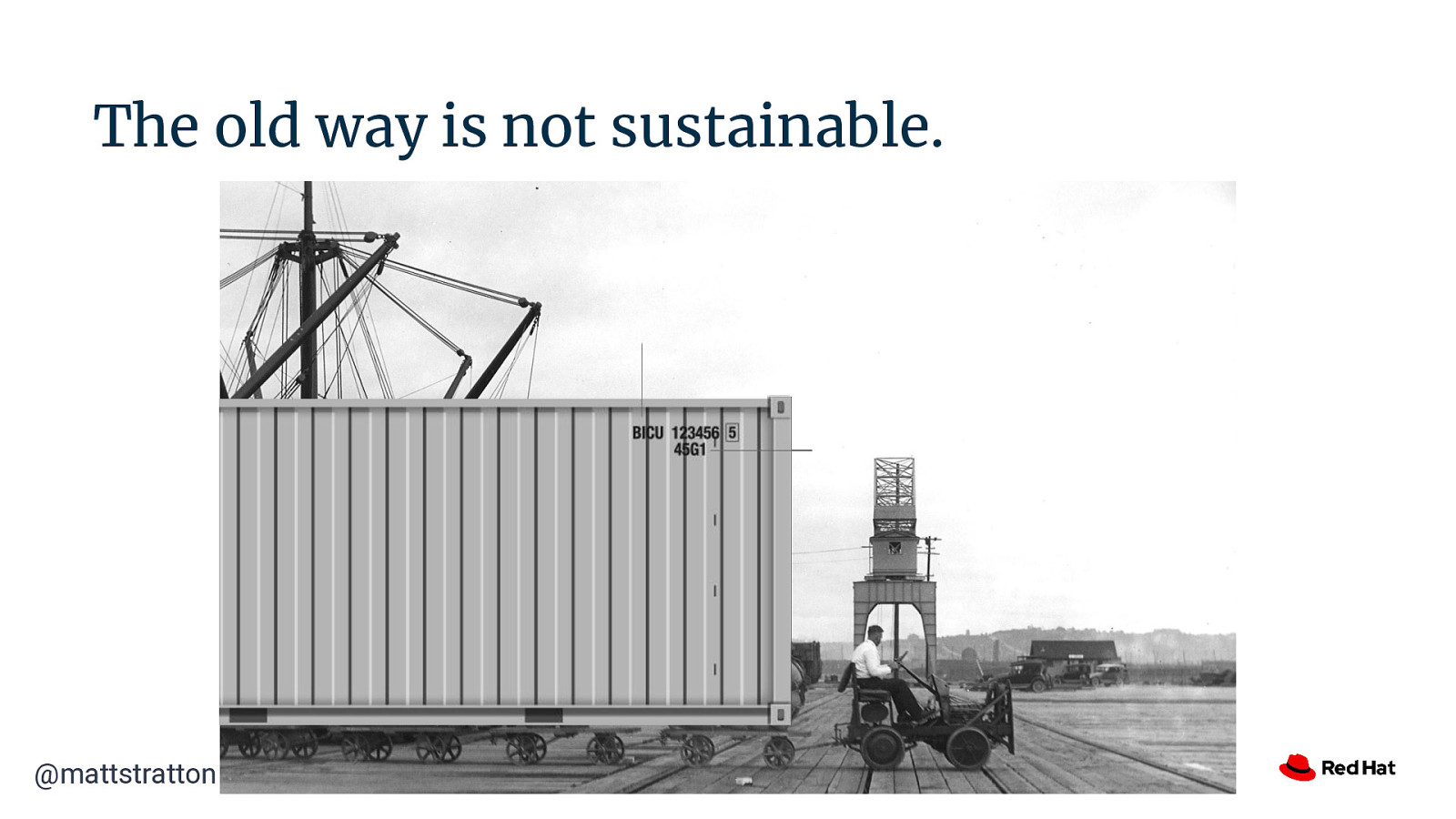
The old way is not sustainable. @mattstratton
Slide 45
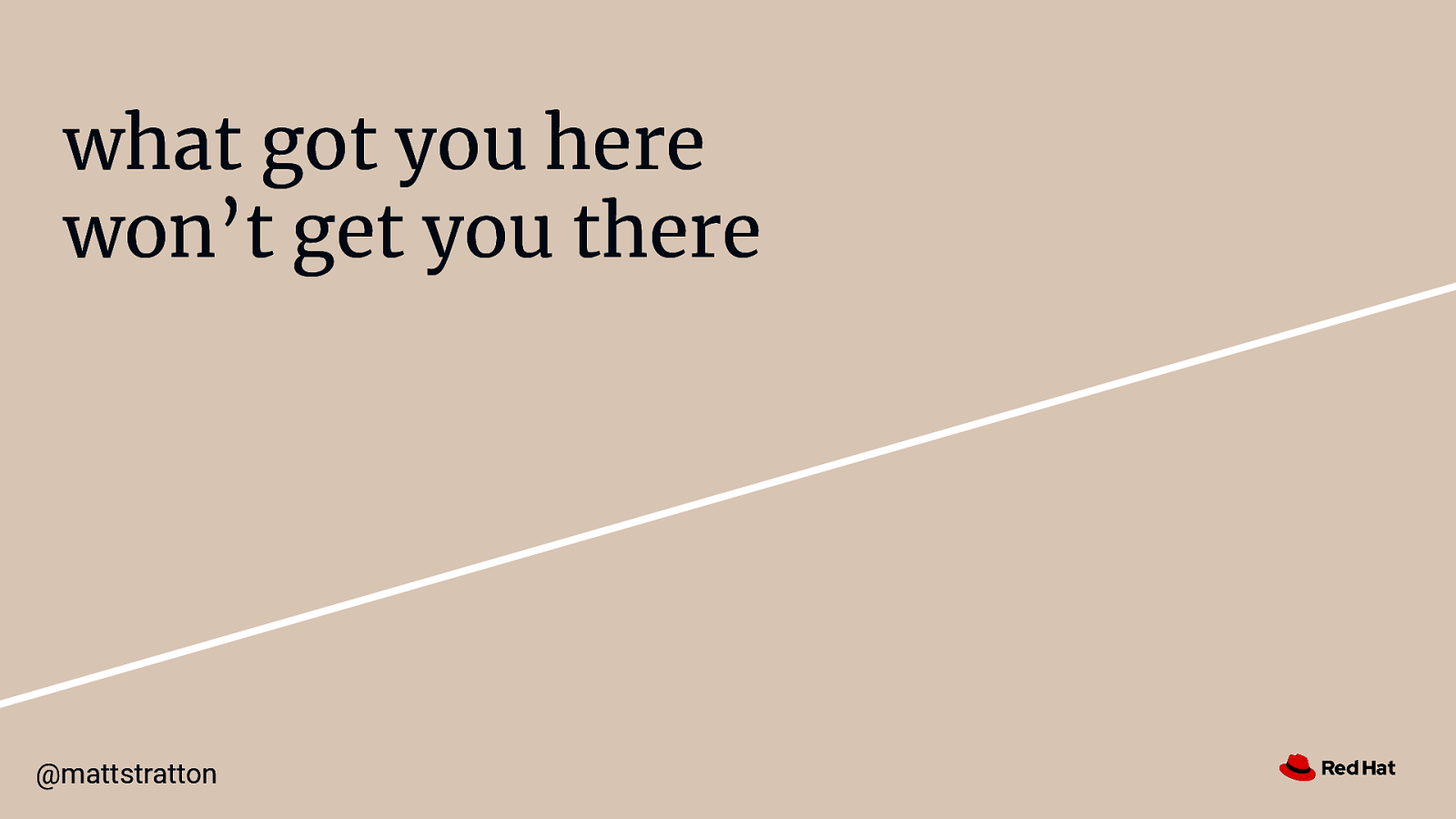
what got you here won’t get you there @mattstratton
Slide 46
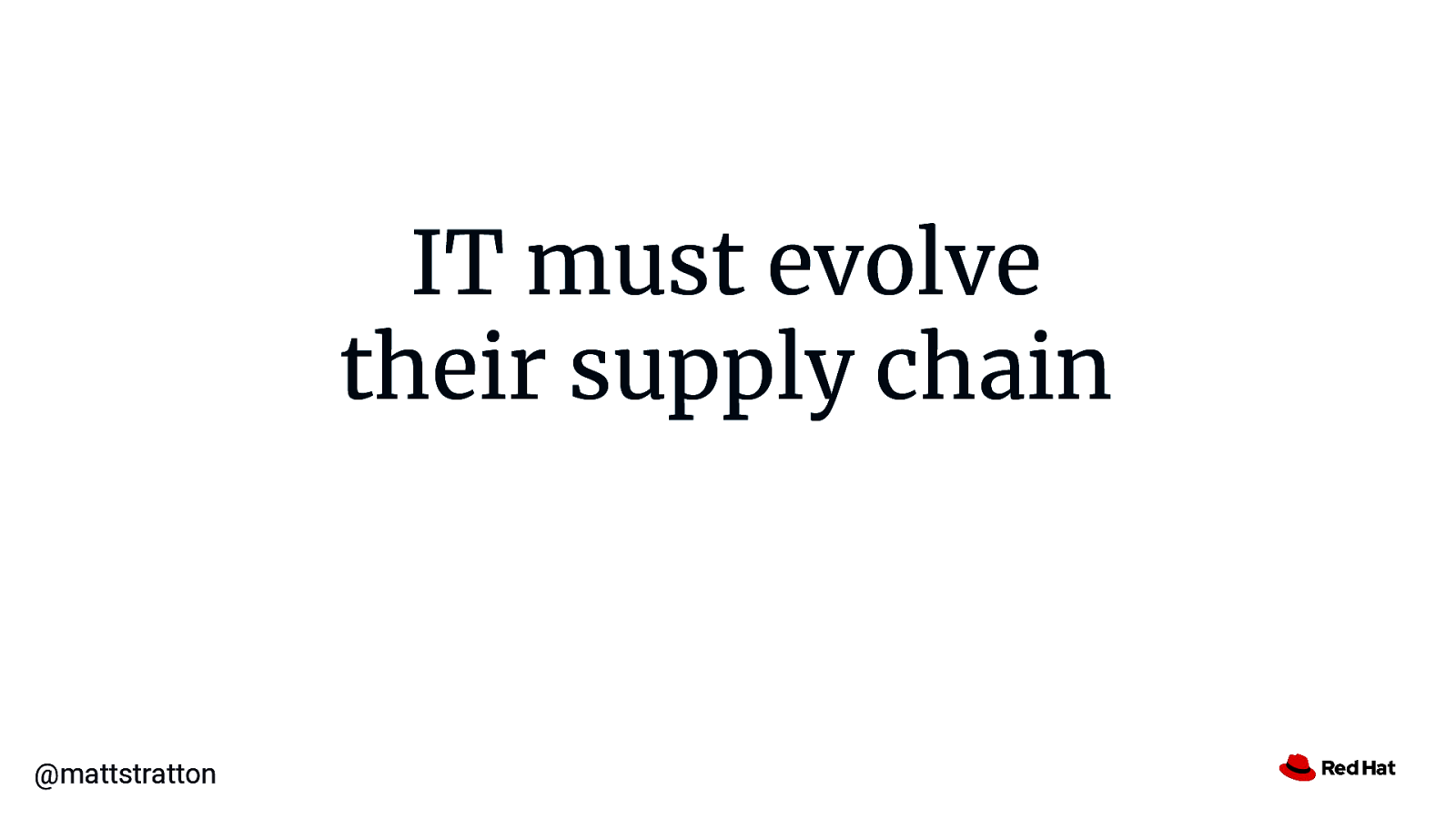
IT must evolve their supply chain @mattstratton
Slide 47
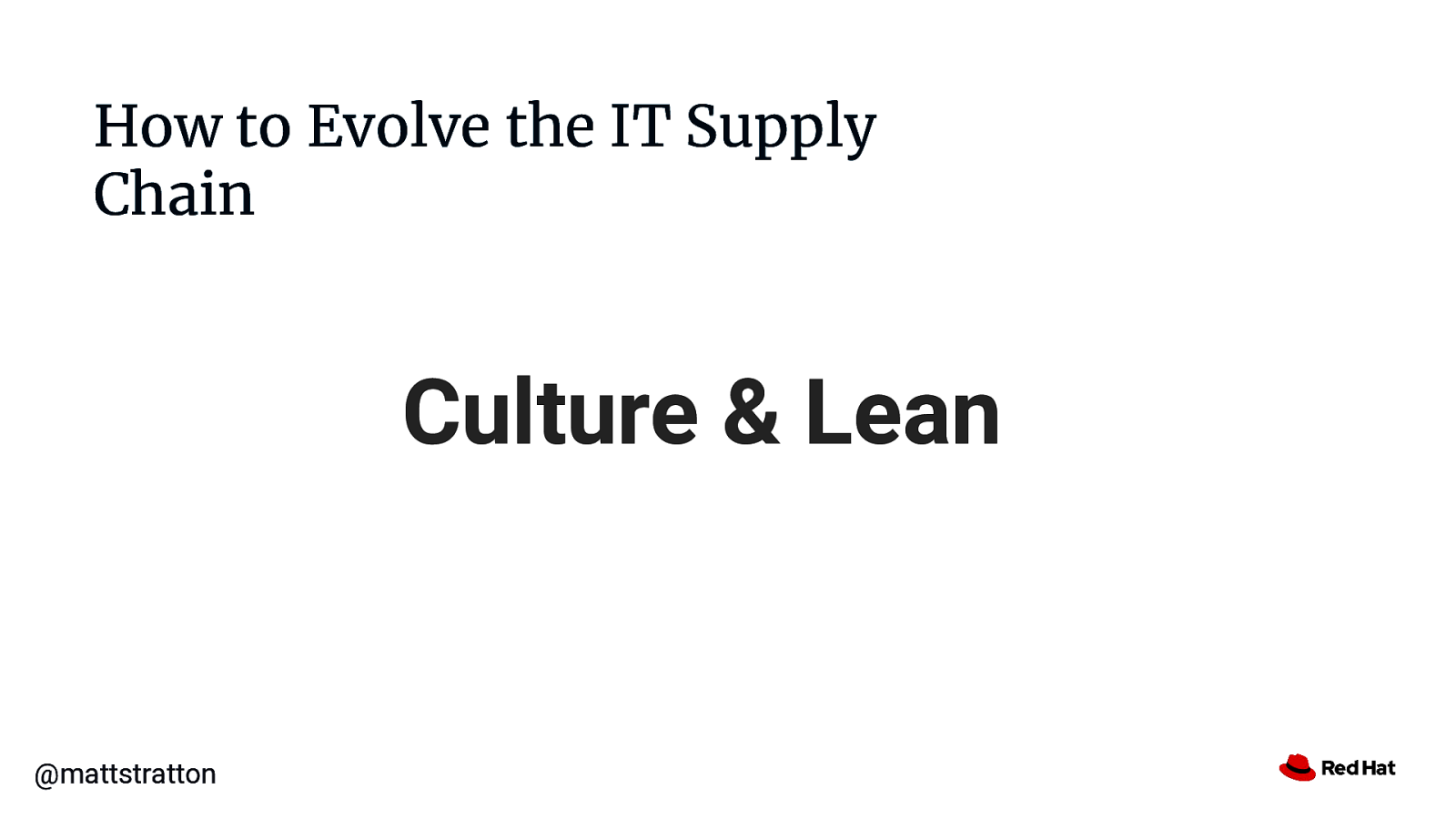
How to Evolve the IT Supply Chain Culture & Lean @mattstratton
Slide 48
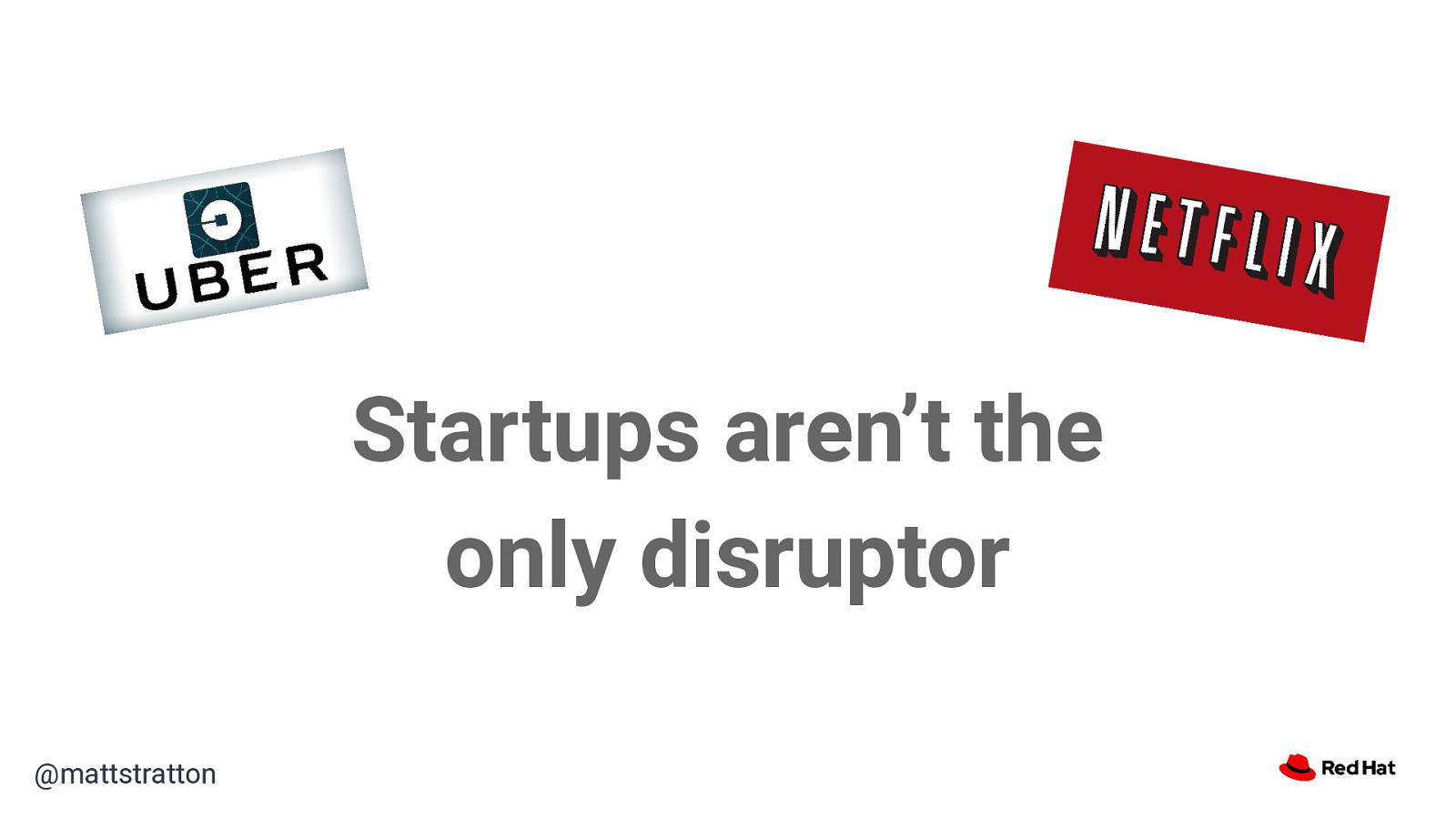
Startups aren’t the only disruptor @mattstratton
Slide 49
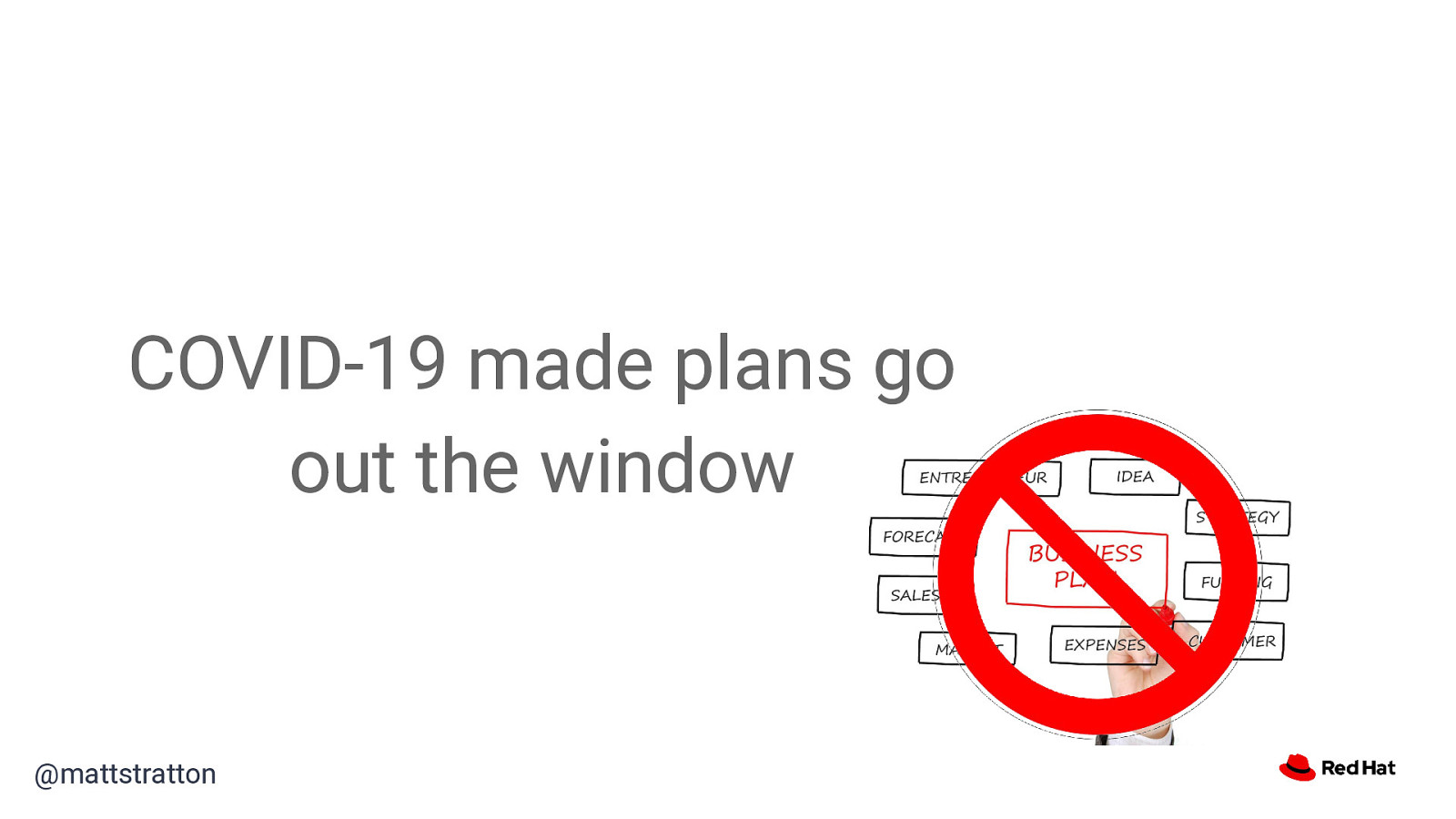
COVID-19 made plans go out the window @mattstratton
Slide 50
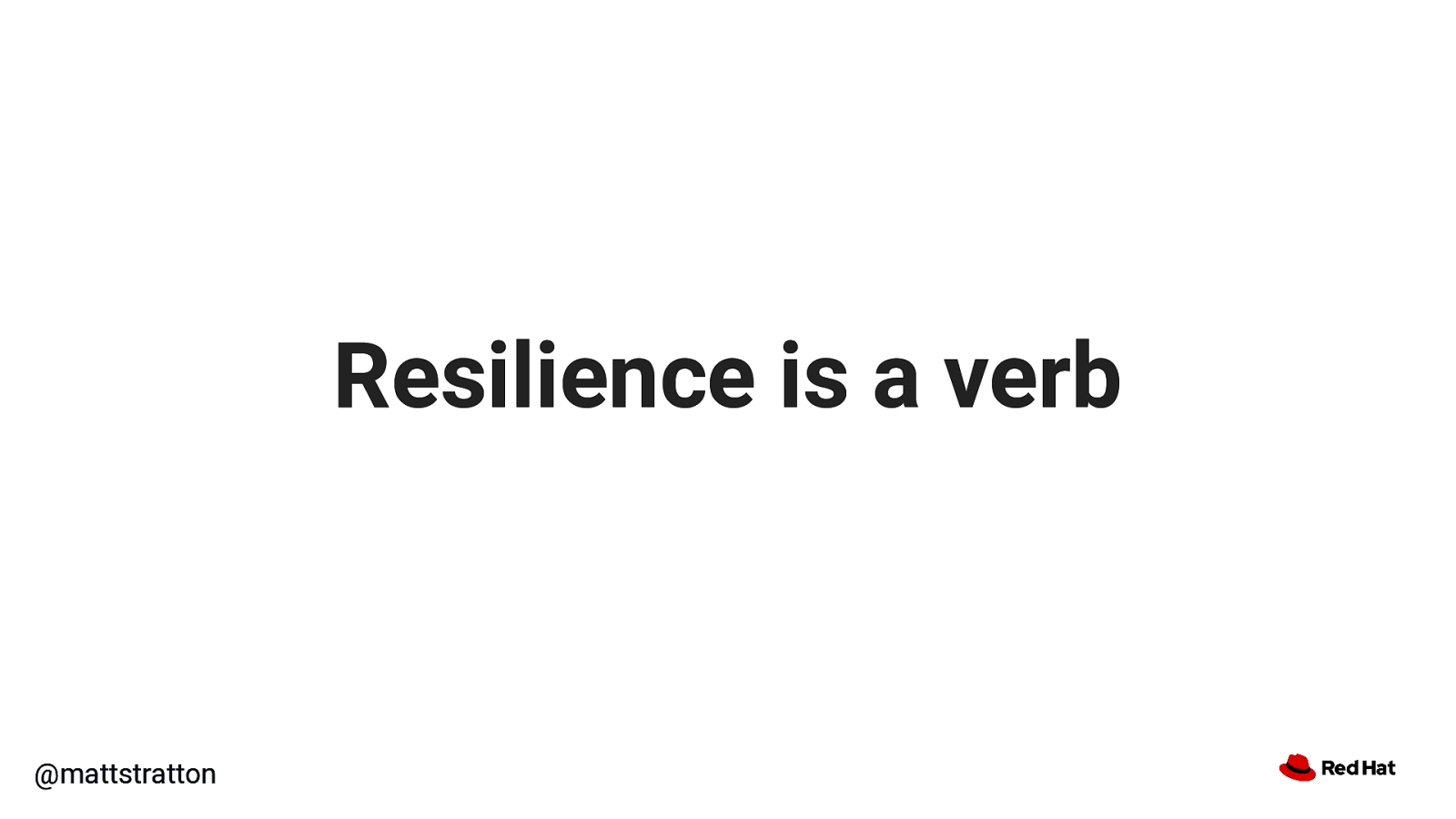
Resilience is a verb @mattstratton
Slide 51
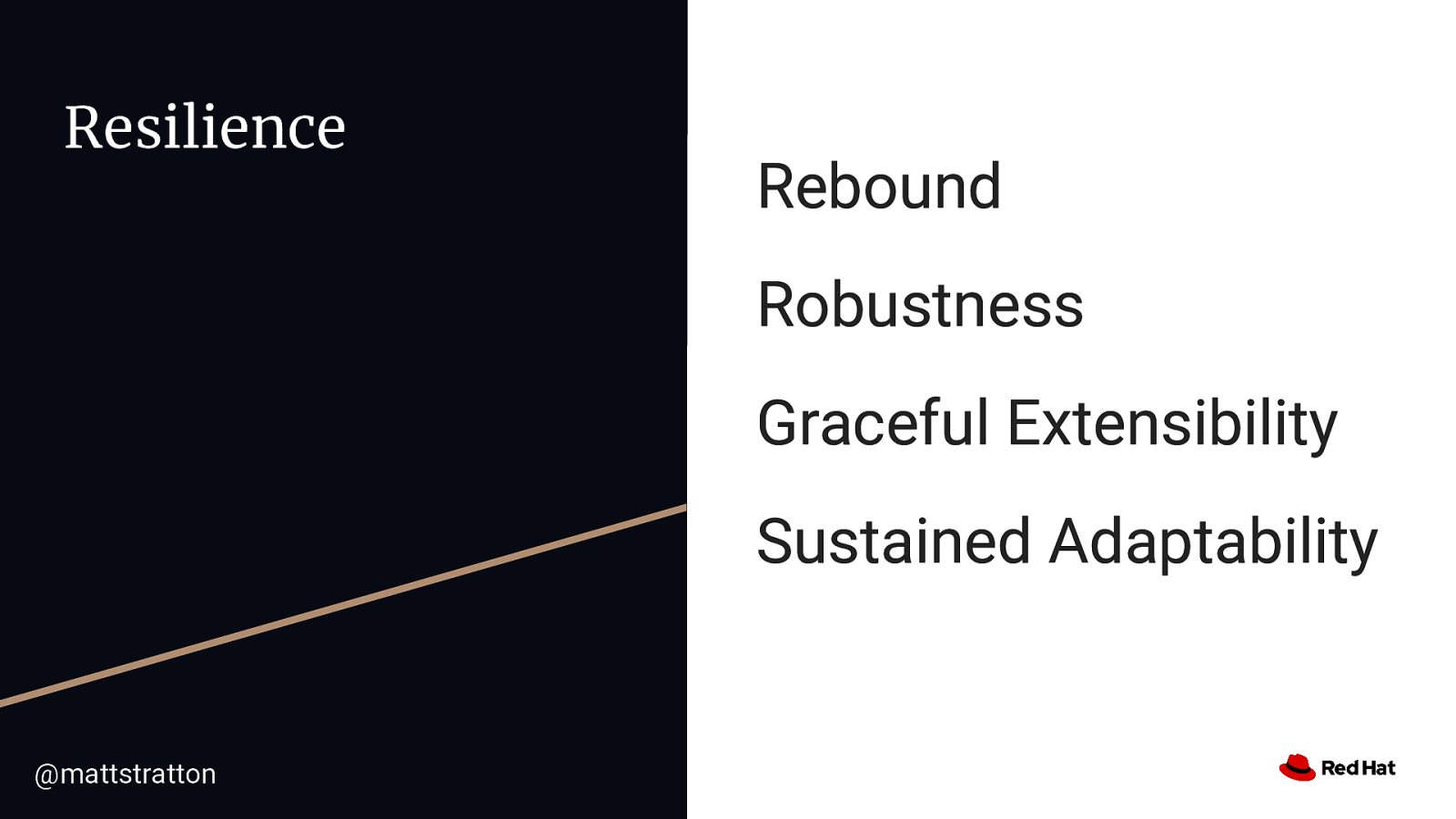
Resilience Rebound Robustness Graceful Extensibility Sustained Adaptability @mattstratton
Slide 52
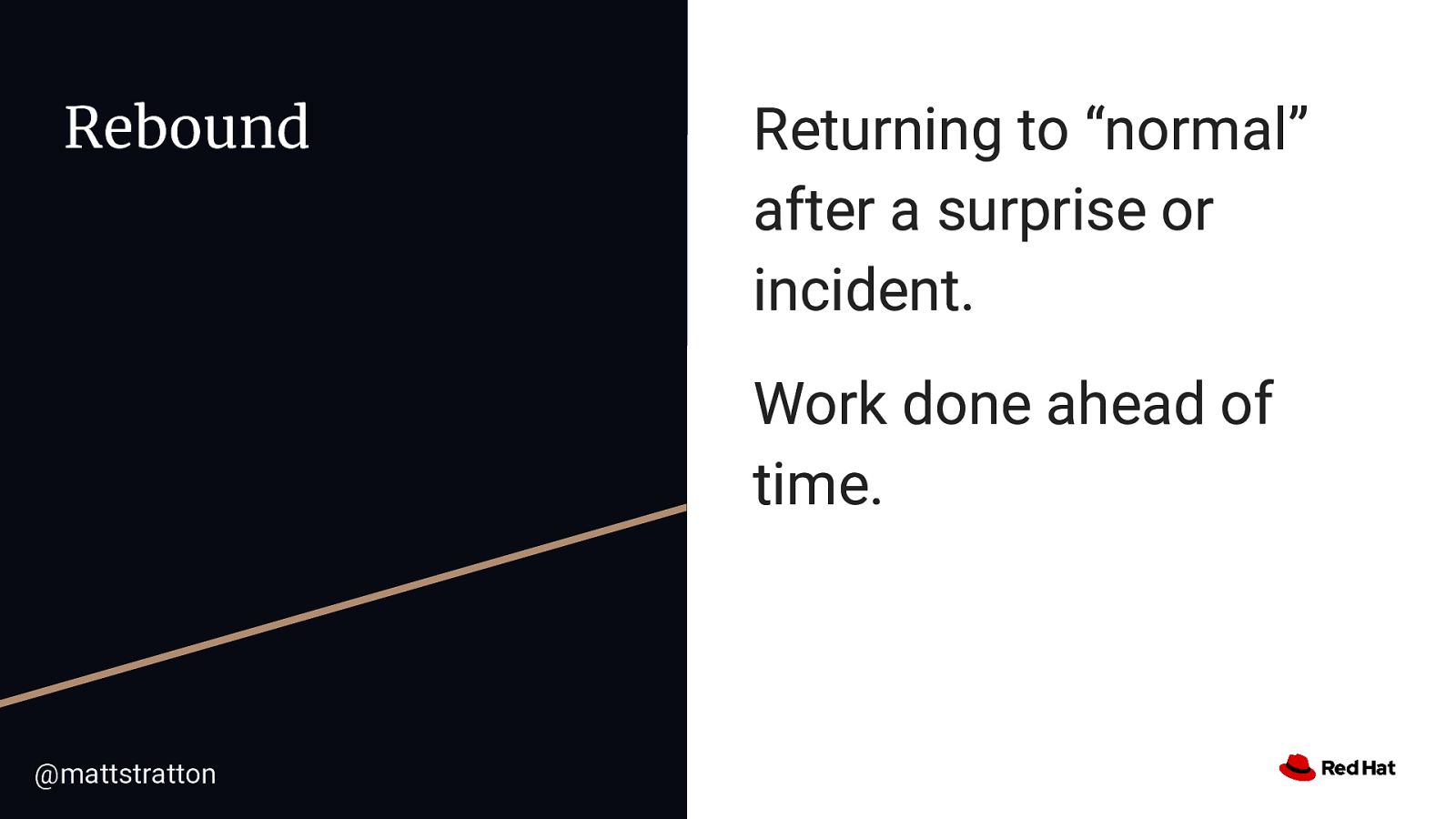
Rebound Returning to “normal” after a surprise or incident. Work done ahead of time. @mattstratton
Slide 53
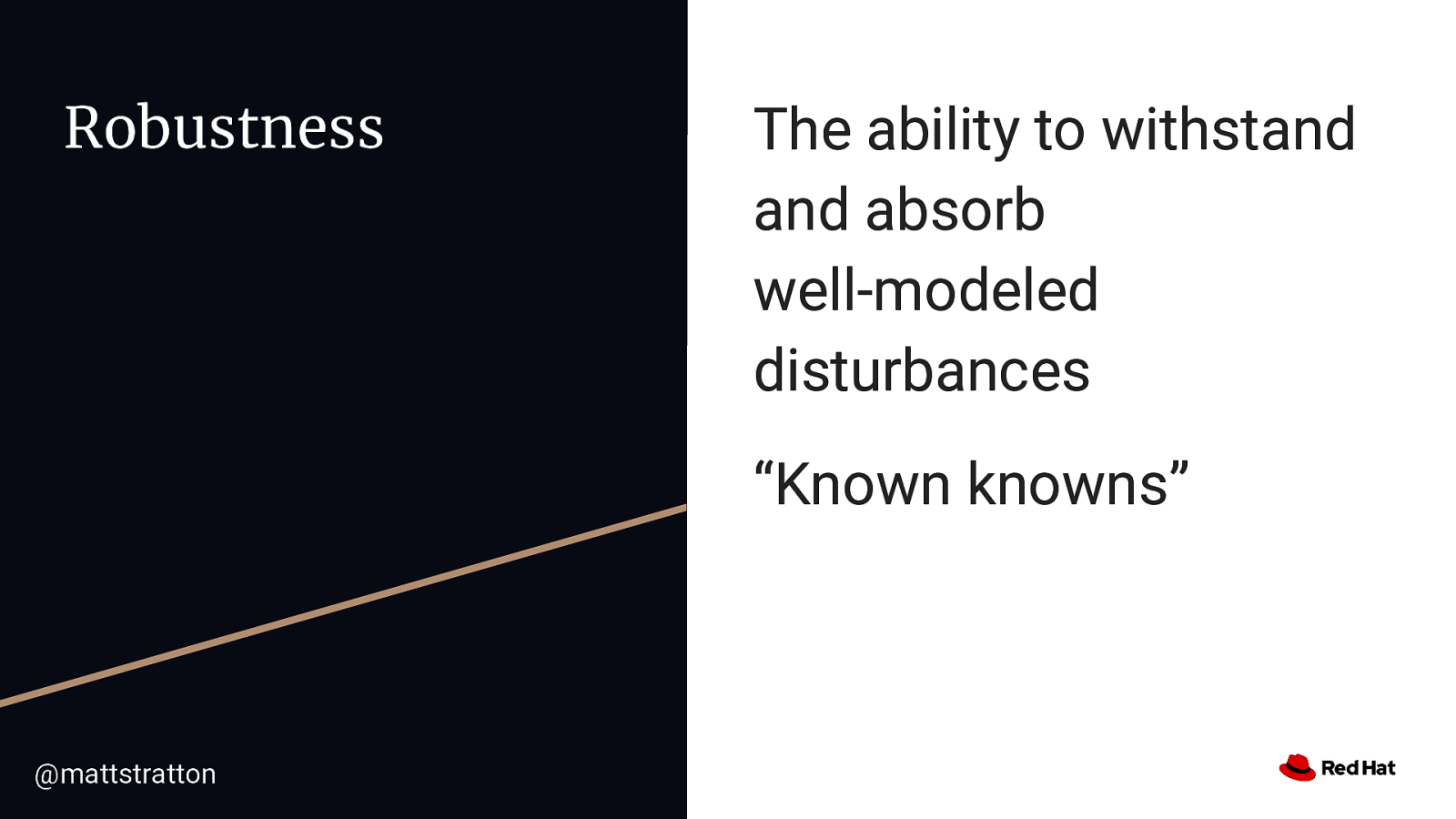
Robustness The ability to withstand and absorb well-modeled disturbances “Known knowns” @mattstratton
Slide 54
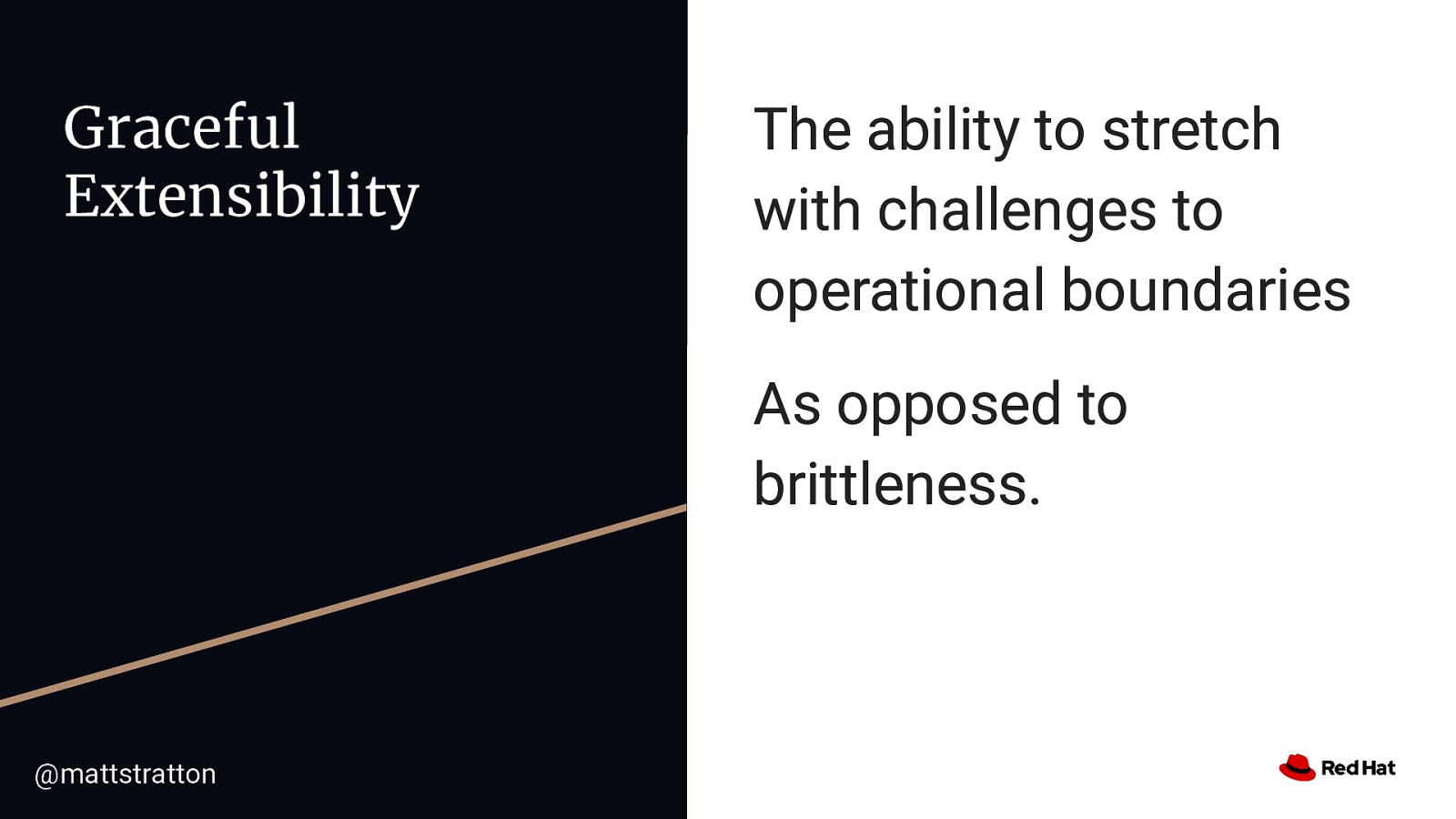
Graceful Extensibility The ability to stretch with challenges to operational boundaries As opposed to brittleness. @mattstratton
Slide 55
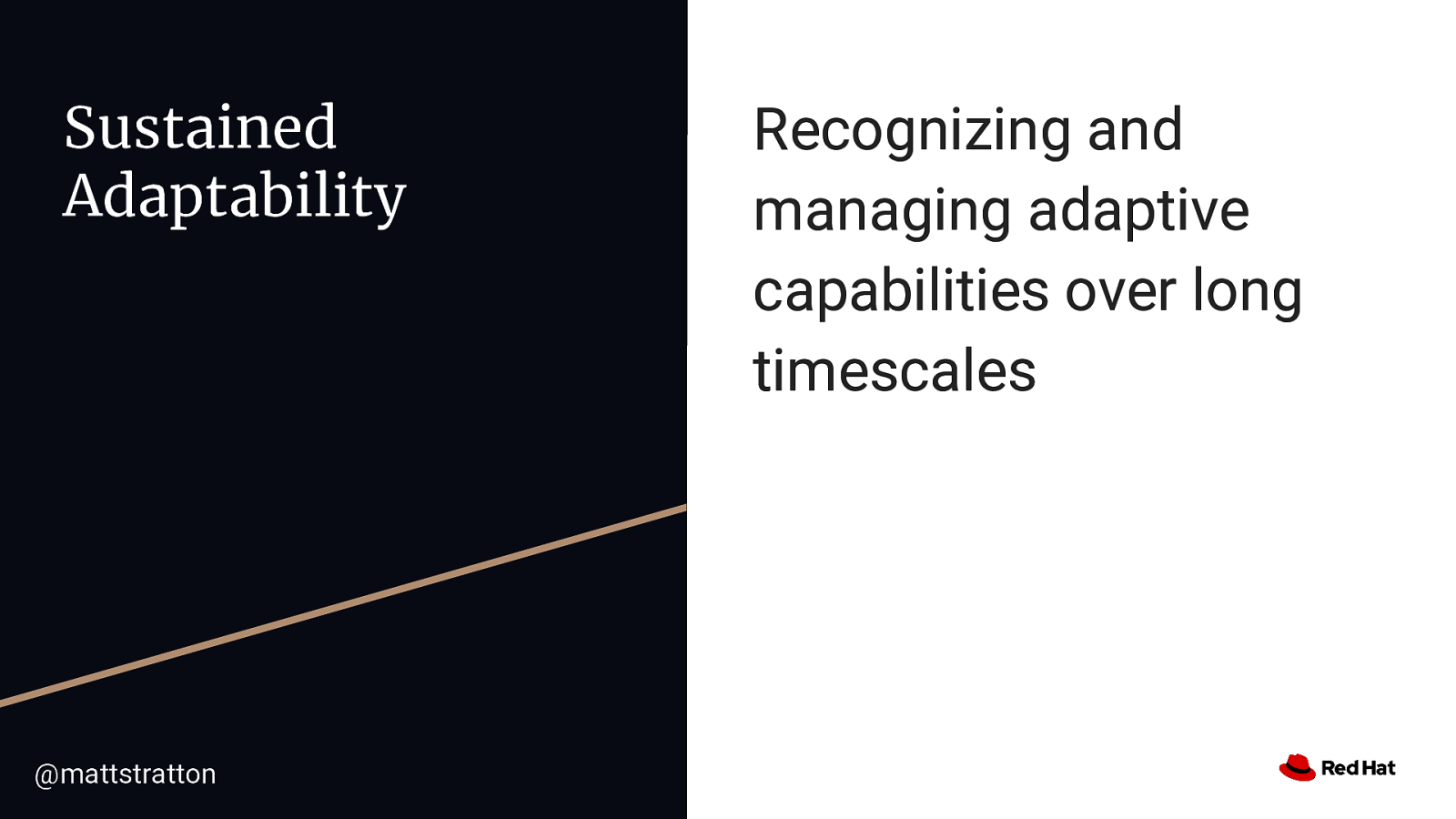
Sustained Adaptability @mattstratton Recognizing and managing adaptive capabilities over long timescales
Slide 56
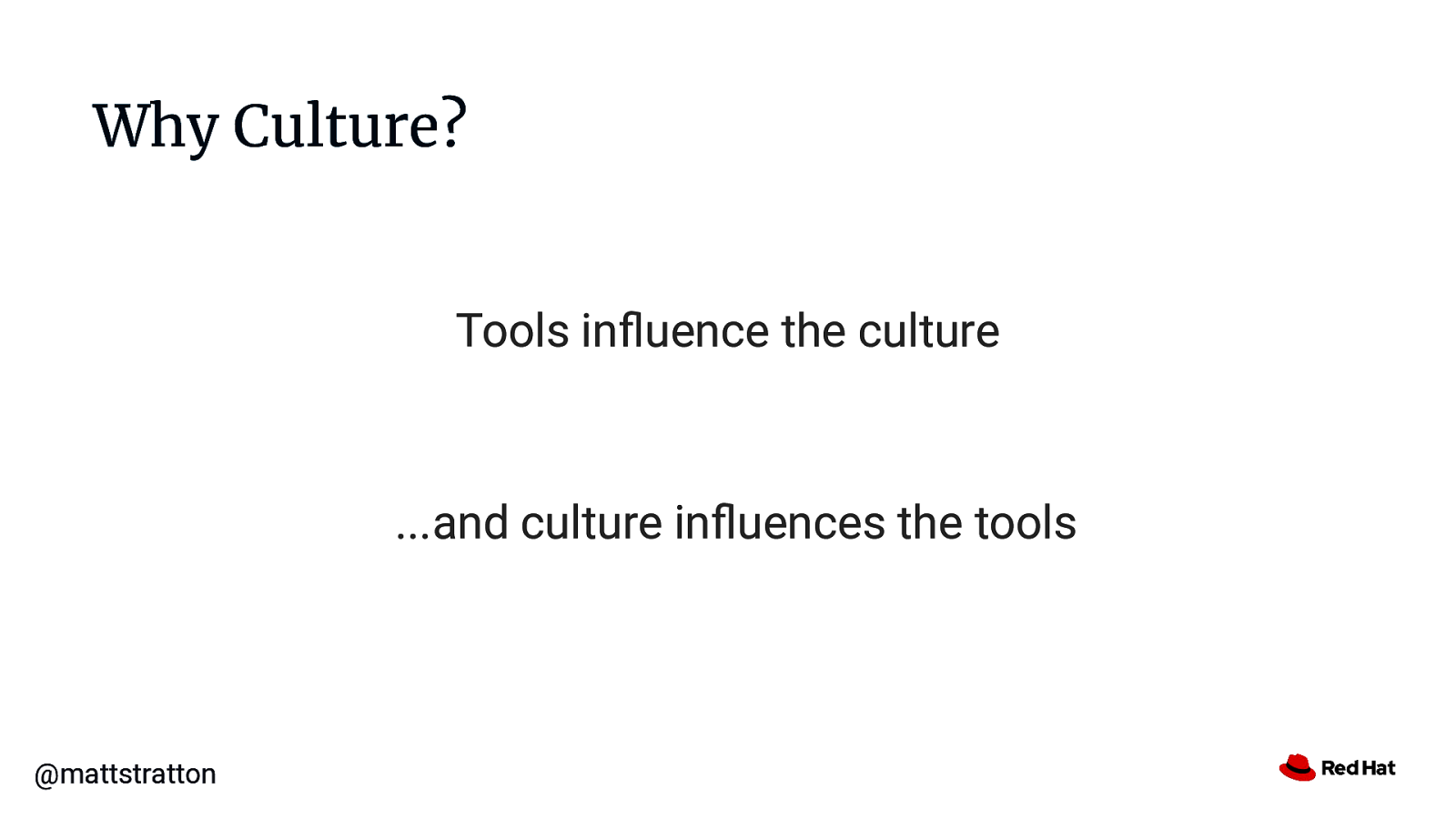
Why Culture? Tools influence the culture …and culture influences the tools @mattstratton
Slide 57
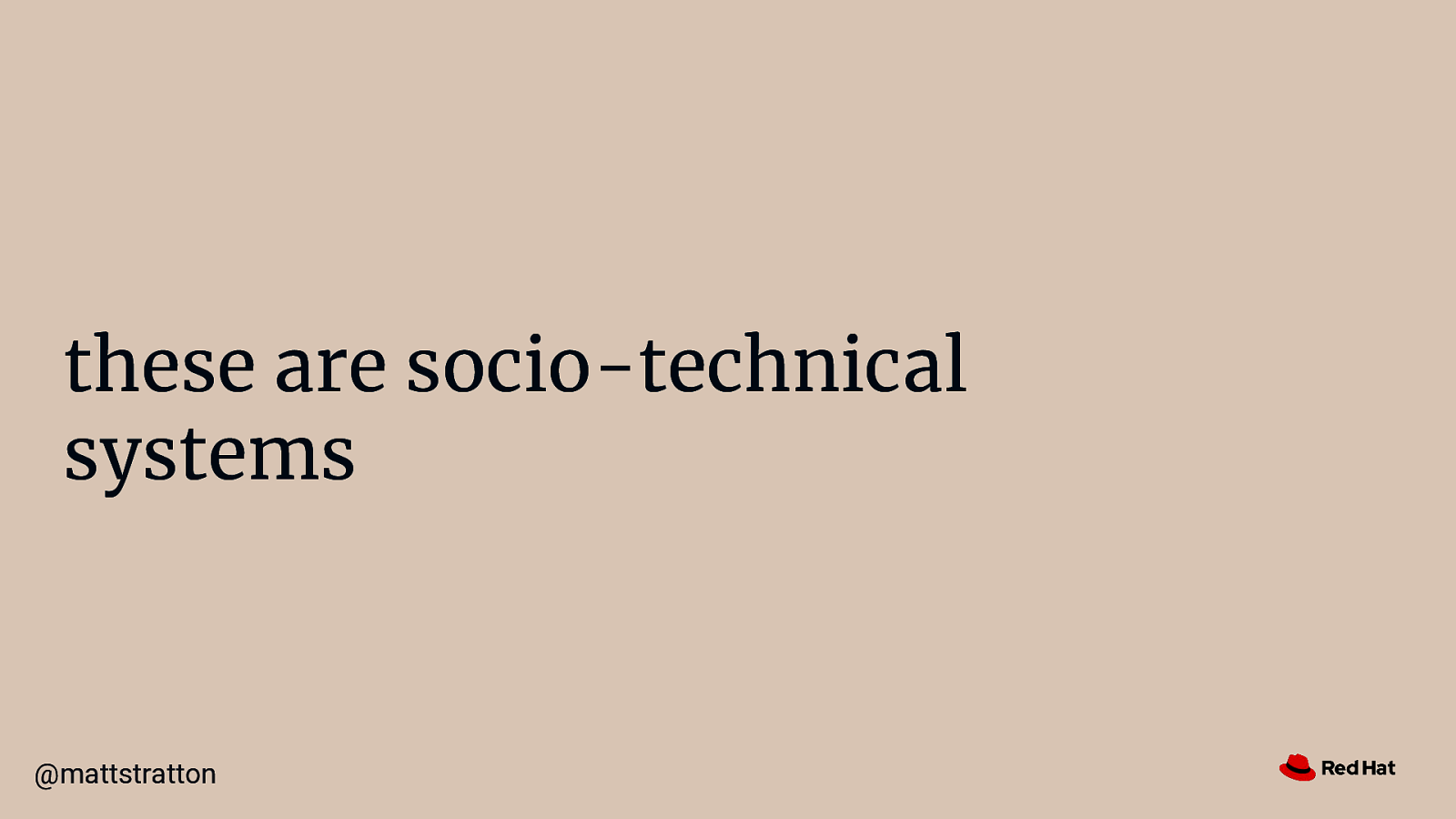
these are socio-technical systems @mattstratton
Slide 58
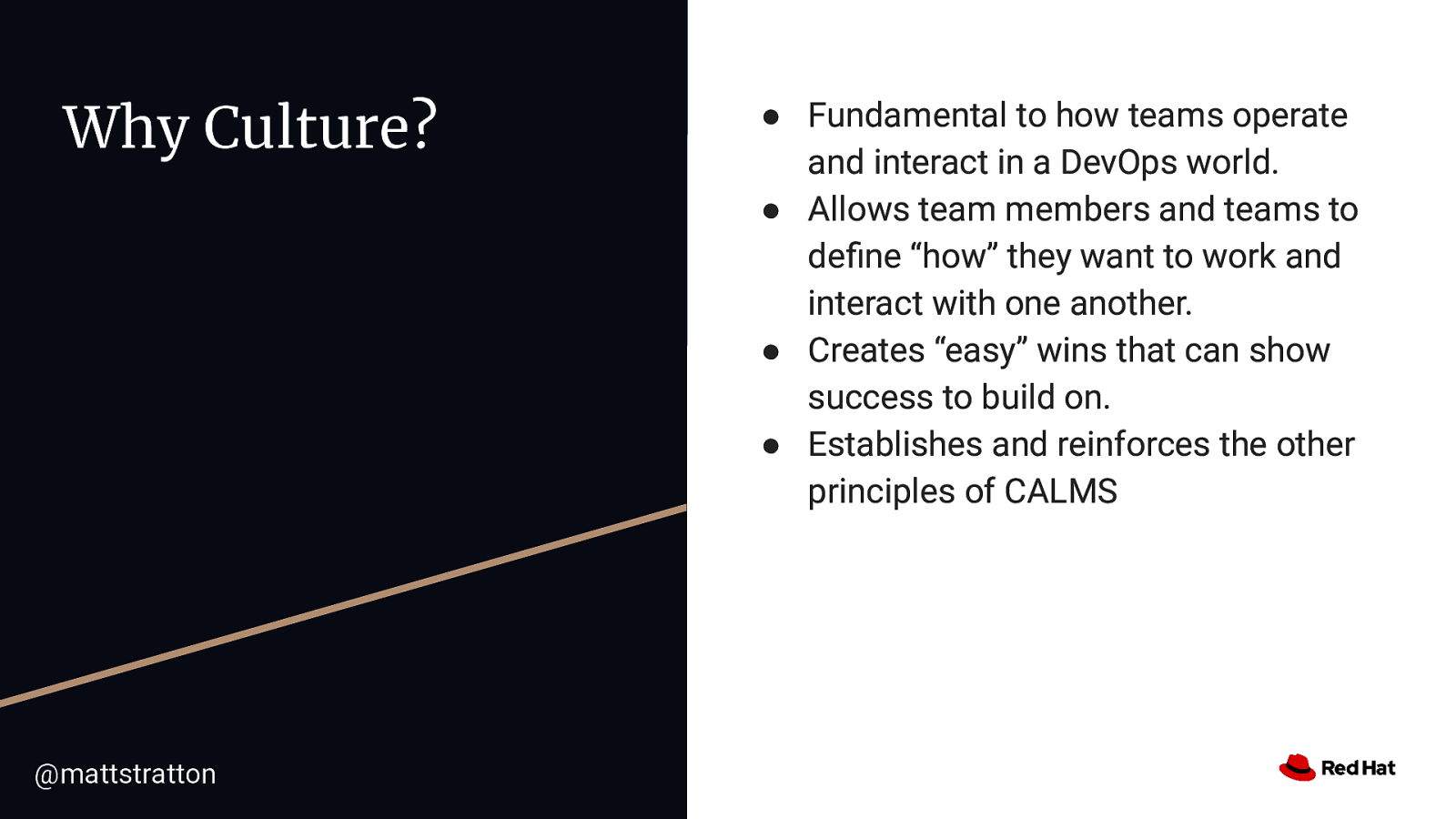
Why Culture? @mattstratton ● Fundamental to how teams operate and interact in a DevOps world. ● Allows team members and teams to define “how” they want to work and interact with one another. ● Creates “easy” wins that can show success to build on. ● Establishes and reinforces the other principles of CALMS
Slide 59
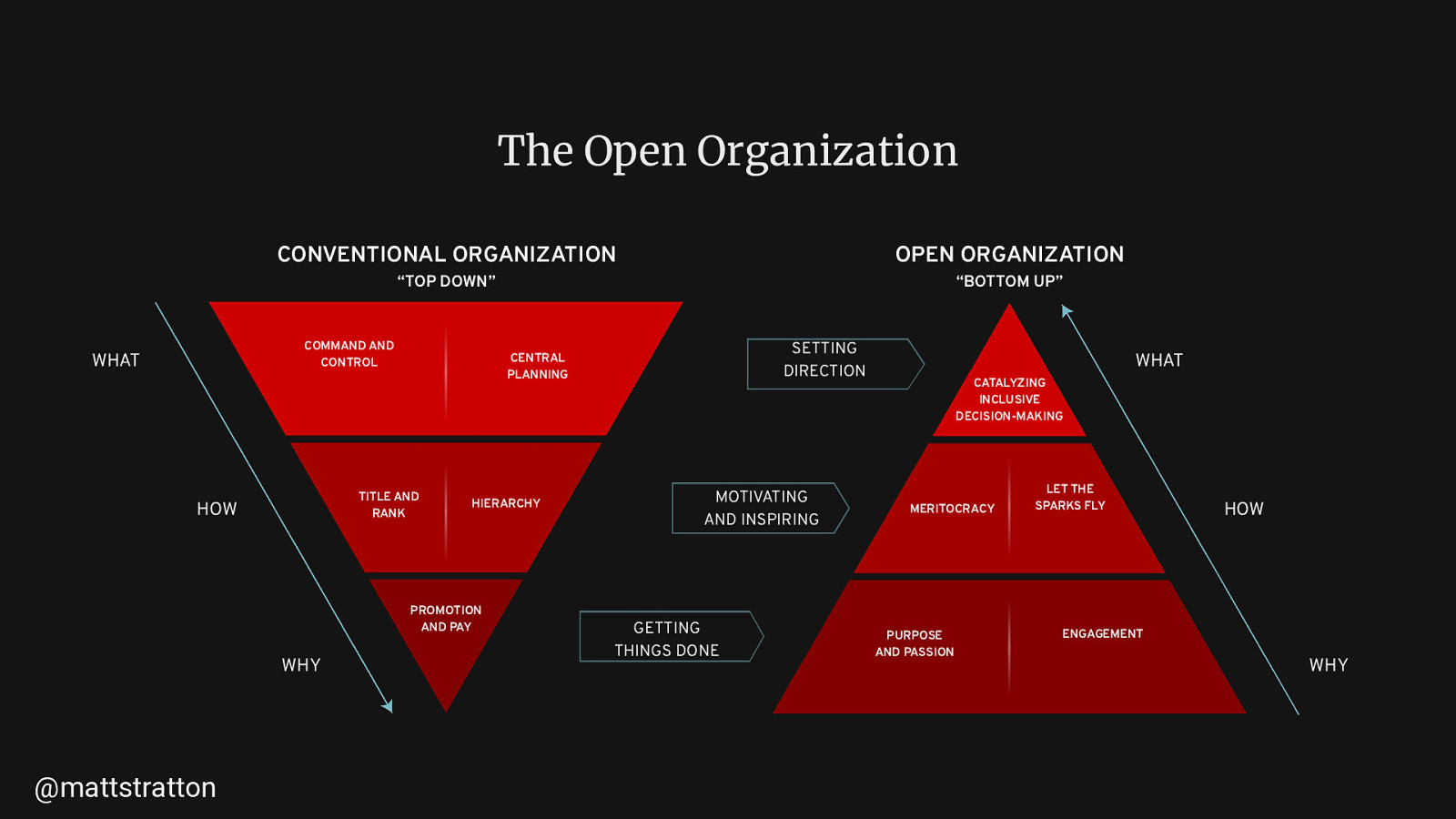
The Open Organization CONVENTIONAL ORGANIZATION OPEN ORGANIZATION “TOP DOWN” “BOTTOM UP” COMMAND AND CONTROL WHAT TITLE AND RANK HOW HIERARCHY PROMOTION AND PAY WHY @mattstratton SETTING DIRECTION CENTRAL PLANNING MOTIVATING AND INSPIRING GETTING THINGS DONE WHAT CATALYZING INCLUSIVE DECISION-MAKING MERITOCRACY PURPOSE AND PASSION LET THE SPARKS FLY HOW ENGAGEMENT WHY
Slide 60
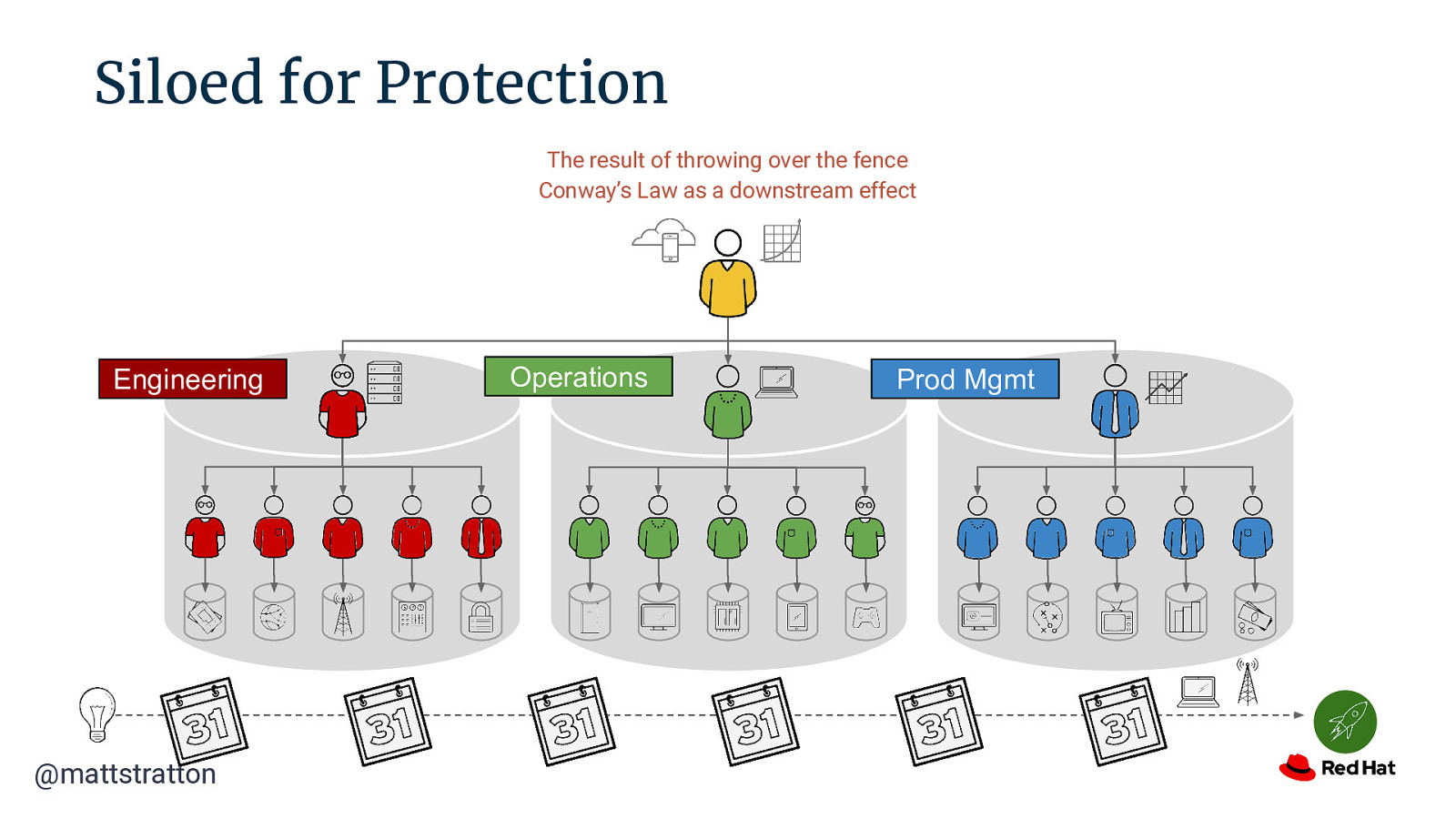
Siloed for Protection The result of throwing over the fence Conway’s Law as a downstream effect Engineering @mattstratton Operations Prod Mgmt
Slide 61
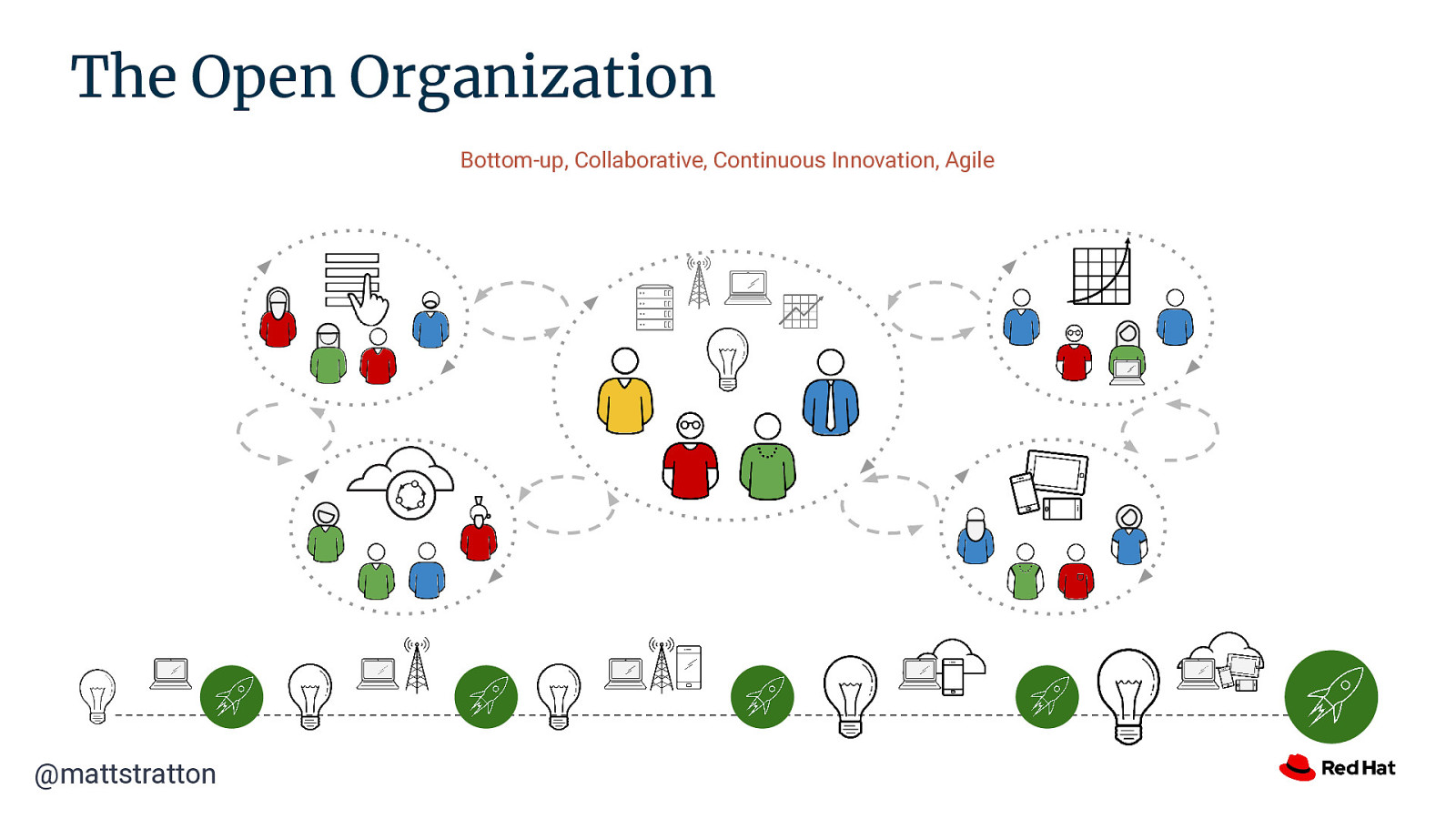
The Open Organization Bottom-up, Collaborative, Continuous Innovation, Agile @mattstratton
Slide 62
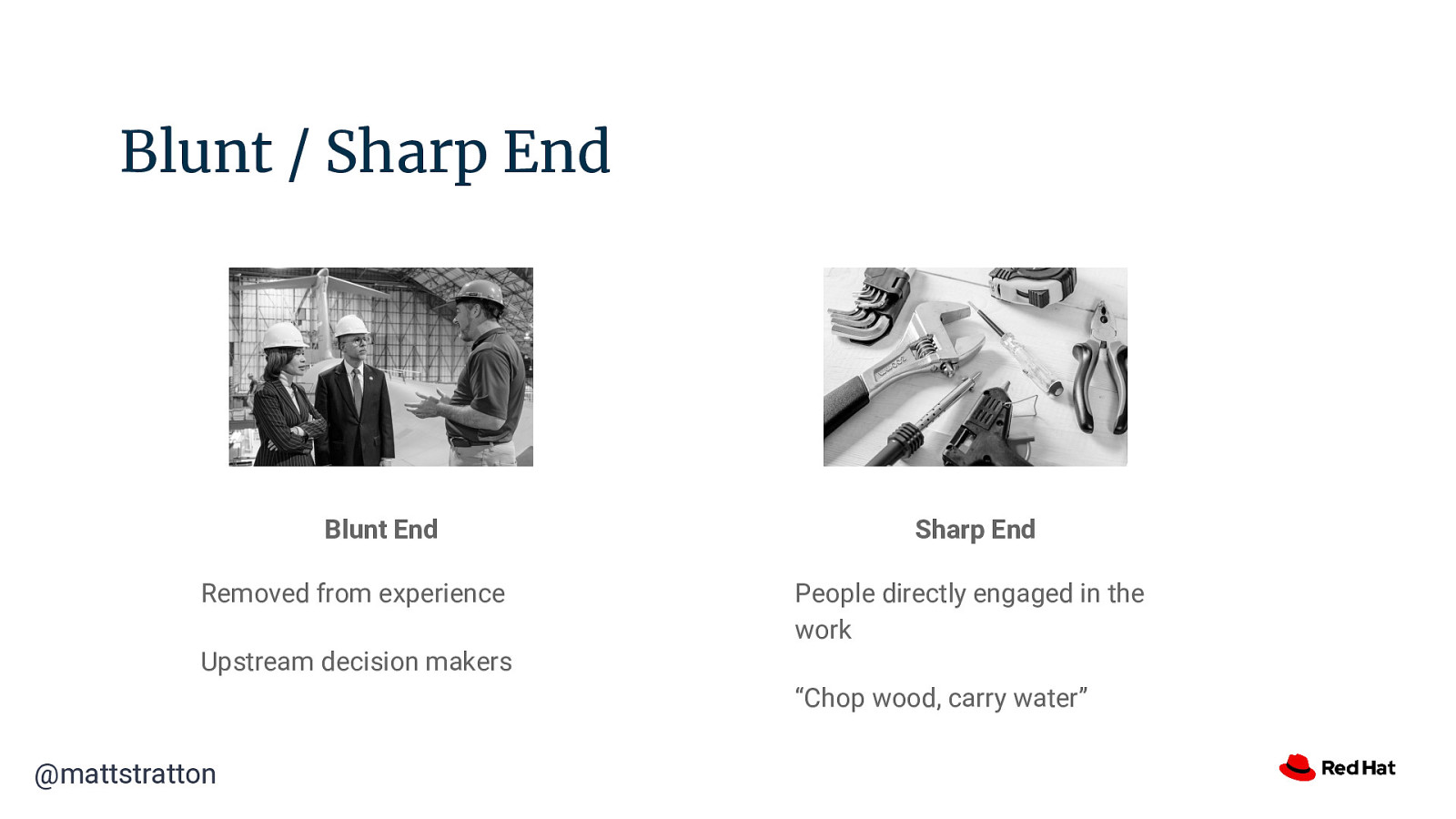
Blunt / Sharp End Blunt End Removed from experience Sharp End People directly engaged in the work Upstream decision makers “Chop wood, carry water” @mattstratton
Slide 63
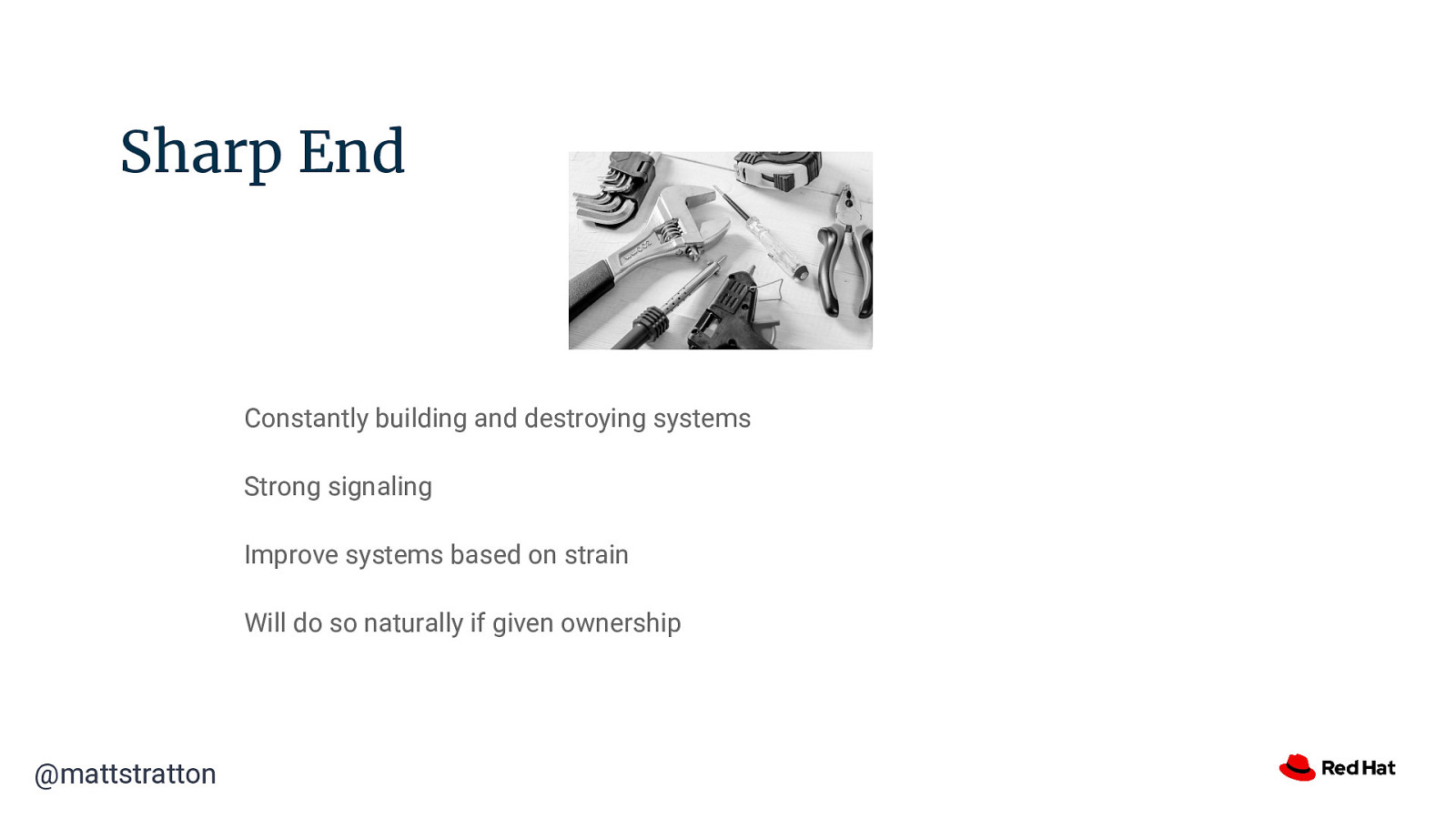
Sharp End Constantly building and destroying systems Strong signaling Improve systems based on strain Will do so naturally if given ownership @mattstratton
Slide 64
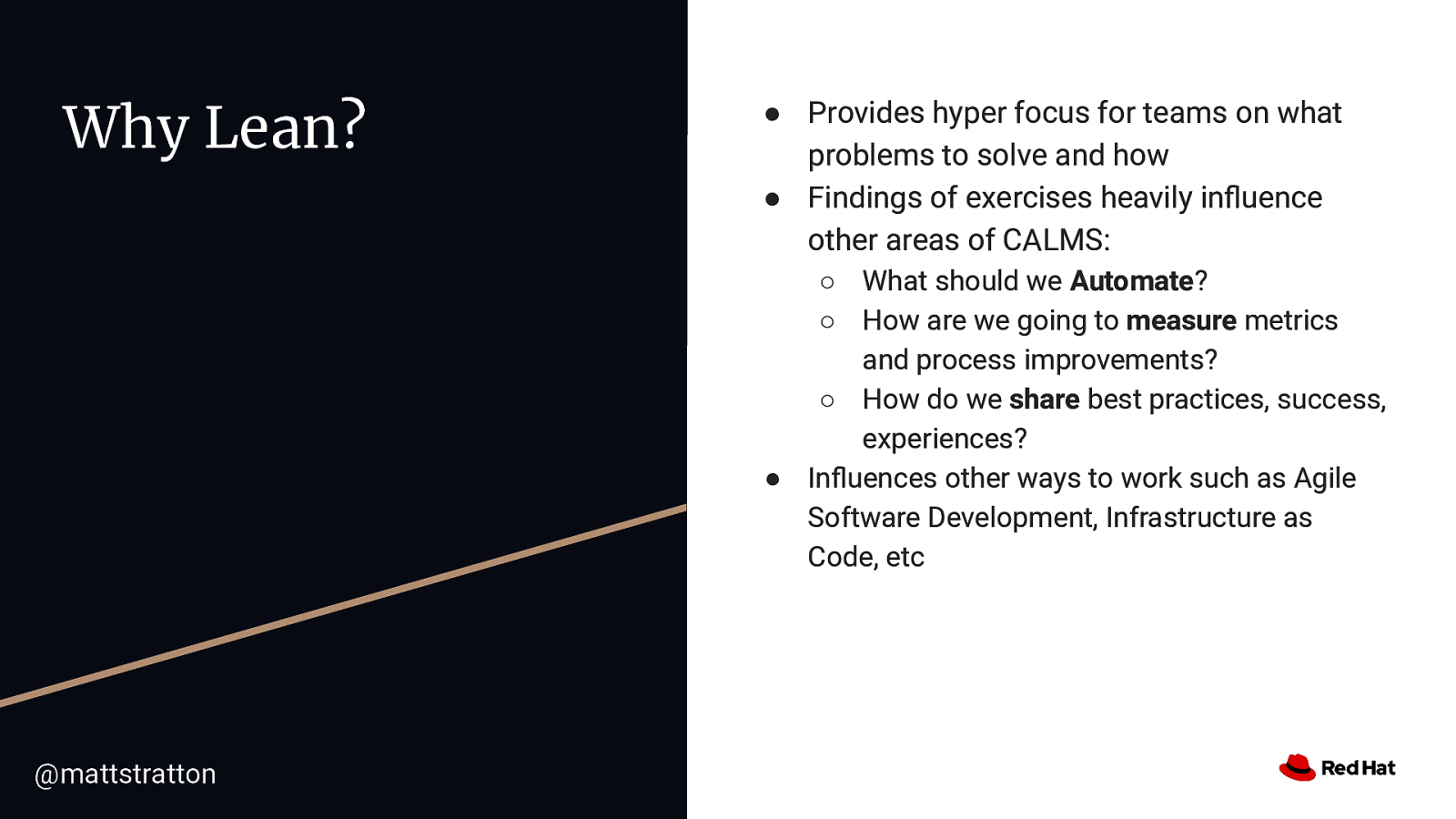
Why Lean? ● Provides hyper focus for teams on what problems to solve and how ● Findings of exercises heavily influence other areas of CALMS: ○ What should we Automate? ○ How are we going to measure metrics and process improvements? ○ How do we share best practices, success, experiences? ● Influences other ways to work such as Agile Software Development, Infrastructure as Code, etc @mattstratton
Slide 65
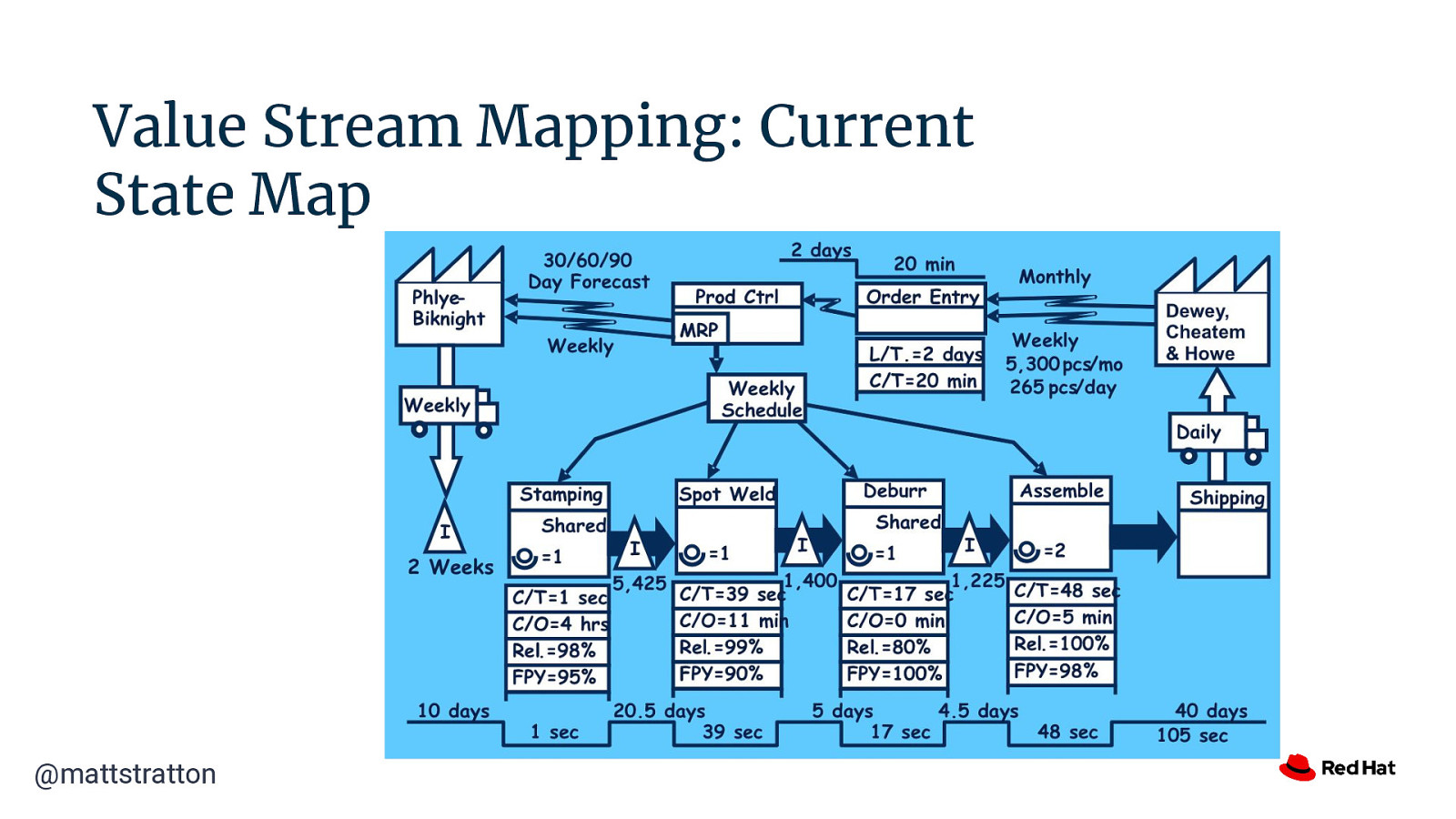
Value Stream Mapping: Current State Map @mattstratton
Slide 66
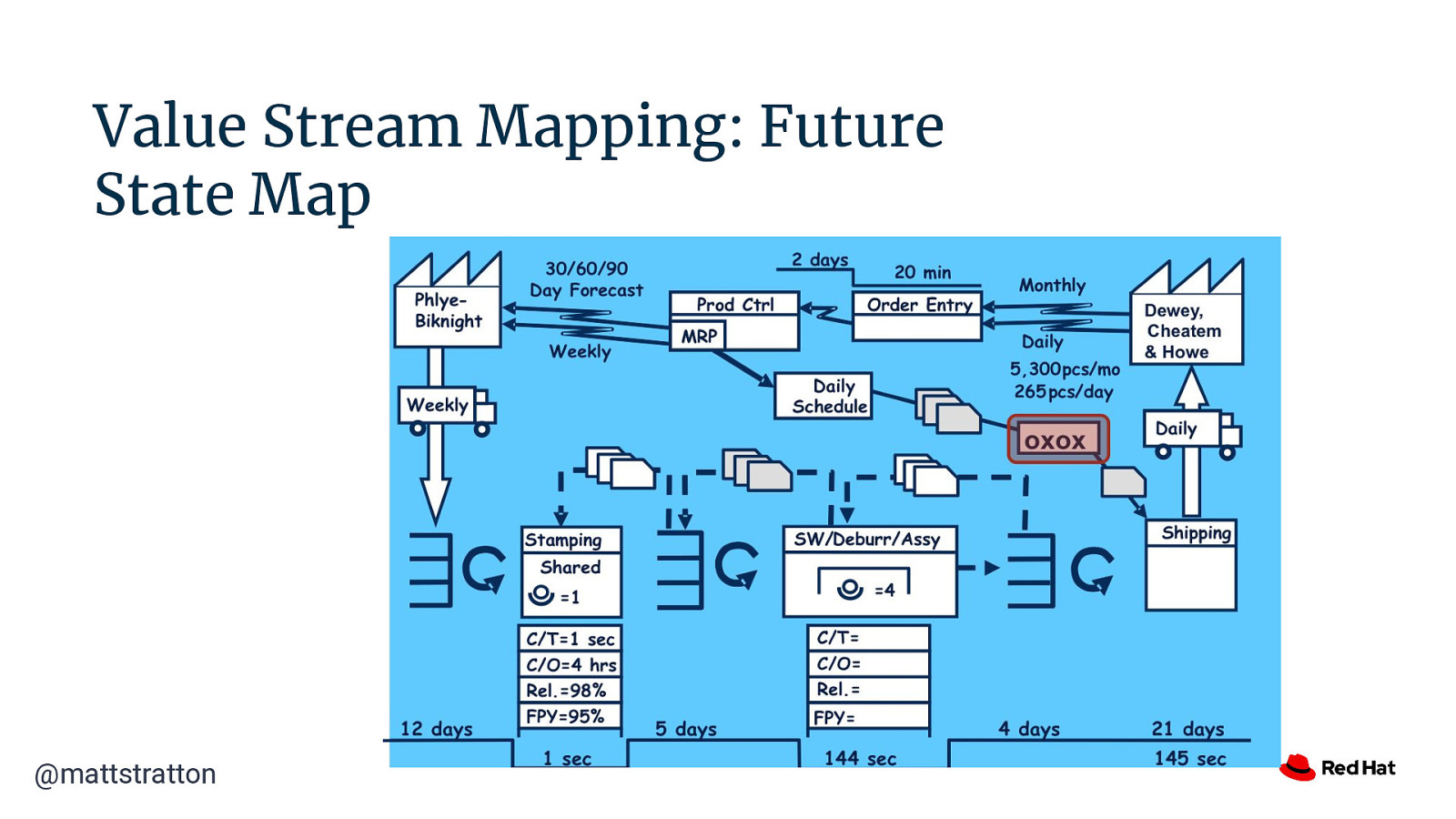
Value Stream Mapping: Future State Map @mattstratton
Slide 67
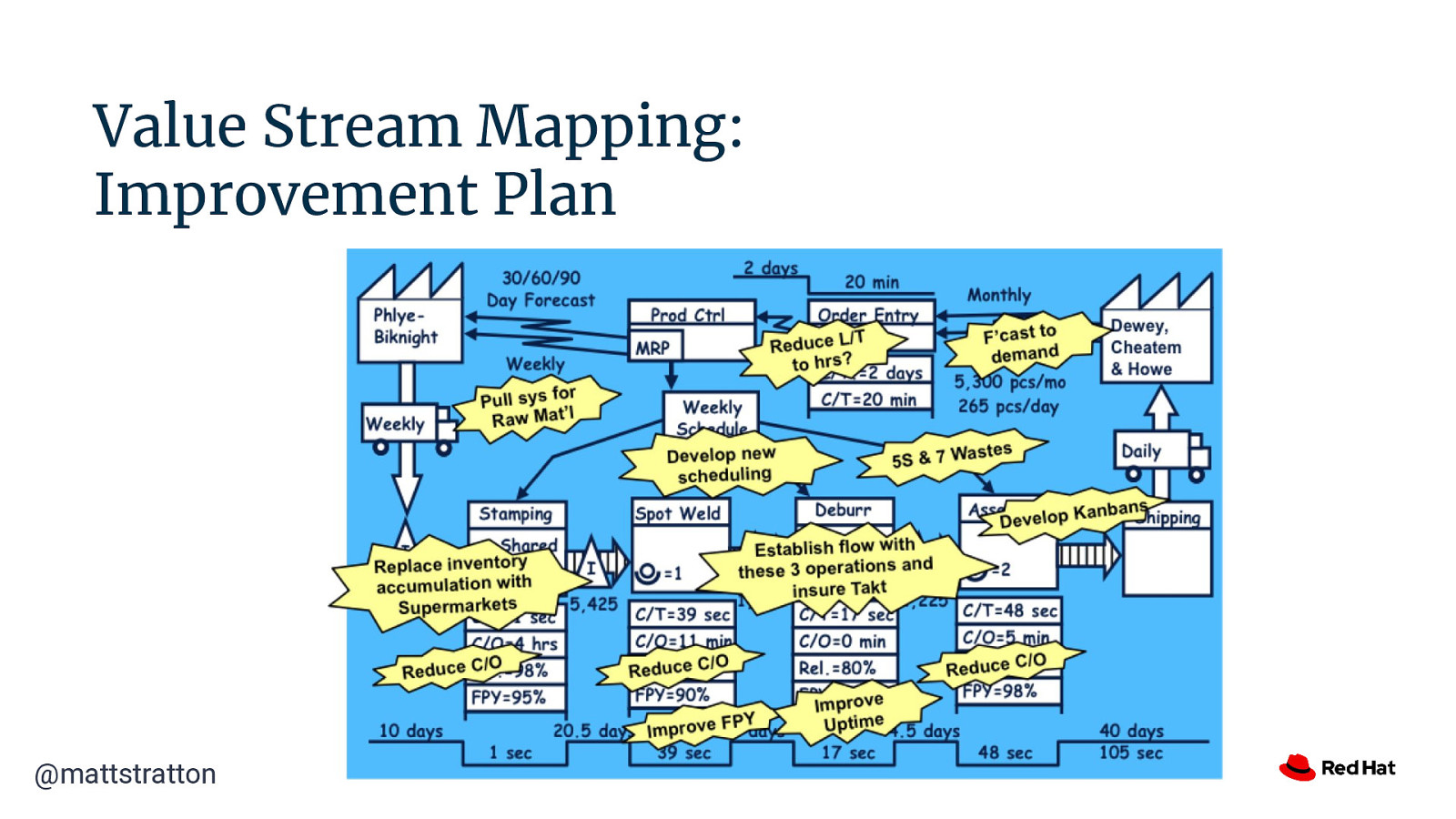
Value Stream Mapping: Improvement Plan @mattstratton
Slide 68
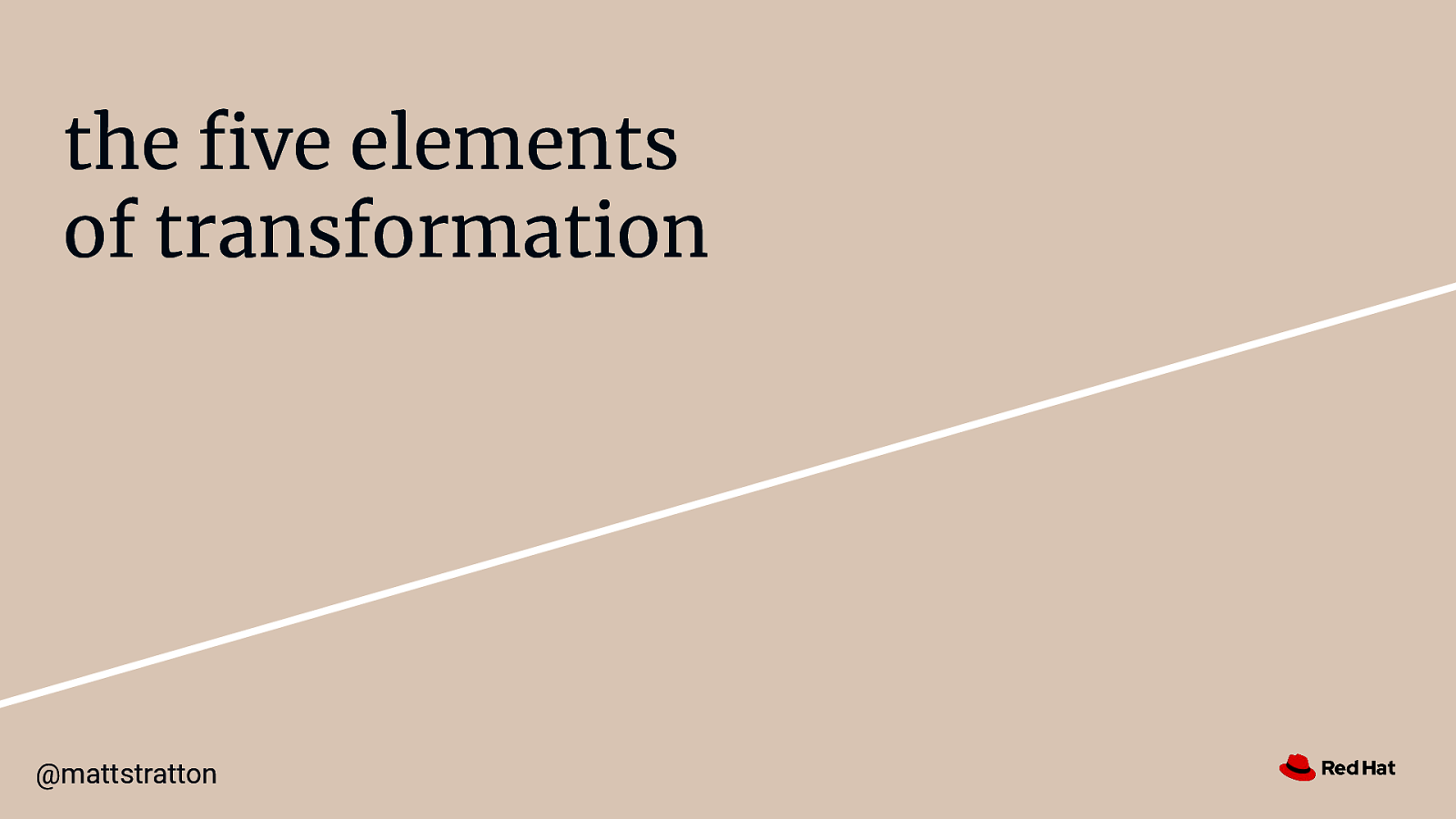
the five elements of transformation @mattstratton
Slide 69
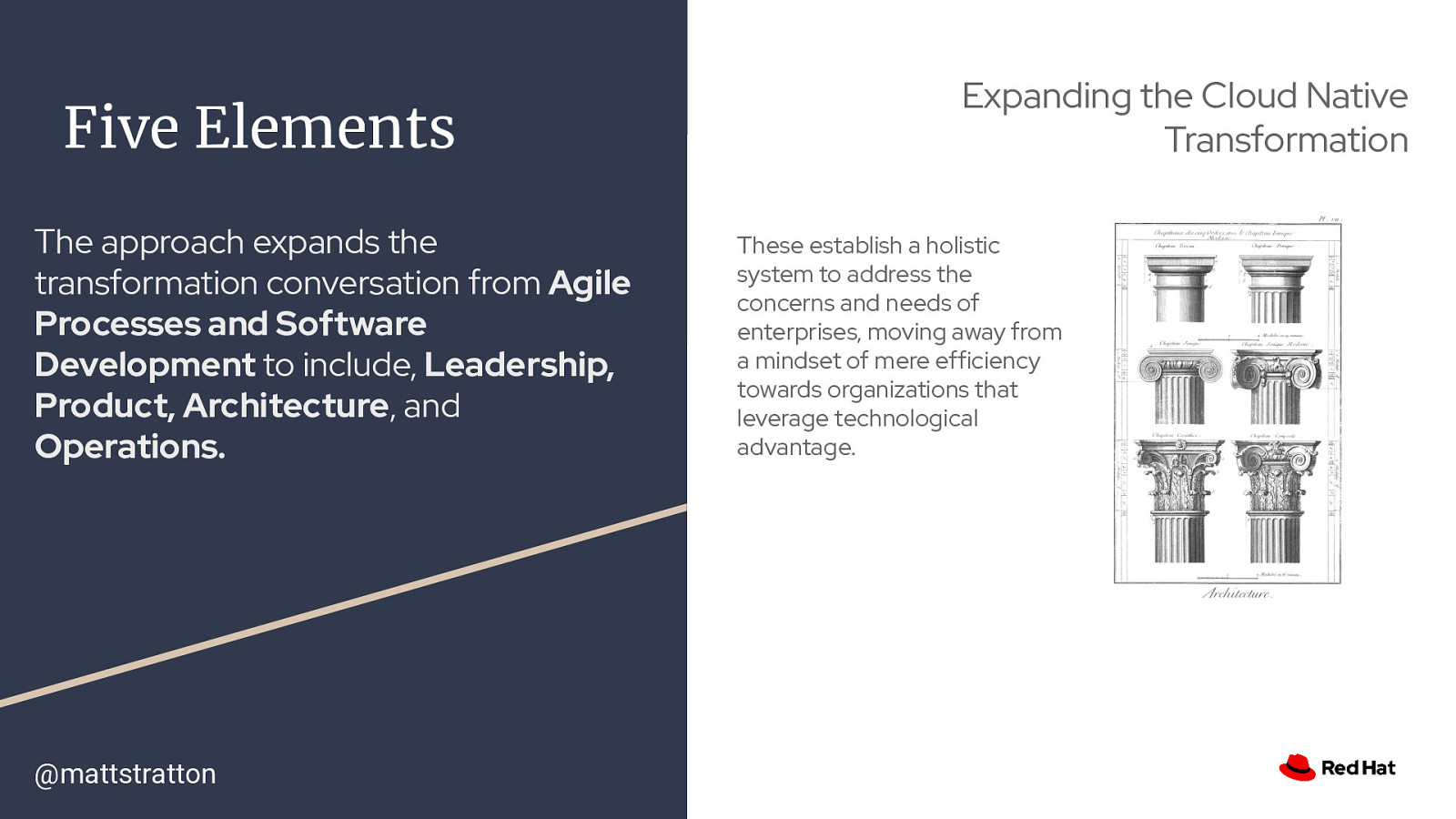
Five Elements The approach expands the transformation conversation from Agile Processes and Software Development to include, Leadership, Product, Architecture, and Operations. @mattstratton Expanding the Cloud Native Transformation These establish a holistic system to address the concerns and needs of enterprises, moving away from a mindset of mere efficiency towards organizations that leverage technological advantage.
Slide 70
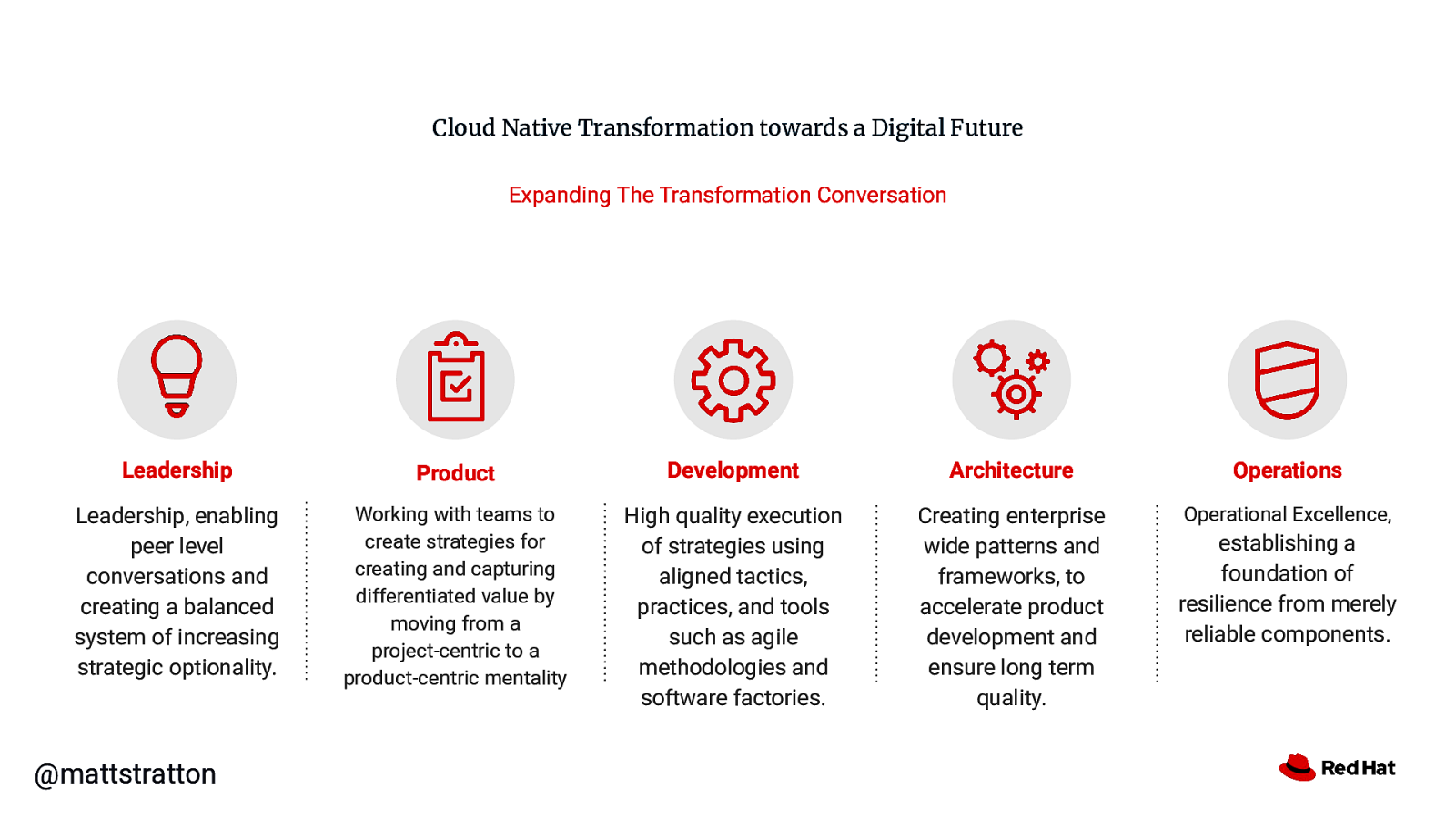
Cloud Native Transformation towards a Digital Future Expanding The Transformation Conversation Leadership Product Development Architecture Operations Leadership, enabling peer level conversations and creating a balanced system of increasing strategic optionality. Working with teams to create strategies for creating and capturing differentiated value by moving from a project-centric to a product-centric mentality High quality execution of strategies using aligned tactics, practices, and tools such as agile methodologies and software factories. Creating enterprise wide patterns and frameworks, to accelerate product development and ensure long term quality. Operational Excellence, @mattstratton establishing a foundation of resilience from merely reliable components.
Slide 71
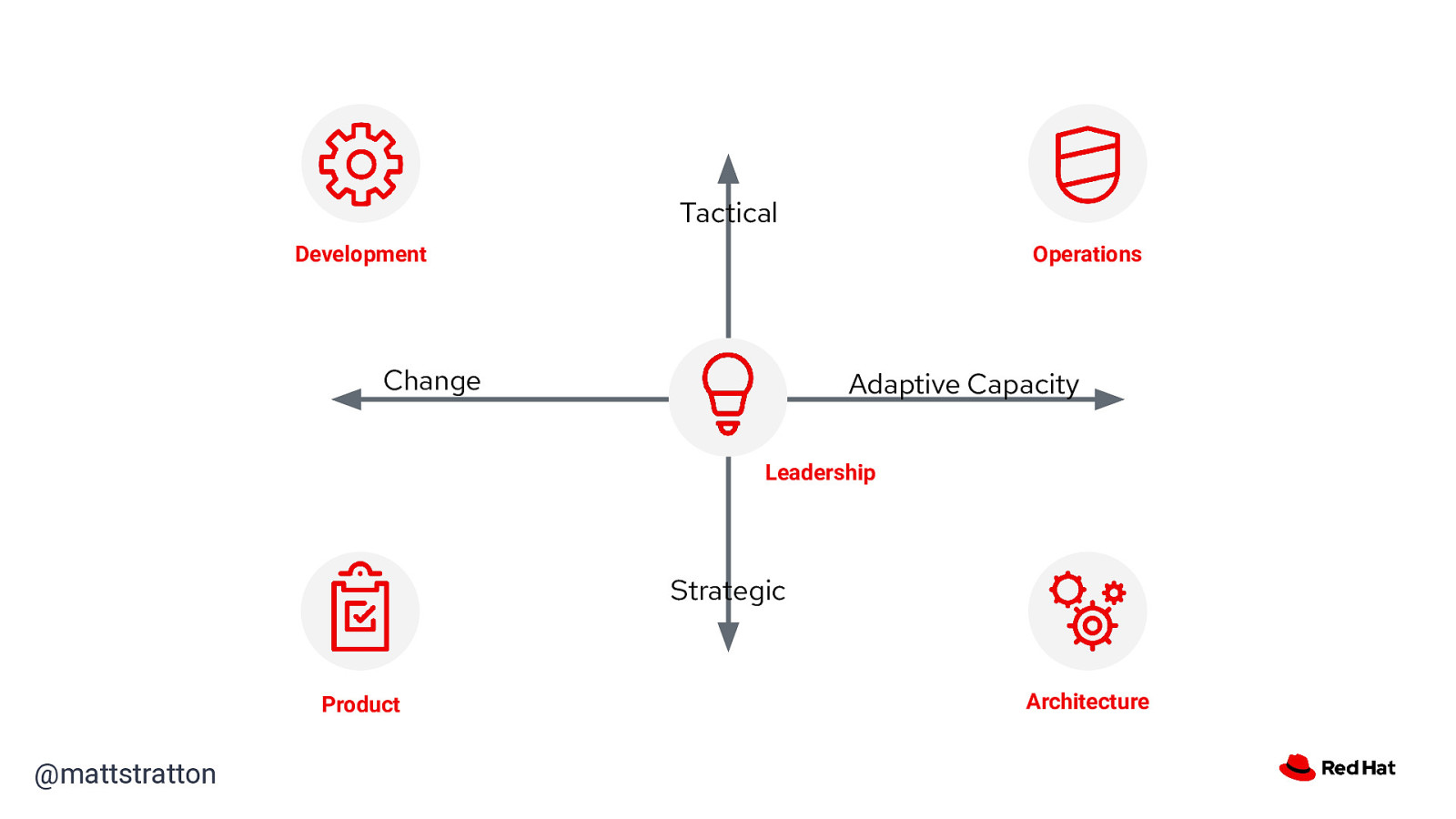
Tactical Development Operations Change Adaptive Capacity Leadership Strategic Product @mattstratton Architecture
Slide 72
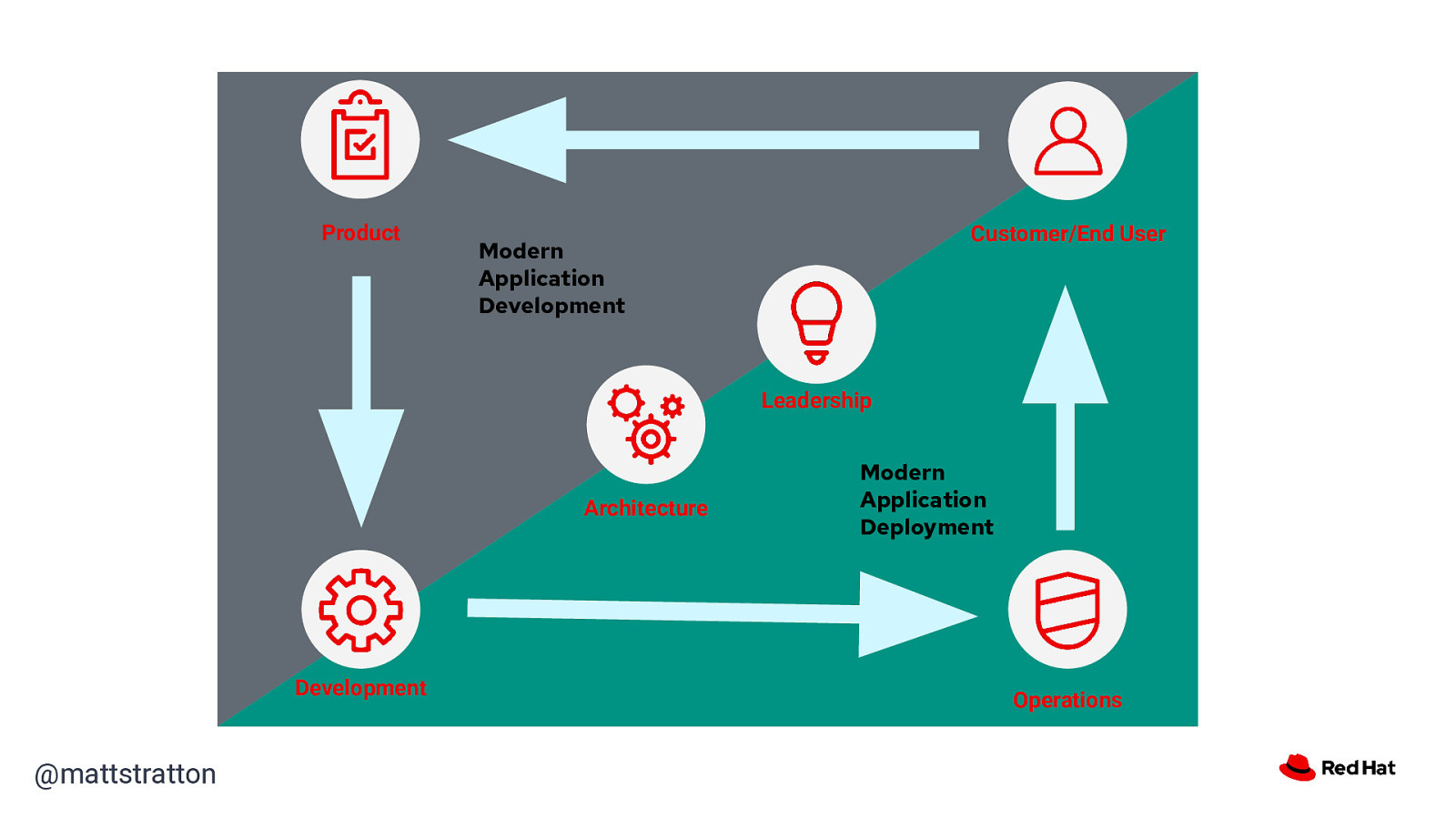
Product Customer/End User Modern Application Development Leadership Architecture Development @mattstratton Modern Application Deployment Operations
Slide 73
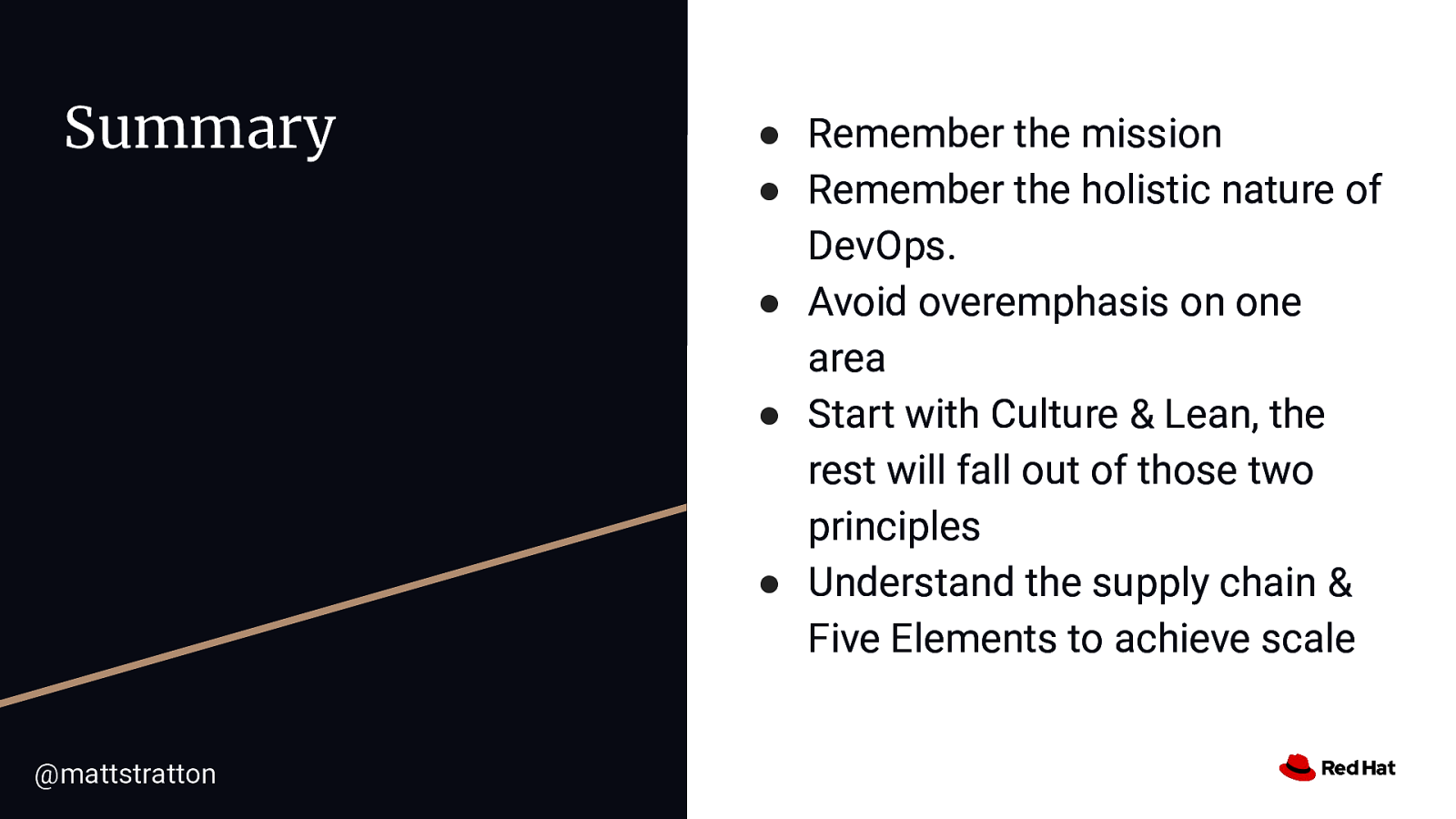
Summary @mattstratton ● Remember the mission ● Remember the holistic nature of DevOps. ● Avoid overemphasis on one area ● Start with Culture & Lean, the rest will fall out of those two principles ● Understand the supply chain & Five Elements to achieve scale
Slide 74
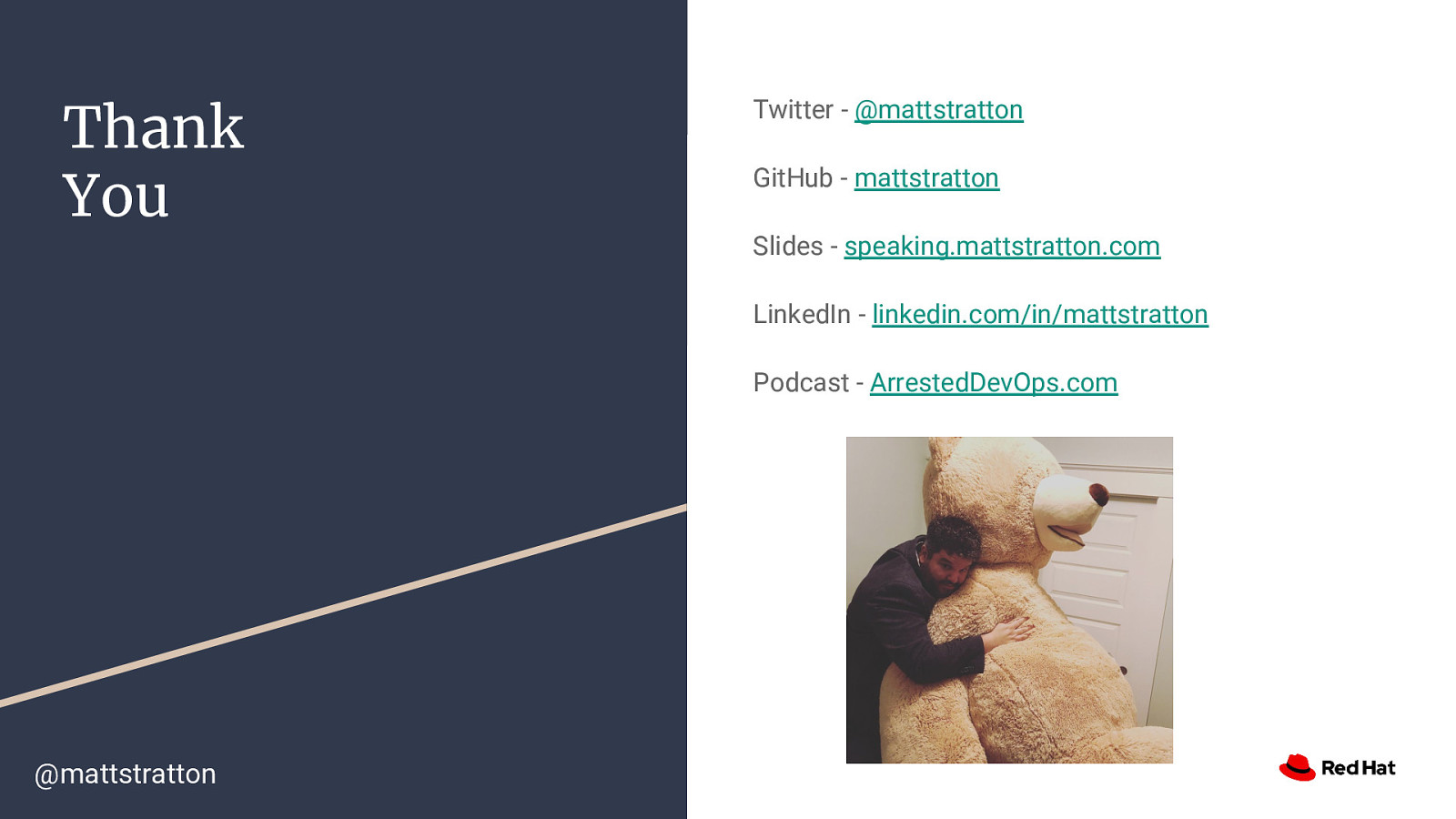
Thank You Twitter - @mattstratton GitHub - mattstratton Slides - speaking.mattstratton.com LinkedIn - linkedin.com/in/mattstratton Podcast - ArrestedDevOps.com @mattstratton